

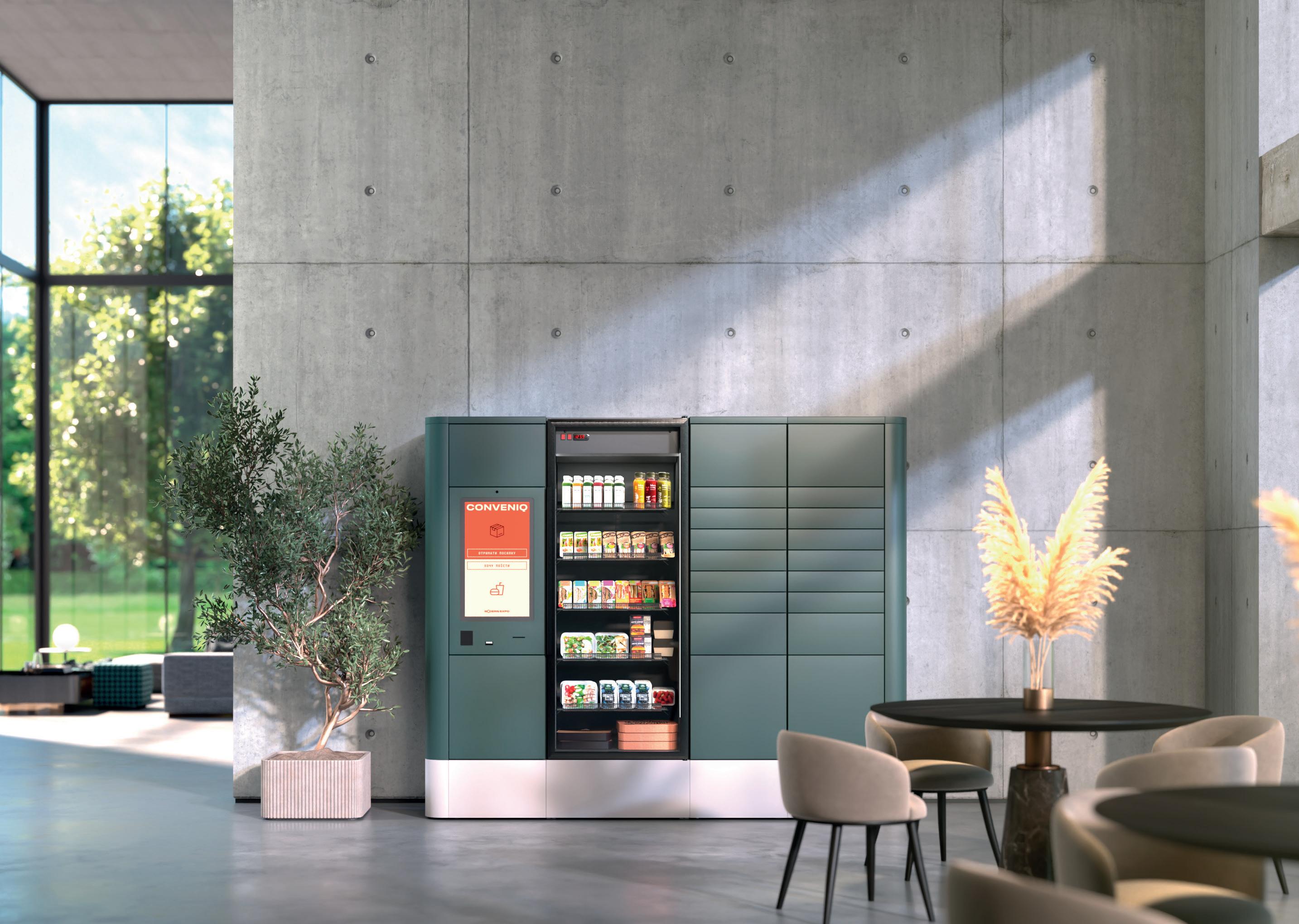

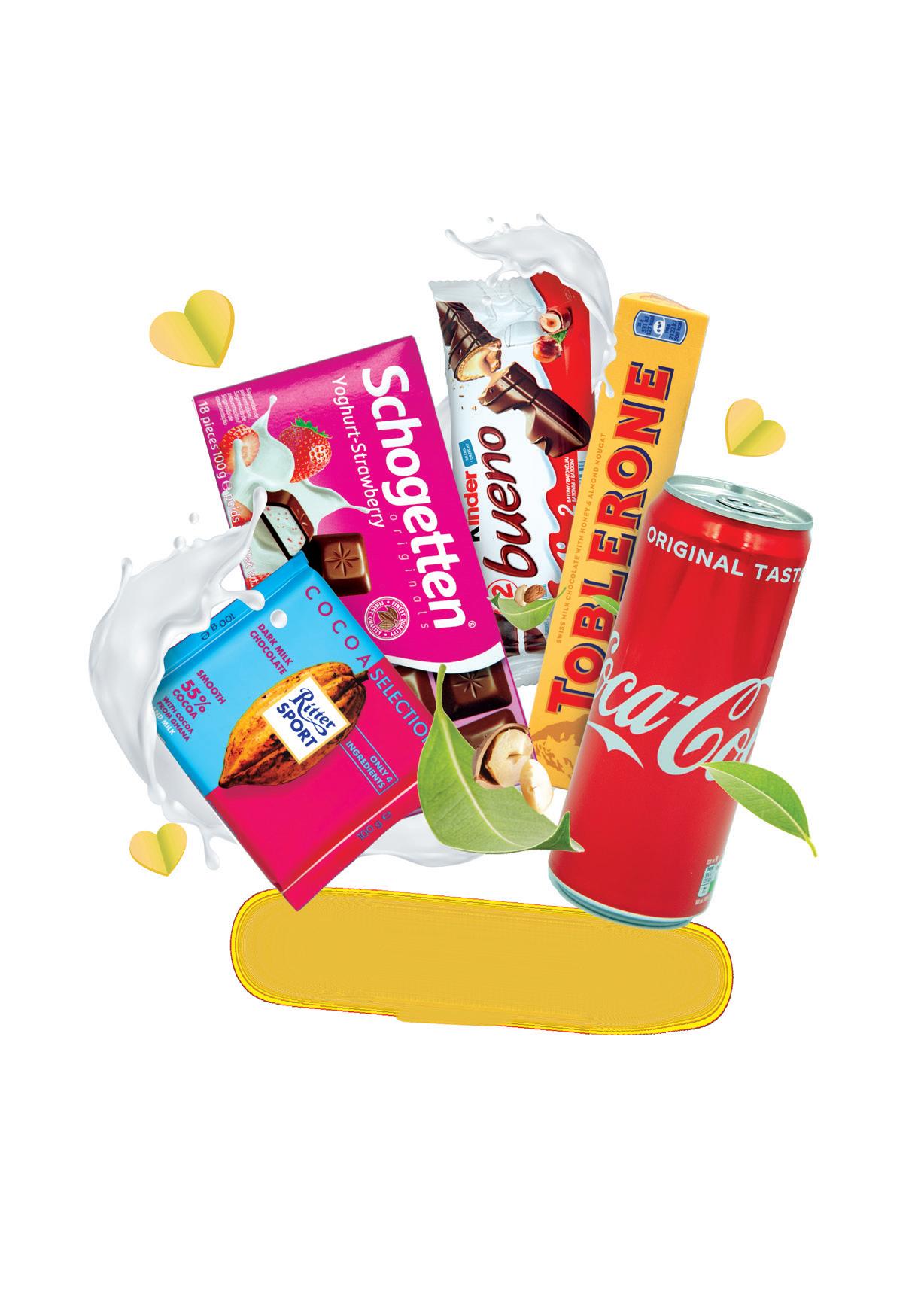

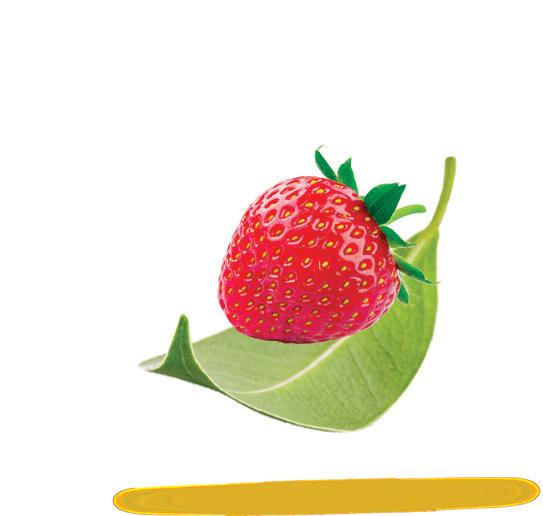















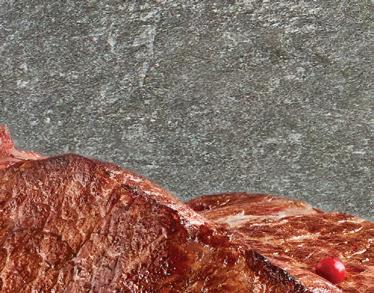


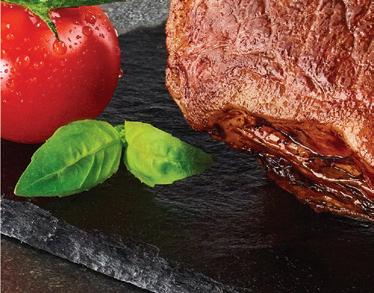





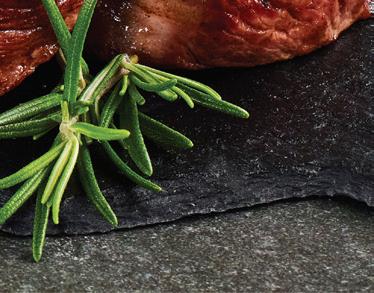








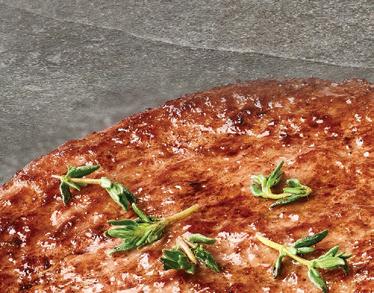
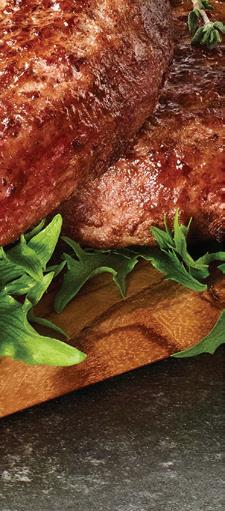


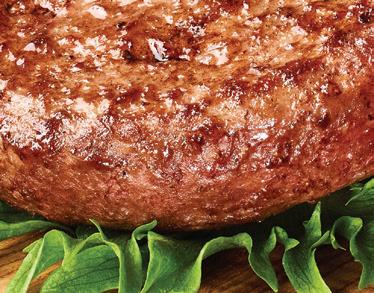



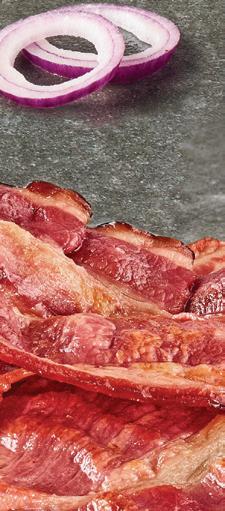

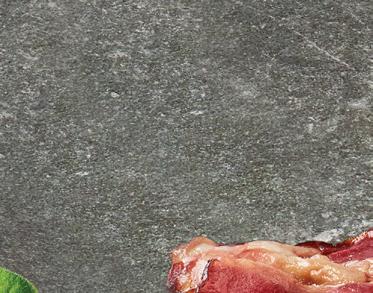





POLISH FLAVOURS, TRADITION AND QUALITY
Polish producers are well aware, that the quality of food products are playing a bigger role and are becoming the deciding factor for consumers. That is why they are constantly striving to improve the quality of the offered assortment. A great benefit is the combination of experience with old Polish recipes and tradition with modernity. Modernity helps in keeping an eye on the quality of the products at each step of production – from the raw material to the finished goods, tradition is the response to the trend manifested by the fashion for traditional products, old Polish.
The list of Polish producers, who can be proud of excellent production quality and a lengthy tradition of production is quite long, it would be difficult to name them all, or even just the most important. But, it is definitely worth cooperating with all Polish manufacturers present at the fair!
Welcome to the latest issue of ‘Food from Poland’ Magazine where you can read about Polish companies and the excellent traditional food products they make. Enjoy reading!
40 THE 2022 SUMMARY ON THE POLISH FMCG MARKET
TRADE FAIRS
68 Is it worth participating in fairs?
TECHNOLOGY
76 Artificial Intelligence in the FMCG sector – is it worth investing in?
INTERVIEWS
14 Małgorzata Cebelińska, Vice President of the Board at SM Mlekpol
18 Karol Pilaciński, Export Director at Bogutti
24 Jakub Kępka, Key Account Manager at Transad.
38 Dr. Adam Mokrysz, the President of the Mokate Group and Dr. Katarzyna Mokrysz, CEO
66 Olgar Suner, Deputy General Manager at Turka
70 Grzegorz Grabowski Managing Director at Toruńskie Wódki Gatunkowe
74 Bogdan Łukasik, CEO at Modern Expo
90 LIST OF POLISH COMPANIES
97 DISCOVER POLISH PRODUCTS
Editor-In-Chief Tomasz Pańczyk t.panczyk@foodfrompoland.pl
Managing Editor Monika Górka m.gorka@foodfrompoland.pl
Advertisement Office Phone: +48 22 847 93 67
Sales & Marketing Departmet Katarzyna Paciorek k.paciorek@foodfrompoland.pl
Graphics studio
Printing house: ArtDruk Kobyłka www.artdruk.com
Editorial Office Bagno Street 2/218 00-112 Warsaw, Poland Phone: +48 22 828 93 66 redakcja@foodfrompoland.pl www.foodfrompoland.pl
Fischer Trading Group Ltd.
CEO: Tomasz Pańczyk t.panczyk@ftgroup.pl

MARKET INSIGHT 9 Increase in the value of Polish food exports in 2022 48 Promotion of Polish products on international markets 58 The energy crisis directly affects the functioning of the trade sector 64 Trade franchise just for the modern times FOOD SECTOR 22 30 Years With The Best. For The Best. 32 Polish People Love Sweets 52 Tradition with a pinch of the modern 80 RFID is the technological drive for trade in this decade 82 POLL: Polish people do not believe in a falling food prices scenario 87 Polish trade affected by war
Reliable partner in logistics
30 Predictions for confectionery market 84 Glovo predicts the trends for 2023
Social commerce – a trend that increasingly drives Polish companies
Tomasz Pańczyk, Editor-in-chef Food from Poland Magazine
LOGISTICS 26
TRENDS
86
Paweł Pańczyk
8 #editorial Spring 2023 CONTENTS
Increase in the value of Polish food exports in 2022
 Marcin Wroński Deputy Director-General of the National Support Centre for Agriculture
Marcin Wroński Deputy Director-General of the National Support Centre for Agriculture
What significantly contributed to the increase in export value was the exchange rate of the Polish zloty against the euro which was favourable for exporters and supported the competitive prices of Polish agri-food products on the international market. What also had an effect on revenue on international sales by Polish exporters were high transaction prices of food internationally, resulting i.a. from the economic consequences of the military conflict in Ukraine.
The good results achieved in the export of agri-food products testify to the growing efforts of domestic entrepreneurs towards diversifying business relations on third-country markets and improving the quality of the products on offer. With product offerings adapted by Polish entrepreneurs to the varied
preferences of foreign consumers, a demand for Polish products on the international market is maintained.
The increase in revenue on international sales in the ten months of 2022, as well as the greater growth dynamics compared to 2021, confirm that Polish entrepreneurs operating in the agri-food industry are faring well on the international market. The export of agrifood products allows managing excess food produced in Poland, as well as is a significant source of revenue for the Polish agri-food industry, and has a positive effect on the country’s economy.
At the same time, the value of agri-food products imported was EUR 26.2bn (PLN 122 bn), and was 29.6% higher year over year. The positive trade balance amounts to EUR
13.0bn (PLN 61bn), 23.0% higher than in the period from January to October 2021.
Export of agri-food products from Poland by territory
As in previous years, agri-food products were exported from Poland largely to the market of the European Union. From January to October 2022, deliveries to EU-27 states generated over EUR 29bn (an increase of 30%), making up over 74% of total revenues on export of agri-food products from Poland.
Poland mostly sold the following to the EU Member States: poultrymeat (EUR 2.7bn), cigarettes (EUR 2.4bn), milk products (EUR 2.2bn), beef (EUR 1.5bn), breads and bakery products (EUR 1.5bn), petfood (EUR 1.3bn), and chocolate products (EUR 1.3bn).
In the period from January to October 2022, the sales of Polish agri-food products abroad reached a record-breaking value of EUR 39.2bn (PLN 183bn), 27.3% higher year over year.
Source: Elaboration of the Analysis and Strategy Office, the National Support Centre for Agriculture, based on the figures of the Polish Ministry of Finance; 2022 – preliminary figures. The balance is calculated based on the figures to several decimal places. 20,2 26,2 0,8 1,7 2,1 2,0 39,2 22,7 25,0 21,3 20,0 19,3 17,3 16,1 15,1 14,3 13,6 12,6 10,9 10,3 9,3 8,1 6,4 5,4 4,4 7,1 8,5 10,1 11,7 11,5 13,5 15,2 17,9 20,4 21,9 24,3 23,9 27,8 29,7 31,8 34,3 37,6 30,8 5,2 2004 0 10 20 30 40 export import balance 2009 2014 2005 2010 2015 2006 2011 2016 2007 2012 2017 2019 I-X 2021 I-X 2022 2008 2013 2018 2020 2021 1,4 2,2 2,6 2,6 4,3 6,1 6,7 7,8 7,0 8,5 9,7 10,5 11,6 12,6 13,0 10,6 bln EUR 9 #marketinsight
Polish international trade in agri-food products
Export of agri-food products from Poland by month
Polish agri-food export to the EU market is considerably concentrated geographically. Poland’s main trade partner is Germany. From January to October 2022, the value of exports to that country amounted to EUR 9.7bn, 26% higher than the year before. Exports to Germany mostly included cigarettes, poultrymeat, fish preparations, petfood, breads and bakery products, chocolate, and chocolate products. Other important recipients of Polish agri-food products also included the Netherlands (EUR 2.6bn, a 43% increase; export of mostly poultrymeat, cigarettes, grains of maize, beef, chocolate, chocolate products, as well as fruit and vegetable juices), France (EUR 2.4bn, a 34% increase; export of mostly poultrymeat, meat preparations, beef, chocolate and chocolate products, breads and bakery products, and petfood), Italy (EUR 1.9bn, a 20% increase; mostly cigarettes, beef, fish preparations, as well as cheese and quark, making up close to 50% of the export value), and the Czech Republic (EUR 1.8bn, an increase of 34%; export of mostly poultrymeat, breads and bakery products, as well as cheese and quark).
In total, export to the markets of the aforementioned five countries (Germany, the Netherlands, France, Italy and the Czech Republic) generated around EUR 18.4bn, which in value is over 63% of exports to EU-27 countries.
Poland exported over EUR 10.1bn worth of agri-food products to non-EU
Polish international trade in agri-food products from January to October 2022
Polish agri-food export by territory from January to October 2022
Source: Elaboration of the Analysis and Strategy Office, the National Support Centre for Agriculture, based on the figures of the Polish Ministry of Finance; 2022 – preliminary figures.
0 2,6 2,8 3,4 2,9 2,9 3,1 3,0 3,2 3,4 3,4 3,1 3,3 4,1 3,7 3,9 4,0 4,1 4,3 4,3 4,4 2,9 3,6 2,8 3,3 2,7 2,8 3,2 2,6 2,6 2,7 2,8 2,7 3,1 3,2 I II III IV V VI VII VIII IX X XI XII 2020 2021 2022 1.0 2.0 3.0 4.0 5.0 bln EUR
Source: Elaboration of the Analysis and Strategy Office, the National Support Centre for Agriculture, based on the preliminary figures of the Polish Ministry of Finance.
EUR 39,2 bn (PLN 183 bn) EUR 26,2 bn (PLN 122 bn) EUR 13,0 bn (PLN 61 bn) +27,3% +29,6% +23,0% export import balance France 6% Netherlands 7% Other countries 13% 39,2 bln EUR 29,0 bln EUR Saudi Arabia 1% USA 2% Ukraine 2% Great Britain 8% Italy 5% Czech Republic 4% Spain 3% Romania 2% Belgium 3% Hungary 3% Slovakia 2% Denmark 2% Lithuania 2% Sweden 2% Other EU countries 8% Germany 25% EU-27 74% 10 #marketinsight
Source: Elaboration of
the Analysis and Strategy Office, the National Support Centre for Agriculture, based on the preliminary figures of the Polish Ministry of Finance. The balance is calculated based on the figures to several decimal places.
Polish export of agri-food products by goods from January to October 2022
Others
EUR
Meat, meat preparations and livestock
EUR 8,0bn (+39%)
Alcohol
EUR 0,6bn (+16%)
Fruit and vegetable juices
EUR 0,7bn (+25%)
Tea, coffee, cocoa
EUR 0,9bn (+26%)
Oilseeds, vegetable fats
EUR 1,3bn (+77%)
Office,
Source:
Fruits and preparations
EUR 1,5bn (+8%)
states from January to October 2022, which is 20% more than in the comparable period in 2021. Poland’s exports to non-EU states included most of all: milk products (EUR 858mn), poultrymeat (EUR 806mn), wheat (EUR 648mn), chocolate products (EUR 605mn), breads and bakery products (EUR 590mn), and cigarettes (EUR 516mn).
Important non-EU recipients of Polish agri-food products, like in previous years, were largely the United Kingdom (EUR 3.0bn in revenue, a 26% increase in value; export of mostly poultrymeat, meat preparations, chocolate and chocolate products as well as breads and bakery products), Ukraine (EUR 786mn, a 20% increase; export of mostly cheese and quark, petfood, coffee, water, pigmeat, as well as chocolate and chocolate products), the United States (EUR 638mn, a 29% increase; export of mostly chocolate and chocolate products, pigmeat, fish and fish preparations, as well as meat preparations) and Saudi Arabia (EUR 435mn, an 8% decrease; export of mostly cigarettes, wheat, as well as breads and bakery products), and further down the line –Israel (EUR 334mn, a 43% increase; export of mostly beef, sugar and wheat), Norway (EUR 248mn, a 14% increase; export of mostly cigarettes, grains of maize, petfood and fruit preparations), as well as Algeria (EUR 219mn, a 42% decrease; export of mostly condensed milk and milk powder–65% in value, and tobacco – 27%).
Vegetables and preparations
EUR 1,9bn (+21%)
Fish and preparations
EUR 2,2bn (+13%)
Export of agri-food products from Poland by goods
In the breakdown by goods, meat and meat preparations dominated the Polish export of agri-food products. From January to October 2022, the revenue on the international sales of this product group rose by 39% compared to the previous year, amounting to EUR 8.0bn, constituting 20% of the total value of Polish agri-food product exports. The largest share in the value of exported meat and meat products was in poultrymeat (44% – EUR 3.5bn), meat preparations (23% – EUR 1.8bn), beef (22% – EUR 1.7bn) and pigmeat (8% – EUR 677mn). Export of livestock and other kinds of meat was relatively small in value, making up 2% and 1% respectively of the revenue on the export of meat products from Poland.
The second-highest item in value, with a 14% interest in export of agri-food products from Poland, was cereal grains and preparations, the total sales of which grew by 40% compared to the analogous period in 2021, to EUR 5.4bn.
Revenue on the export of cereal grains was EUR 2.5bn. 7.3mn tonnes of cereal grains exported were made up by maize in 41% (3.0mn tonnes, export volume increase by 92%), wheat in 41% (3.0mn tonnes, a 6% decrease), rye in 5% (381k tonnes, a 62% decrease) and barley in 4% (287k tonnes, a 31% decrease).
Cereal grains and preparations
EUR 5,4bn (+40%)
Tobacco and tobacco products
EUR 3,6bn (+5%)
Milk products
EUR 3,1bn (+42%)
Sugar and confectionery
EUR 2,6bn (+15%)
Exporters placed grains mostly on the Union market (5.2mn tonnes, 71% of exported grain). From January to October 2022, grains of maize were exported mostly to Germany (1.4mn tonnes, 48% of exports of the said grain), the Netherlands (498k tonnes, 17%) and the United Kingdom (243k tonnes, 8%). Largest recipients of wheat were primarily Germany (959k tonnes, 32% of exports of the said grain), Nigeria (353k tonnes, 12%) and South Africa (253k tonnes, 8%). The main destination for rye from Poland was Germany (330k tonnes, 87% of exports of the said grain), whereas for barley – Germany (189k tonnes, 66% of exports of the said grain), the Netherlands (35k tonnes, 12%) and Algeria (31k tonnes, 11%).
Increase in the value of export was observed practically in all agri-food product groups, i.e., tobacco and tobacco products (5%, up to EUR 3.6bn), milk products (42%, up to EUR 3.1bn), sugar and confectionery (15%, up to EUR 2.6bn), fish and preparations (13%, up to EUR 2.2bn), as well as vegetables and preparations (21%, up to EUR 1.9bn), and fruit and preparations (8%, up to EUR 1.5bn). There was also a rise in the value of exported oilseeds and vegetable fats – by 77% (EUR 1.3bn), tea, coffee and cocoa – by 26% (EUR 0.9bn), fruit and vegetable juice – by 25% (EUR 0.7bn), as well as alcohol – by 16% (EUR 0.6bn).
Elaboration of the Analysis and Strategy
the National Support Centre for Agriculture, based on the preliminary figures of the Polish Ministry of Finance.
7,4bn 20% 18% 14% 5% 6% 7% 8% 9% 2%2%2%3% 4% 39,2 bln EUR 11 #marketinsight
milk and ricegrain Sweet teddy bear


















2023 will be a difficult year, for the dairy industry as well. How do you intend to face it?
The past year has brought negative phenomena that we will probably face in the coming years. High inflation, which has affected the whole world, portends many difficulties – also in the dairy industry. Mlekpol’s strength is multi-directional production, capable of being dynamically adapted to the needs of the market and the customer. We believe this flexibility will allow the Cooperative to survive the hardest times. If the situation improves and the market returns to the dynamics we have known, there are chances that the dairy industry will not suffer and dairy producers will still be interested in development of their farms.
In 2022, SM Mlekpol continued the previously launched investments, including pro-ecological ones. How important does the Cooperative find this aspect of development?
Systematic investment ensures Mlekpol’s development and efficient operation. The investments mainly relate to the implementation of milk processing technologies. They give, apart from innovative products and technical solutions, environmental benefits, very important to the Cooperative. Technical infrastructure and modern machinery are also pro-ecological investments that enable improvement of work efficiency and lower energy consumption. Individual plants modernize their sewage treatment units and implement cogeneration systems. Our business partners also appreciate our measures aimed at using environmentally friendly product packages compliant with the ideas of sustainable development.
Mlekpol’s Multidirectional Dairy Production
Does innovation go hand in hand with ecology?
It should. These are the consumer expectations and the changing consumption patterns. First of all, ecological innovation has a positive impact on the endangered natural environment, increases the competitive advantage on the market, but also it also reduces production costs (an extremely important role of state governments). This is not just about production technologies but entire technological systems, production processes, products, operation, equipment, as well as organizational and management procedures. In this aspect, of course, the knowledge and skills of employees involved in the production process, as well as development of the product quality policy, are necessary. Eco-innovation is obviously an additional cost for Mlekpol, yet there is no turning back from this direction.
People are the strength of every company – please tell us more about the “heart” of the company, important relations, and the consumers themselves.
We take care of people, naturally – this is obvious, as we have been doing itfor more than 40 years. Meeting the trends and needs, we provide consumers with high-quality milk products originating from the cleanest regions of Poland. We care about the surrounding environment and animal welfare. The heart of the company is created primarily by the people who are its greatest capital, strength and future. The Cooperative associates nearly 8,500 farmers and 2,800 people employed at 13 plants throughout Poland. Their knowledge of milk production is drawn mainly from their own experience – as they come from regions where the beautiful tradition of dairy farming are passed from generation to generation. We believe in the strength of tradition

14 #interview
Małgorzata Cebelińska, Vice President of the Board at SM Mlekpol talks on dairy sector in Poland, company’s investments, innovative products, portfolio development over last years, export offer and global trends.
and values, because whatever Mlekpol does, it does with people, for people and with people in mind.
Quality, tradition and… – what is the third crucial factor defining the cooperative itself and its offer?
Openness – to the needs of the customer, the market, and the foreign partners. This also means watching the consumer trends and keeping up with them, which results in innovative implementation of the dairy products. In cooperation with the Institute of Dairy Industry Innovation in Mrągowo, SM Mlekpol develops ideas and adapts its portfolio to the consumer and market requirements. The range of Mlekpol’s products already includes about 500 items characterized by high quality, a simple, clean composition, an excellent taste. They are under various brands in Poland and abroad.
How will the SM Mlekpol’s portfolio develop in the near future? Consumer behaviour has changed a little, will it affect your offer?
Mlekpol’s product offer is always adapted to the changing market situation. Therefore, we expect increased interest in drinking products, desserts, fermented beverages, as well as other products with high nutritional value and protein concentration. However, taking into account the pessimism connected with the economic situation, we have also introduced cheese in large, economic packages. Thus, we will satisfy the needs of those who have recently experienced substantial worsening of their financial standing.
What does the export offer look like? What do foreign consumers appreciate Mlekpol products for?
The export offer of SM Mlekpol is, mostly, products with longer shelf life, such as UHT milk, flavoured milk, and creams, as well as butter, cheese, and a wide range of powdered products that we have been able to expand upon construction of a modern powder plant in Mrągowo.
Foreign consumers value Mlekpol products mainly for their high quality, repeatability, and Polish origin. Through participation in foreign fairs in different parts of the world and talks with current and potential partners from abroad, we can learn their particular needs and preferences. Then we can adapt our offer to the requirements of individual countries, and develop new product categories. Our partners know and appreciate the production flexibility of Mlekpol, i.e. the constant availability of large product batches, as well as timely fulfilment of orders. Such cooperation is possible thanks to our own, stable raw material base and the production capability in 13 modern plants.
Your products reach almost 100 countries worldwide. Which markets are the most promising? How do consumer requirements differ between countries?
The most promising markets are those with insufficient milk production, forced to rely on import to satisfy their consumption needs. These include South-East Asian, African, and Middle Eastern countries. Other markets, equally important to Mlekpol, are China, South Korea, Mexico, Chile, the Dominican Republic, as well as Moldova and Serbia. Consumer needs differ between continents and regions. In developing countries, consumers replace cheaper prod-
ucts – such as rice or beans – with protein-rich goods like milk, cheese, and fermented products. Poorer countries focus on purchase of essential dairy products – e.g. liquid or powdered milk. On the other hand, countries with a high level of economic development show a definitely higher interest in premium products, including long-ripened cheese, butter, and high-protein powdered products for supplementation, such as WPC 85.
What are the current global trends in the dairy industry?
Nutrition trends worldwide are shaped by young people. Within the next five years, the market will increasingly appeal to niche identity needs of loyal customers/investors. A new era of social pressure will begin, as consumers will be increasingly concerned with the ethics of dairy brands, including animal welfare. New generations also want to be in the spotlight, and dairy producers can help them. Besides, we cannot ignore the digital innovations and ways of communication with customer. Over the next 24 months, we can expect that the change in conditions will change consumer habits and lifestyles, such as consumption of smaller amounts of food, buying products with shelf life that will soon expire, or choosing goods in simple packages – not so pretty but of local origin and at lower prices. Consumers will try to reduce food waste and pay much attention to product reuse and recycling. As for older generations, buyers will put much emphasis on health issues, yet innovative food products will also remain important to them. It is, among others, the result of their kitchen creativity and openness to diverse tastes, also from other regions of the world. Buying dairy products will become a way to protect the environment and mental wellbeing, giving the consumers a sense that, by eating dairy products, they are doing something good for their community.
The export hits of SM MLEKPOL are…
Mlekpol’s export hits are UHT milk, powdered products, cheeses, butter, flavoured milk and creams. In view of deep-sea transport and the importers’ distribution capabilities, Mlekpol focuses primarily on products with long shelf life. Globally, the best-known product is Łaciate UHT milk in an environmentally friendly one-litre package. Furthermore, the Cooperative has created such international brands as Milcasa and Happy Barn, which are already well known to consumers in different countries. High-quality raw material and innovative packaging technology ensure that the milk retains its freshness and taste for a long time, without losing its nutritional value. In the cheese category, bestsellers are semi-hard cheeses, including Gouda, Edam, and Maasdamm in blocks, as well as in slices and portions. Mlekpol’s Mozzarella perfectly fits in with the preferences of foreign consumers, including the 2 kg grated version – for the purposes of the catering business. The category of spreads is dominated by Łaciate butter, processed cheeses, as well as Łaciate cream cheeses. For many years, Mlekpol has also exported powdered products, such as milk, whey, buttermilk, and, recently, specialized products, like concentrated whey proteins, e.g. WPC 80 and 85. Specialization of production and modern technologies implemented in production plants ensure more flexibility and possibility of manufacturing dairy products specially customers’ needs. Mlekpol is open to every cooperation and willingly takes on new challenges.
Thank you for the interview.
15 #interview


What export results may Bogutti boast? Is the pandemic-related slowdown of growth returning to its previous pace?
The main goal of the founders of Bogutti was international development. In the first period of our operations, sales focused on European markets, mainly Italy, the UK, and Germany. Several years ago, the company decided to start its expansion to non-European markets. Ever since, we have managed to reach more than 20 new markets, from South America to Africa to Asia. The diversification of direction of sales helped the company pass smoothly through the pandemic period. After a time, when the whole world had made a decision to introduce lockdowns, the customers returned to standard functioning. This allowed the company to manufacture without downtimes and to avoid the adverse effects of the pandemic.
International development
The growth of prices of raw materials, packaging, energy, gas, or costs of transport, directly affect the manufacturing cost of products –how do you take on the challenges that manufacturers currently face?
Over the last year, we have seen an unprecedented growth of production costs. The coincidence of such events as COVID, the Russian aggression in Ukraine, maritime transport difficulties, or high inflation, put the manufacturers under an immense cost pressure. On the one hand, the company was pressured by suppliers, and on the other hand, enormous resistance occurred on the part of customers. For a long time, traders would not admit to the thought it was necessary to introduce price adjustment. Starting this process was the most difficult thing. One had to change the customers’ perception. At a moment when the subject of price adjustment reached global proportions, the talks became easier. Tolerance for such measures increased.
Simultaneously, with the process of increases, our company has taken a range of actions aimed at optimizing purchases and production. We have eliminated unnecessary costs connected e.g. with the kind of packages used or the manner of production organization, in order to limit the scale of increases.
Please tell us more about the export offer. What makes the Bogutti products stand out against their competitors on the global market? What do foreign consumers appreciate your sweets for?
As I have said, international development of sales is the driving force behind the company. The production started from typically Italian cookies with delicious creams and from the traditional Polish fudge. We would like Bogutti products to be appreciated for their high quality, taste, and attractive price level.


18 #interview
An interview with Karol Pilaciński, Export Director at Bogutti on export directions, market challanges, innovations, company’s offer and development plans.
How do you adapt your offer to consumer requirements worldwide?
Bogutti has been active on the market for 10 years and we have strived all the time to develop and to introduce new solutions. We do not close within the limits of the existing offer. One of our development methods is focus on ideas submitted by our contractors. We always treat such a submission as a challenge to improve our offer.
Are innovations implemented in the offer? What does a foreign consumer expect and do those expectations differ between markets?
According to the adage that standing still means falling behind, we have constantly searched for new solutions, new recipes, new packages. Manufacturers try to surprise customers with new products. Consumers are bombarded from all sides with different offers, new trends and ideas. Thus, we develop sugar-free product lines or those free of palm oil.
Acting globally, we face different customer expectations on an everyday basis, concerning the recipes used, packaging standards, quality issues, or the price policy in the given area.
Which foreign markets are the most strategic to you and why? Will you appear on new markets?
The company’s history is connected with the European mar ket which still remains a strategic area of our operation. For five years, the company has strongly focused on development of sales on other continents. It is worth mentioning Middle Eastern countries where the traditional Polish milk fudge reigns invariably. For many years, the demand has been maintained on a very high level.

We strive to constantly expand the scope of our distribution. Recently, we have visited several industry fairs in Asia, resulting in new contracts. Especially in East Asia, we observe growing interest in Bogutti products and we will surely plan appropriate measures to increase the company’s presence on this market.
What new will appear in Bogutti’s portfolio in the near future?
All the time, we observe the changes occurring on the market and we listen to customer suggestions, which allows us to successfully develop our offer. We have recently focused on sugar-free cookies, since there is a global trend for such products. We have introduced doypack as a new packaging type for our cookies. The string package preserves the cookie’s freshness and enables longer storage. This is particularly important on Asian markets where high humidity and temperature do not favour open products. The next step will be expansion of the offer by single-packed cookies.



The development plans of the company for 2023 and the next years are…
The company has been developing dynamically for 10 years and each year brings something new. The next stage will be expansion of the production and storage areas. This investment will result in increased production and the company will expand its offer by new product categories. I hope we will be able to give more details in the several months to come.
Thank you for the interview.
19 #interview
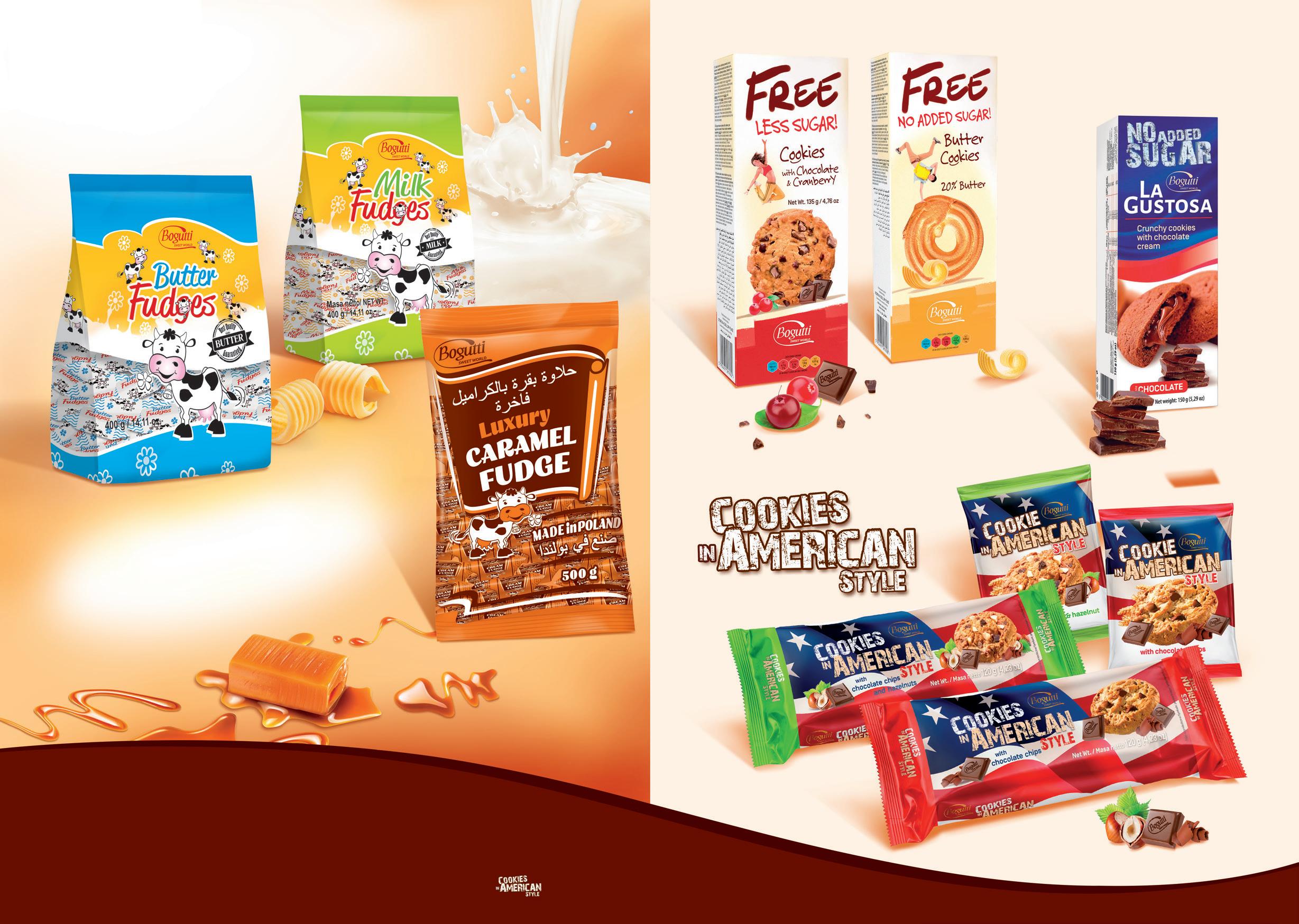



30 Years With The Best. For The Best.
5 Steps To Success In Global FMCG
The origin of the Brand Distribution Group dates back to 1992 and is rooted in Białystok, north-eastern Poland. The past decades have been for the small trading company an inspiring journey to an international distribution group active in 100 markets. The company has been redefining global trade standards every day for 30 years. Milena Galas, Commercial Director, and the managers of commercial and purchasing departments at Brand Distribution Group reveal the secrets of its success.
2 1
BRAND is All You Need
The Greatest Assets are People
The greatest success in business is achieved by companies that understand that people are the greatest asset. „Our goal is to support the ambitions and creativity of our employees, improve their competences and reward performance. We are not afraid of structural changes and we’re actively seeking new experts” explains Milena Galas, Commercial Director. Lots of employees have been with the company almost from the beginning, others started cooperation in 2022 and are creating a new chapter in the history of the Brand Distribution Group. “Last year’s biggest challenge was to put the commercial structures in order. We have created 3 operating regions responsible for different geographic areas. Thus, our teams can focus on specific markets and develop their competences and the knowledge about the particular countries’ needs”.

„To enter a market, you must understand the local culture and adapt your work style and the product offer” adds Laura Rizescu, Head of Export-South. „What matters in Asia is the speed of response – our Contractors work 24/7, they expect an instant response, attractive prices, and the fastest possible delivery. In Arab countries, merchants love long-lasting negotiations, Europe, on the other hand, demands a creative approach to orders – Contractors are looking not only for attractive prices but above all, for products that will make their offer stand out on the market. Therefore, our work requires not only commercial experience but also being curious about the world, and flexibility”.
The world abounds in companies specializing in FMCG distribution. How to ensure your company’s success? The secret is systematic review of the portfolio, careful monitoring of the markets and local trends. „Trading in recognizable brands is no longer a challenge. Consumers have diversified expectations and hunger for novelties. We regularly evaluate distribution brands – we verify the sales and market potential, price positioning and marketing strategy” – explains Milena Galas
“Last year showed that smaller manufacturers have become a serious competition for the renowned global brands. Due to the economic and political crisis in the east, the demand for cheaper products that still guarantee high quality is growing”, says Alena Cimoch, Head of Export-East. Asian and European markets differ in their specificities. „Asian markets are greatly attached to love brands – original, recognizable products. On the Iberian Peninsula and in French-speaking countries the importance of healthy foods, dietary supplements and products with organic certificates is growing”, lists Laura Rizescu
„There is a huge Muslim diaspora in France, Sweden and in the Balkans, which is why Halal certified products are in great demand. Meanwhile, in the Arab countries, there is a growing popularity of European ice cream, drinks and non-alcoholic beers. An interesting trend is also the growing popularity of the pet food category: premium foods and delicacies which can be used to spoil your pet” – explains Eliza Solecka-Boczkowska, Head of Export-West
The product portfolio is kept attractive for customers by purchasing department run by Urszula Susoł. „We are constantly looking for innovations around the world, we monitor prices of hundreds of suppliers and anticipate trends. Our regular offer includes only proven brands. We also create seasonal catalogs, develop the impulse and premium products offer and build individual offers based on our Contractors’ briefs”.
22
Milena Galas, Commercial Director, Brand Distribution Group
3
Get Ready for the Worst, Expect the Best
Over the past 30 years the markets have experienced many crises. Current crisis caused by the armed conflict in Ukraine is therefore not the first faced by Brand Distribution. „Immediate adaptation to the current situation is the trait our contractors value most. Already during the pandemic and the related challenges, such as broken supply chains, we supported our Clients in production, logistics and even marketing, delivering millions of necessary products from every part of the world” – says Milena Galas
Experience and flexibility of the experts from Brand Distribution have allowed to successfully rise up to all the challenges of the current situation in the East. „World economy is one integrated organism. You cannot eliminate one link without losses on the part of the others. Russia was the main source of supply for numerous eastern markets – our goal was to secure the needs of those countries”, explains Alena
Cimoch
Think Local, Act Global
Brand Distribution Group never forgets about its roots. „We are from Poland, and we proudly support Polish manufacturers in achieving global success”, declares Milena Galas.



Brand Distribution Group employees frequently repeat their favorite motto: „With us, anything is possible!” and there, probably, is the key to the company’s success. 4
Polish products are renowned for their excellent quality and attractive prices. „We don’t even need to advertise Polish sweets and household chemicals, their quality speaks for itself”, emphasizes Alena Cimoch. „Poland is a huge exporter of meat and agricultural products to Arab countries”, adds Eliza Solecka-Boczkowska. „There is a lot of interest in Polish vodka and beer - not only the leading brands but also craft products manufactured from the grain to the bottle”, says Maciej Małecki, Business Development Manager
The purchasing department forecast a further increase of the interest in Polish products around the world. „Last year was a breakthrough for us in terms of the sales of Polish products of smaller brands. Polish sweets, snacks and drinks have had excellent reviews abroad, which is why we are opening up to new categories: cosmetics, pet food, etc.”, says Urszula Susoł
„Can-do” attitude
Lack of readiness to make changes is one of the biggest problems faced by companies with many years of experience. Brand Distribution Group employees, though, are certainly in no risk of falling into a routine. „We are a team raising the bar higher every day. We improve processes, expand the portfolio and the range of the provided services. We open new branches, markets and channels, including e-commerce. 2023 is all about the quality – a trade marketing unit is being launched; product marketing has been transformed into trade marketing. We are also building a unit that will work directly with key account managers of retail chains at international level”, explains Milena Galas
Relations with customers and their satisfaction are of utmost importance for Brand Distribution Group. „Our goal is short lead time. We offer comprehensive services: work on a ready-made portfolio, search for special order products, customs clearance, logistics... Everything is on us!”, enumerates Eliza Solecka-Boczkowska. „Purchasing department effectuate custom orders, ones that even go beyond the FMCG products portfolio. We solve crises, organize complicated transports. We are open to any topic, even difficult categories such as frozen food or fresh products” says Urszula Susoł

In 2022, Brand Distribution Group has been licensed for spirits, which allowed for a new project managed by Maciej Małecki. „We are creating an autonomous business unit with our own marketing plan and commercial structures. We intend to build a strong portfolio of alcohols for large customers and the HoReCa sector. We carefully select products, partake in alcohol and bartending trade fairs, source interesting contacts with manufacturers of brands that are worth presenting to consumers”.
One of the services provided by the Brand Distribution Group is the consolidation of goods. „We build multi-category orders to relieve buyers and to reduce transport costs and the carbon footprint. Thus, we send a mixed container to the end of the world and secure the needs for all categories.” – explains Alena Cimoch
„We help organizations around the world to save time for things that matters. Our mission is pursued through comprehensive commercial, marketing and logistic solutions provided by a team of professionals. 2022 was a challenging year for the world, yet we closed it with a record-high financial result. This year, on the occasion of the company’s 30th anniversary, we are planning special campaigns and offers for current and new contractors. You will definitely hear about us in future!”, concludes Milena Galas.

5
Alena Cimoch, Head of Export-East
Eliza Solecka-Boczkowska, Head of Export-West
Laura Rizescu, Head of Export-South
Maciej Małecki, Business Development Manager Urszula Susoł, Purchasing Director
23 #foodsector
Logistic of the future in professional release
Logistic of the future – how has the logistics market changed over the recent years? What has become the priority in the services of this segment?
The logistics market is one of the most actively developing sectors of the economy. One can easily see new warehouses sprouting around the largest agglomerations. In view of opening up to new product searches, the demand for innovative logistics and transport solutions has increased. Currently, of great importance is flexibility in relation to customers – services provided on the highest level, as well as consulting in the area of proper storage, warehousing, and transportation. A major role is played here by partnership in relations between partners – highlighting potential problems which might be encountered, as well as presenting ways to solve them. Appropriate personnel, numerous training, experience amassed over the years, all become an invaluable source to overcome difficulties posed by the requirements of a market expecting professional and reliable service.
Innovativeness is a key area of operation on many markets, in logistics as well. What technologies and innovative solutions do you use?
We are able to find a solution for virtually every customer. It is not a problem for us to carry both frozen and fresh goods at the same time; whether it is 2 pallets of frozen fish or a whole truckload of fruit, we can deliver on time. Each time, we approach every order individually, adapting to the needs required by the contractor. An extensive fleet, storage facilities – it is mainly due to this that we can store,

repackage and reload goods as well, while preserving the cold chain all the time. Our employees take care to satisfy the customer to the full extent and also to make proper use of our fleet and capabilities, such as double-chamber refrigerators enabling simultaneous transportation of fresh and frozen goods, or double-floored refrigerators for transportation of increased batches of goods, e.g. 66 pallets. The only limit is our imagination.
What kind of services are your specialty? What makes your offer stand out?
The leitmotiv of our company is refrigerated transport – products that need to be carried under a controlled temperature; from foods to components to medical products. It is due to customers to whom we have been providing services for years that we are developing, expanding and improving our fleet every year. Currently, we own every semitrailer type available on the global market, as far as refrigerating equipment is concerned. Our fleet includes standard semitrailers, as well as double-floored ones, floral refrigerators, multi-chamber ones with partition walls to transport goods at different temperatures; some of them have lifts. Most of our units are semitrailers with room for 33/66 pallets, but we also have smaller ones, accommodating between 1 and 18 pallets, which allows us to distribute even to very hard-toreach places. Additionally, apart from our vehicle fleet, we have a cadre of perfectly trained personnel fully involved in customer assistance and consulting. They oversee the entire process of transportation from
24
Interview with Jakub Kępka – Key Account Manager at Transad.
point A to point B. This process is more than just pulling up to be loaded and reaching the unloading site; there is a whole range of relations to be fulfilled if the entire operation is to have a happy ending. Through commitment and passion, they prove their dedication to the company which is not just corporation but also the very friendly relations we have here. Everyone is involved in the works and development of the company, as evidenced by the expanding fleet and the new challenges posed by cooperating companies, which is proof of their confidence in us.
Is a logistics partner able to affect savings, or even increase profits, of manufacturers in the FMCG sector?
The term “logistics partner” may denote companies specializing in a given branch for many years – no company specializes in all branches of the sector of logistic services – which know all inner workings of the given area inside out. Learning, many times, from their own experiences and errors, they are able to nullify and prevent any future problems which might arise in cooperation with a new contractor and a long-time partner alike. Additionally, what matters is reliable and transparent cooperation, as well as explanation of cost-related details: what they result from and what consequences they entail.
Analysis of the given needs and expectations will minimize the risk of, first of all, failure, and secondly, potential losses due to inexperience and wrong decisions. There are tools allowing one to minimize the costs; it is a matter of finding them, implementing them and using them correctly, as well as conversations with experienced people willing to share their knowledge and expertise.
In view of the drastically growing prices or the unstable geopolitical situation, it is a challenge nowadays to maintain the continuity of business. How do you provide your contractors with a stable supply chain?
The lack of stability in the world, with regard to both prices and geopolitical problems, affects us all, and entrepreneurs indeed bear the brunt of it. However, this affects not just the logistics sector but all areas of the economy. First of all, the situation impacts the first link of the chain; an increase in transportation costs affects the increase of prices in the final effect. However, many conversations with our contractors allowed us to realize the problems we are all facing, hence full comprehension thereof and the will to cooperate further. Nowadays, as I have already mentioned, it is not only price that matters but flexibility, the will to cooperate, actions based on the “win to win” principle, consulting, availability, timeliness, as well as openness in solving problems and searching for solutions. Also with price increases, especially of fuel, our partners fully understand the lack of stability and our models of cooperation are elaborated in such a way as to avoid any disruptions to the supply chain at any moment.
How do you adapt your offer to the individual needs of contractors from different countries? Are you able to react to all variables? What stands out in your fleet ?
The answer is in the question – this is individual. It is the basis of action in the current times and situation, not just on the market of logistics services but mainly based on the best possible relations
with partners. We cooperate differently with each one of them, as each customer is different, with individual needs, requirements, standards, or norms. However, since we know our partners and constantly remain in touch with them, we can respond on an ongoing basis and monitor all variables appearing during the implementation of individual tasks, virtually in real time. As I have said before, we own every semitrailer type currently available on the market. We put much emphasis on proper servicing, appropriate equipment, regular maintenance, and systematic inspection of the correctness of operation of individual components. Of tremendous importance to us is the proper operation of our equipment, worth several hundred thousand euros and often used to transport goods exceeding its value; simultaneously, we are able to ensure the safety of the property entrusted to us and, above all, to the drivers. Additionally, our semitrailers are equipped with many more options of cargo securing than in other companies of a similar nature have. Our stock is no older than 3 years, we systematically replace it with newer equipment, allowing no shortcomings on our part. We use all innovative solutions available on the market, and we search for them ourselves, to strengthen our position even more, expand the offer, and increase our competitiveness.
How do the forwarding services you offer optimize the transport processes?
Above all, through using our own fleet, we know the real costs borne by transport companies, especially by forwarding ones. Based on our own example, we have experienced what most service-selling companies have only read about in industry magazines; we now have real costs we are able to document and present to our contractors. In addition to the numbers, immediately visible when the concept of optimization is concerned, one should not forget timeliness. Aware of the transported cargo, especially foods, we allow no delays. We adapt our cadre of drivers to perform the entire operation flawlessly. We know that the cargo loses quality with each delay, and thus the quality is reduced when it reaches the end recipient – and, in fact, we are such recipients too every day.
Our greatest benefit is customer satisfaction and orders for new transports, as well as new challenges being posed to us. This motivates us to act and develop even more dynamically.
What goals do you set for yourself for the years to come?
Development, development, development, and more development. Of course, as every entrepreneur, we have assumed a certain business plan we are implementing step by step. We are unable to foresee the geopolitical situation and the extent to which it would impact us, but we surely intend to significantly increase our vehicle fleet, to develop even more with regard to less-than-truckload transportation, as well as to expand the scope of storage services. We can see potential in each of these areas. Few companies are willing and able to develop in all of the mentioned areas, while we can see a future in them. We will surely be able to repeatedly prove our experience to the customers who work and will work with us.
Thank you for the interview.
25 #interview
Reliable partner in logistics
The TRANSAD company was established in 2006; ever since, we have met the requirements of our Customers to the greatest care and extent possible. With the experience we have gained over all those years in the TSL industry, we can say with full responsibility that we focus on quality and professionalism. For many years, we have worked for the effects that are now plain to see.
Currently, we are able to adapt to almost every Customer, offering top-quality services and an individual approach to needs and requirements.
We care for our fleet to be state-of-the-art all the time and to meet the highest standards. We complement and improve our team on an ongoing basis so they can always be fully flexible and self-contained in the fulfillment of the tasks they have been entrusted with. We can offer top-level cooling transport, adapting to individual requirements. Our offer includes specialist types of cooling semi-trailers, from standard ones to multi-temperature or double-floor semitrailers.
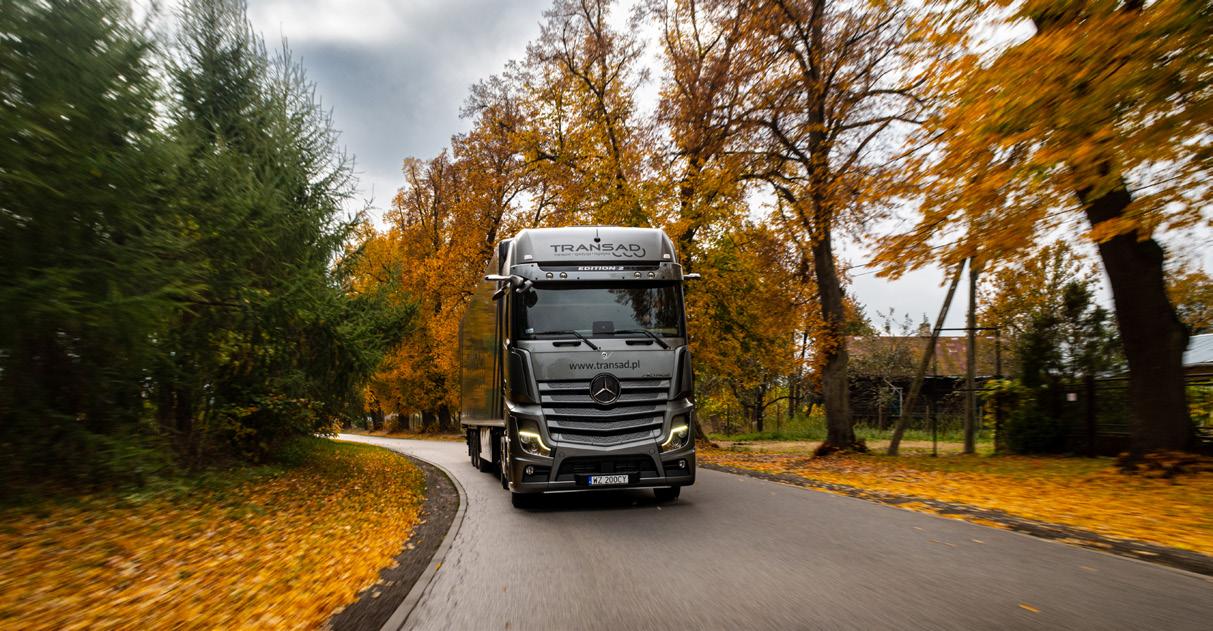
Since the inception of our operations, we have been setting new goals for ourselves, setting the bar higher and higher, to motivate ourselves for constant development and search
for new solutions. Closely watching the market and the realities set for us by our customers, we have started dynamic development of one of the transportation branches, namely, groupage transport. There are just a handful of companies which take on the challenge of organizing such special kinds of shipments, especially as far as part of the load at a controlled temperature are concerned.
Facing the prospects of a new challenge, we have decided to improve the tools we have been working with so far. At a very quick rate, we have adapted storage areas for handling and confectioning of products, with simultaneous continued preservation of the cold chain that will in no way affect the product quality. Watching the world, our competitors, and the experience of our employees, we have balanced the entire system to adapt and select the best
options to fully satisfy the expectations of our customers. A modern warehouse furnished with ramps, insulated sleeves, specialist loading equipment for all kinds of goods, as well as different forms of cargo protection – from standard locking rods to anti-slip mats to heatshrink films, edge protectors, protective liners. Each time when a new way to secure transported materials appears, we strive to test it with our own fleet in order to introduce it into a wider circulation and to propose additional solutions to our customers.
Although we set the bars high for ourselves with regard to development, our contractors motivate us additionally, by searching for solutions together and with their trust in a company providing the highest value available on the market. We never shy away from problems or challenges; quite the opposite, we always
26 #logistics
strive to seek solutions together. Conducting a “win-win” corporate policy from the very beginning, we have never been oriented exclusively to our own good or the satisfaction of our needs. It is worth bending your everyday principles in order to work for the sake of common satisfaction. With our search for solutions, we broaden our knowledge and experience, to share with our customers and to be even more competitive.
Today, it is not hard to buy a car, to hire a driver, to take up an order and to drive ahead; yet there are few “ambitious” companies, setting themselves new challenges and willing to continue their development. In our small employee team, there is surely no lack of commitment or desire for development, both personal and of the entire company. We are aware that we act for the sake of a common future. Both in contact with customers and between each other, we focus on friendly, almost family-like relations. Time spent together, not only within the limits of professional contact, helps us strengthen the ties, consolidate the attachment, stability and conviction, and boost the confidence that nothing is impossible and the sky is the limit.
We do not give in to principles prevailing at corporations where every person becomes a robot, ceasing to be a human being, empathic and helpful. With our openness, devotion and intentions, we largely focus on relations. The relations with our customers have been developed for years; at some point, the business vs. business limits blur and we transcend to the level of friends, which helps us deepen the mutual trust. When we are able to count
on each other in every situation, the customer is certain we will always provide advice and a common solution to a problem. We also often participate in problems as consultants, even if we have not been involved in any of the logistic components. Such joint action strengthens the ties even tighter and allows us to spread our wings.

We can boast a list of customers who have cooperated with us for many years, have never been disappointed with us and wish to continue the cooperation, involving us in new projects and recommending our services to their own contractors. We are surely open to new experiences and further development in the transport and logistic industry.


27 #logistics
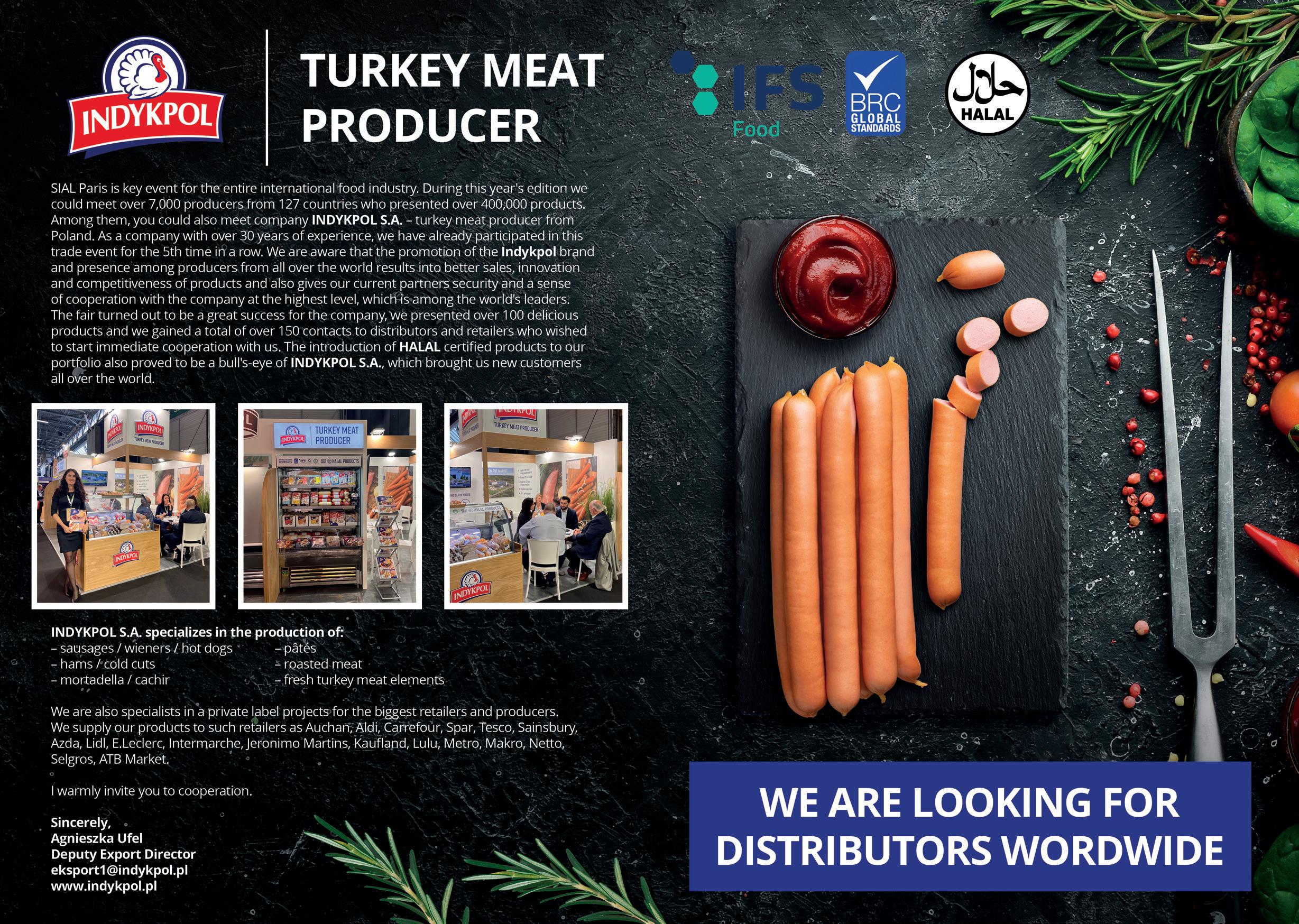

Predictions for confectionery market
The economic situation on the international trade and the food sector.
So far, worldwide reports and predictions have presented the growth of the confectionery category in global terms. Today, we know this is probably a growth in terms of value. One should be prepared for a possibility of reduced consumption in the confectionery category, due to the limited consumer incomes in 2023.

 Tetiana Gurnevych, International Sales Director
Tetiana Gurnevych, International Sales Director

Nowadays, making a choice from the rich assortment available on the shelves, a consumer will approach the purchase more consciously. The composition will be the key factor when comparing products on the shelf. For many years, Wawel elaborated the “Good Ingredients” strategy which allows for building of competitive advantage and responds to consumer expectations, all of this with a simple
and brief composition of the product. Wawel confectionery contains no artificial flavours, preservatives, or colourings. Our Cream Fudge may serve as an example, with only 6 months of shelf life and a composition made up by just 4 ingredients: butter, milk, sugar, and glucose syrup.
In 2023, brand recognizability as well as the composition and quality of the offered products will continue to have the greatest importance, among new products on the market as well.
Unfortunately, the rising costs of raw materials and energy, as well as the inflation on different levels in different countries, has turned
out to be significant to manufacturers, and thus to consumers. The costs of transport have grown as well, which, in the case of exports, is important for the development of the shelf price at the level of local competition.
This year will thus be a year of challenges for everyone: manufacturers as well as the traditional and modern channels. After all, it is the consumer who will decide which strategy or action is proper in view of the current situation. The success of 2023 will involve, in particular, close cooperation between manufacturers and distribution channels, as well as the ability to quickly respond to changes and adaptation to market expectations. This is par-
30 #trends
ticularly significant in the area of exports and imports, due to the disparate economic situation and the changes occurring in individual countries. This will also be a year of investment, both on the part of the manufacturer and of the sale channels, as well as of substantially lower margins on both sides.
Speaking of trends in the confectionery category, one should take account of the trends for confectionery with functional additives affecting the immune system, increased activity, etc. More and more vegetarian and vegan products are appearing on markets. In this regard, Wawel has created the Vege Friendly family, combining filled chocolates, candy bars and chocolate bars with peanut butter filling.
The category of sugar-free confectionery is developing dynamically as well. For instance, as much as 65% of British confectionery consumers pay attention to the sugar content (source: Mintel). In Hungary, new government regulations concerning the Public Health Product Tax (NETA) came into force in 2022, aimed at reduction of unhealthy products in favour of a healthy lifestyle (including a classification of confectionery by sugar and cocoa content). In the USA, sugar-free products are present in all categories of confectionery and snacks: gummies, jellies, chocolates, candy, chips, etc. This year, we have relaunched our
packages, in the sugar-free category as well, and improved our recipe of sugar-free milk chocolates, reducing the content of natural sugars. We hope the modernized Wawel No Added Sugar line will appeal to our consumers and will be noticed on shelves in many countries.
Consumption of dark chocolates, as well as dark chocolates with nuts, dried fruit, raisins, is growing. This is a golden time for the categories of nuts and healthy snacks. In the category of dark chocolates, we have introduced new products: Premium Dark 70% Sea Salt & Caramel as well as Premium Dark 70% Mint

On the global scale, ecological actions among manufacturers, both on the level of production and of product packaging, will be of key importance as well. Care for the environment is another conscious choice of a consumer. This could bring a return of weight sale of products. In leading countries, such as the UK, Germany, or France, sales by package are prevailing. In Eastern Europe, on the other hand, sale by weight is still practiced. In the former
case, a return to sale by weight may take place due to environmentally-friendly actions and to minimize the amount of packages; in the latter – due to more acutely perceived inflation and growth of prices. Wawel is a leader in the category of weight sale of confectionery on the Polish market. For many years, we have maintained the concept Pick&Mix: Choose Your Royal Quality which allows the consumers to choose their favourite flavours individually, giving them a possibility to mix products and weigh all indexes together. In this regard, a consumer makes a purchase in the form of a game, and a given store has a beautiful, highlighted display with different Wawel product categories, increasing the product rotation in a given space and complying with the FIFO principles. This is a modern way of sale by weight of products we know well. In the Middle East, purchase by weight is not common. A 1 kg package is a standard purchase unit due to the size of families and the customs in those countries. In this area, we may expect reduction of weights or less frequent shopping, yet we should keep in mind that confectionery is a category associated, above all, with pleasure all of us deserve in our everyday lives.
s ince 1898 31 #trends
More and more vegetarian and vegan products are appearing on markets. In this regard, Wawel has created the Vege Friendly family, combining filled chocolates, candy bars and chocolate bars with peanut butter filling.
Polish People Love Sweets
Sweets are not just a perfect idea for a gift, an expression of feelings, or to share with your loved ones, but also a way to get into a good mood and have a little selfish moment of pleasure – just for yourself. For an occasion and with no occasion – what do confectionery manufacturers propose?
category of chocolate confectionery – cocoa is under scrutiny.
Ethical Values
Monika Górka, Deputy Editor-in-Chief

Consumer behaviour in sweet categories is characterized by high dynamics. On the one hand, we bet on traditional delicacies, such as chocolates or cookies; on the other hand, we are willing to taste innovative products. Most respondents declaring consumption of confectionery usually choose such products as chocolates (91.3%), cookies (89.0%), candy bars (81.7%), chocolate sweets (79.7%), and wafers (78.1%)1. According to a survey conducted by SW Research, a high percentage of respondents eat confectionery at least from time to time (83.6%). Low-sugar confectionery, in turn, is consumed by almost a half of the survey (47.8%). Therefore, a significant difference between the percentage of people consuming “conventional” sweets and low-sugar ones can still be seen (at a level of 36 pp.).
Growing Requirements
Above all, confectionery means pleasure in consumption. However, in view of the growing awareness of Polish consumers, increasing attention is paid to simple product composition. The so-called clean label is becoming a reality and “unnecessary” additives are less and less often encountered on confectionery packages.
The origin and manner of acquisition of the ingredients are also becoming important to the consumer, especially in the
In spite of the obvious reason we buy sweets, more and more consumers still look for healthier variants: with a simple composition, no sugar additives or preservatives. The confectionery categories are also affected by vegan and vegetarian trends. Consumers are interested in such products as vegan milk chocolate, there are also more and more soft sweets based on gelatin made from ingredients of plant origin.
The category of chocolate confectionery is constantly undergoing transformation in response to consumer needs and expectations. The analysis of data from the Global New Products Database (GNPD) kept by Mintel shows that over the last three years until October 2022, the leading statements among global new products were those from the group of ethical and environmental ones, with emphasis on sustainable resources/living environment (33%) and wellbeing of the human factor (33% as well). The next place was held by environmentally friendly products (30%). Honorata Jarocka, Senior Food and Drink Analyst at Mintel, stresses that this kind of positioning is consistent with the trends perceivable comprehensively in the category of food and beverages, and also responds to the growing consumer awareness in business ethics and environmental responsibility.
Consumer data for the Polish market show that the ethical dimension has become an important topic for the category of chocolate confectionery. In spite of high confidence in leading producers, many consumers are inclined to change their shopping preferences in view of unethical actions by their favourite brands.
Another trend observed on the confectionery market is interesting taste combinations, especially sweet with salty. A trend already noticed some time ago is the so-called multi-sensory sensations during consumption, which means a product should include several different consistencies.
“Packaging remains a noteworthy issue in terms of environmental responsibility. The Mintel data show that 53% respondents in Poland demonstrate readiness to pay more for chocolate in environmentally friendly packaging. Thus, both ethical and pro-environmental actions are an important direction in building the added value which, apart from the price advantage itself – extremely
A trend already noticed some time ago is the so-called multi-sensory sensations during consumption.
32 #foodsector
important in the context of the growing costs of living – also applies to non-price advantages fitting in with the code of the consumers’ personal convictions. This also means a significant possibility of growth for private labels which, as a rule, offer greater affordability and, as a part of competitive advantage, may engage with increasing intensity in campaigns regarding ethics and sustainable development. Importantly, more than one third (34%) of Polish consumers reveal they will buy more private-label products in view of the growing prices,” – summarizes Honorata Jarocka, Mintel.
A Time Full of Challenges
The times of the pandemic are certainly what everyone would rather like to forget, especially that there are new considerable
challenges ahead; yet, summing up the confectionery market in 2022, the pandemic cannot be omitted, as it has also significantly affected the last twelve months. In the pandemic periods, consumers tended to choose well-known products under proven brands, limiting their openness to experimenting and purchasing of new goods. Under the new shopping model, customers would do bigger shopping, for the future, buying confectionery in larger, family and economic packages, whereas impulse confectionery slightly declined in importance. But as soon as we observed no significant pandemic restrictions, in 2022, consumers returned to the impulse offer, and their interest in new products and single formats increased as well.
After the pandemic-related difficulties on the market, the industry had to face new
challenges. Positive market predictions currently clash with a range of economic difficulties both local and global in nature. Only over the last year, dairy products have gone up by almost 80%, and sugar today is twice as expensive as the year before.
A Sweet Future
The difficulties connected with the current economic situation omit no branch of business – according to analysts’ predictions, the global chocolate confectionery market will continue its stable development, growing by several percent annually. In Poland, it is predicted that chocolate confectionery consumption will increase by 0.5 kg per capita over the next 5 years. Domestic producers are still appreciated abroad – this year, Poland has maintained the 4th position worldwide among the greatest chocolate exporters – as we can read in this year’s “Global and Polish Chocolate Market” report published by Wedel.
What is the future of the chocolate industry? Do Polish sweets have their enthusiasts in the farthest corners of the world as well? As shown by the “Global and Polish Chocolate Market” report, Euromonitor predicts a stable growth

Consumer data for the Polish market show that the ethical dimension has become an important topic for the category of chocolate confectionery.
33
in the value of the global chocolate confectionery market by approx. 5-6% annually during 2023-20272. Apart from the obvious effect of the inflation, a major driving force behind this category will be, among other things, new goods introduced by producers, as well as the forecasted increase (year-on-year) in consumption of chocolate confectionery. Euromonitor estimates that Polish people currently consume an average of 5.7 kg of chocolate confectionery per capita, yet this value is supposed to rise to 6.2 kg by 20273. The ceiling of 6 kilograms per capita will be exceeded in 2025. Despite the decrease in the purchasing power of Poles and the lesser inclination for purchases, confectionery still remains an important part of the shopping basket. Simultaneously, it is worth stressing that the Polish chocolate market is mature and saturated – in this context, export provide an opportunity for development of the market players. The more pleasing is the fact that Poland has maintained its previous year’s high 4th position in the ranking of the world’s greatest chocolate exporters. This evidence of the perfect quality of Polish chocolate products and the producers’ accurate response to diverse consumer needs and preferences in the farthest corners of the world.
Holiday Choices
The best occasion to give presents to your loved ones is, of course, holidays. They begin with the search for gifts. Among them, miscellaneous sweets can surely be a perfect present, capable of giving the recipient a moment of pleasure and joy.
The category of packaged confectionery includes, among other things, chocolate bars, pralines, cookies, candy and cooled bars, croissants, muffins and cakes, as well as candy, chewing gums, gummies and foams, or all kinds of confectionery with toys. “We can find them in smaller and larger stores alike, but of most importance here is the channel of discount stores, accounting for more than half of purchased packages in the category. Almost every third package is bought at small-format stores with an area up to 300 m2 (approx. 13%), whereas the least packages are purchased in supermarkets of 301-2500 m2 or hypermarkets (approx. 6%).
In small-format stores, the category of packaged confectionery has recorded a 16% growth

in the value of sales over the last 12 months (MAT 09/2022) in comparison with the previous period. Apart from the increase of the value of sales, an increase in the number of sold packages by approx. 9% can be noticed as well,” says Ilona Mazurek, Data Analyst at CMR.
In the Christmas period, products particularly gaining on the value of sales include pralines, chocolates, gingerbread, and chocolate figurines. A consumer reaching for chocolate in December can choose from an average of 30 variants at a price of approx. PLN 4.8 per packaging. “The most frequently chosen chocolates are those under the Milka brand manufactured by Mondelez, as well as Wedel. Chocolate in bars prove to be not just a perfect gift to loved ones but also an excellent ingredient of holiday baking. The most popular options with a weight of up to 100 g include the Kinder Chocolate Milk variant in 50 g and 100 g cardboard packages, as well as 100 g Milka Alpine Milk, whereas the larger version, above 100 g, is represented by Milka Oreo at 300 g, Alpen Gold Nussbeisser in a 220 g package, or Milka Toffe Wholenut at 300 g,” Ilona Mazurek stresses.
Particularly noteworthy in this period is gingerbread: the number of packages sold can be more than 2.5 times higher than in the spring and summer season. However, this category is not available in all small-format stores up to 300 m2, only in 3/4 of them. In December, such stores offered approx. 5 variants to choose from, at an average price of PLN 4.1 per package.
34
Poland has maintained 4th position in the ranking of the world’s greatest chocolate exporters.
Some of the confectionery types mentioned above are particularly prevalent in the gift categories. Pralines record peak sales by packaging in December, surpassing the level achieved in the months of St. Valentine’s Day or Mother’s Day. As CMR states, the offer of pralines is definitely richer in comparison with gingerbread; in December, we will find an average of 18 different variants in small-format stores, of which 7 belong to the chocolate box subcategory. “Deciding to buy pralines, a consumer incurs an average cost of PLN 13.1 per packaging, and the most frequent choices include the brands: E.Wedel Ptasie Mleczko, Ferrero Raffaello, and Toffifee (Storck),” the Data Analyst adds.
In the holiday context, it is also worth mentioning chocolate figurines, particularly enjoyed by the youngest consumers. They gain on popularity twice a year; in the form of Santa Claus, a snowman, or a bear in the Christmas period, and shaped like bunnies, lambs, chicks or eggs around Easter. As in the case of gingerbread, we can encounter the category of chocolate figurines in December in 3/4 of small-format stores up to 300 m2, and we can choose from an average of 5 different available products. The average price of
a figurine is PLN 2.2 per package and usually applies to the lower weight of 30-60 g.
“The last 12 months have served us a lot of interesting new products. On store shelves, we find such things as new chocolate bar variants of standard weight: Milka Oreo Strawberry 92 g, but also higher-weight versions: Milka Mmmax Nutty Choco Wafer 270 g and E.Wedel – strawberry-filled milk chocolate at 290 g. The offer of pralines has expanded as well to include a new variant of Toffifee; White Chocolate 125 g,” sums up Ilona Mazurek from CMR.
An important occasion
Although we need not look at the calendar to find reasons to please ourselves with a sweet delicacy, the calendar often defines dates special to the Polish people. The most important occasions, following the holidays, are Grandmother’s and Grandfather’s Day, St. Valentine’s Day, International Women’s Day, Men’s Day, and many others, only available in Polish calendars. There are also occasions that cannot be planned: a first date, an apology, a visit to friends – each of these moments are a perfect pretext to present some sweets that will improve special moments.
An important category in stores
Confectionery is a large category in small-format stores up to 300 m2. In terms of sales value, it occupies the fourth position after alcohol, tobacco products, and beverages.

Such a considerable number of products are due to the fact that confectionery is a large and extensive category. It includes products for children, for special occasions, for holidays, or for presents. There are chocolate and grain products, those which can be eaten right after exiting the store, and those better suited for a meeting with friends. A consumer will encounter the largest selection among cookies: about 50 types. More than 20 types will be found among chocolates and candy bars, and more than 10 may be chosen among impulse wafers, chewing gums, jellies and foams, as well as pralines. At the other extreme, there are such categories as fudge, flavoured jellies, or sesame seed bars. Here, on average, a consumer will find less than 2 variants.
The categories with the highest number of available variants coincide with those with the highest sales value. In this regard, the top 3 confectionery types are cookies, candy bars, and chocolates, with share values amounting to 18%, 13%, and 12%, respectively (in the first half of 2022). Regarding the number of packages sold, the ranking of the largest categories will change. The highest number of packages sold is accounted for by chocolate candy bars (17%), cookies dropped to the second position (15%), third is occupied by impulse wafers (15%). The following places are held by chocolates (8%) and chewing gums (7%).
As important occasions approach, shop shelves definitely have a wider offer of confectionery in occasional packages. The nearest occasions determine the selection of the appropriate assortment, with a view to general preferences of a wide range of consumers, but also taking into account the preferences of regular customers of a given trade establishment. A necessary element affecting the product rotation is proper exposure related to the approaching holidays, be it Christmas or other dates important to the Polish people. It is also worth paying attention to the impulse zone and to single-type packages which have made a comeback after the times of the pandemic.
35 #foodsector
The highest number of packages sold is accounted for by chocolate candy bars (17%), cookies dropped to the second position (15%), third is occupied by impulse wafers (15%).













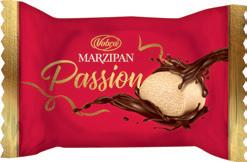








GRUPA MOKATE STRATEGIA NA PRZYSZŁOŚĆ
Mokate Group A Strategy for the Future
Rozmowa
Jak w zmieniających się realiach rynkowych odnajduje się firma Mokate? Jaką strategię dalszego rozwoju biznesu przyjęliście na najbliższe miesiące, może lata?
How does Mokate fare in the changing realities of the market? What strategy of further business development have you assumed for the months or maybe years to come?
Adam Mokrysz: We like challenges that require bold and visionary action. With our experience and persistence, we are able to meet such challenges and expand successfully on international markets. Our exports comprise more than 70% of the Group’s revenues. Its further development is possible because we have focused on the innovativeness and quality of our offer, as well as on consistent building of durable business relations.
Adam Mokrysz: Lubimy wyzwania, które wymagają odważnych i wizjonerskich działań. Dzięki naszemu doświadczeniu i wytrwałości udaje się im sprostać i z powodzeniem prowadzić ekspansję na międzynarodowych rynkach. Nasza działalność eksportowa stanowi ponad 70 procent przychodów Grupy. Dalszy jej rozwój jest możliwy dzięki temu, że postawiliśmy na innowacyjność i jakość naszej oferty oraz konsekwentne budowanie trwałych relacji biznesowych.
Being true to tradition and to family values has been the basis for the hitherto development of the Mokate business. Can the family character of the company help in the management and further development of such an immense enterprise as the Mokate Group?

Wierność tradycji i rodzinnym wartościom to podstawa dotychczasowego rozwoju biznesu Mokate. Czy rodzinny charakter firmy pomaga w prowadzeniu i dalszym rozwoju tak potężnego obecnie biznesu, jakim jest Grupa Mokate?
Katarzyna Mokrysz: We have already operated under the Mokate brand for 32 years. Currently, we are an international enterprise, with a turnover exceeding one billion zlotys, and yet we have managed to remain a family company. For many years, we have been building a corporate culture based on respect for family values and traditions, as well as on the work ethos. At the Mokate factories in Poland and the Czech Republic, we employ more than 1,500 people, including entire families.
Katarzyna Mokrysz: Pod marką Mokate działamy już 32 lata. Obecnie jesteśmy przedsiębiorstwem międzynarodowym, z obrotem ponad miliard złotych, a mimo to udało nam się zachować status firmy rodzinnej. Od wielu lat budujemy kulturę firmy opartą na poszanowaniu wartości i tradycji rodzinnych, a także na etosie pracy. W fabrykach Mokate w Polsce i w Czechach zatrudniamy ponad 1500 osób, w tym całe rodziny.
dr Adam Mokrysz, dr Katarzyna Mokrysz
z dr. Adamem Mokryszem, Prezesem Grupy Mokate oraz dr Katarzyną Mokrysz, Dyrektor Generalną.
38
An interview with Dr. Adam Mokrysz, the President of the Mokate Group and Dr. Katarzyna Mokrysz, CEO.
The technological progress is accompanied by innovativeness in products and technology. Please tell us about the innovative implementation process at the Mokate Group.
A.M.: Innovativeness and quality are Mokate’s keys to success. Markets never stand still, they evolve all the time. One has to keep a close eye on the changing consumer behaviour and keep up with it, or sometimes even anticipate it. It is worth trying to create new trends on your own, too. New flavours and new aromas are being worked out at our laboratories. We constantly develop the department of specialist raw materials for the food industry, such as milk-fat mixes, components for ice cream production, whiteners, or frothing agents. This would have been impossible without our investment in the Żory plant, one of the most modern structures of such type in our continent. It has an immense capacity of 79,000 square meters, which could accommodate 35 Olympic swimming pools.
idzie również innowacyjność w obsza rze technologicznym i produktowym. Proszę opowiedzieć o procesie wdrażania innowacyjności w Grupie Mokate. A.M.: Innowacyjność i jakość to klucze do sukcesu Mokate. Rynki nie stoją w miejscu, cały czas ewoluują. Trzeba bacznie śledzić zmieniające się zachowania konsumentów i za nimi nadążać, a nawet wyprzedzać. Warto też samemu próbować tworzyć nowe trendy. W naszych laboratoriach powstają nowe smaki i nowe aromaty. Cały czas rozwijamy dział specjalistycznych surowców dla przemysłu spożywczego takich jak: mieszanki mleczno tłuszczowe, komponenty do produkcji lodów, zabielacze i spieniacze. Nie byłoby to możliwe bez inwestycji w zakład w Żorach, który jest jednym z najnowocześniejszych obiektów tego typu na naszym kontynencie. Ma potężną kubaturę liczącą 79 tysięcy metrów sześciennych, która mogłaby pomieścić 35 basenów olimpijskich.
Sustainable business development is a very important direction, especially if we think about the next generations. How does Mokate perceive this trend?
K.M.: Mokate Group of Companies wishes to care for the good and future of our planet, hence we put much emphasis on broadly understood ethical and ecological issues. We make all efforts to be able to develop in a sustainable manner, which is why we search for ground-breaking solutions based on science and modern technology.
Rozwój biznesu w sposób zrównoważony to bardzo ważny kierunek, szczególnie jeżeli myślimy o kolejnych pokoleniach. Jak Mokate postrzega ten trend?
K.M.: Grupa firm Mokate chce dbać o dobro i przyszłość naszej planety, dlatego przywiązujemy dużą wagę do szeroko rozumianych kwestii etycznych i ekolo-
gicznych. Dokładamy wszelkich starań aby móc rozwijać się w sposób zrównoważony, dlatego poszukujemy prekursorskich rozwiązań opartych na nauce i nowoczesnej technologii.
Let us talk about the market. How do the coffee and tea markets in Poland look today?
A.M.: Thanks to the introduction of new product lines, our shares in the tea and coffee market segment are continually growing. However, it is not just percentage points that matters to us. An important thing is to maintain as high quality as possible because it is quality that defines Mokate. Watching the changing trends, we have strongly and successfully developed the operation of our online store.
Przejdźmy do rynku. Jak wygląda obecnie rynek kawy, a jak herbaty w Polsce?
A.M.: Dzięki wprowadzaniu nowych linii produktów nasze udziały w segmencie rynku herbaty i kawy ustawicznie rosną. Jednak nie tylko punkty procentowe mają dla nas znaczenie. Ważne jest utrzymanie jak najwyższej jakości, bo to ona definiuje Mokate. Obserwując zmieniające się trendy, mocno i z sukcesem rozwinęliśmy działalność naszego sklepu internetowego.
Mokate jest jednym z największych producentów kawy i herbaty w Euro-
pie Środkowo-Wschodniej. Jak wygląda rozwój firmy w obszarze eksportowym, także w kontekście bieżącej sytuacji geopolitycznej.
A.M.: Grupa Mokate stała się organizacją międzynarodową dzięki szybkości działania i elastyczności. Udaje nam się sprostać wysokim wymaganiom klientów z całego świata. Do każdego rynku podchodzimy indywidualnie, bo każdy rynek ma swoją specyfikę. Patrzymy długofalowo, stawiamy na wieloletnią, konsekwentną pracę. Zależy nam na stabilnych i pełnych zaufania relacjach biznesowych. Nasze portfolio obejmuje ponad 50 linii produktowych, w tym tak znane marki jak Mokate, Loyd, New York Coffee, Carmen, Dobra Kaloria*.
Mokate is one of the largest coffee and tea manufacturers in Central-Eastern Europe. How does the development of the company look in the export area, also in the context of the current geopolitical situation?


Coraz bliżej święta… Czym w tym roku zaskoczy konsumentów sezonowa oferta Mokate?
A.M.: The Mokate Group has become an international organization due to its quickness in operation and flexibility. We manage to meet the high expectations of customers all around the world. We have an individual approach to each market, as every one of them has its own peculiarities. We take a long-term perspective and focus on many years of consistent work. We care about stable and trustbased business relations. Our portfolio includes more than 50 product lines, including such well-known brands as Mokate, Loyd, New York Coffee, Carmen, Dobra Kaloria*.
K.M.: Z roku na rok nasza oferta jest coraz bogatsza. Na pewno w zimowe dni nasi klienci sięgną po herbaty rozgrzewające. Idealnym świątecznym upominkiem mogą być kawy ziarniste Mokate i Marila albo herbaty Loyd w świątecznych puszkach. Zachęcamy do odwiedzenia naszego sklepu internetowego i zapoznania się z całym asortymentem niepowtarzalnych smaków i aromatów naszych herbat i kaw. Każdy konsument z pewnością znajdzie coś dla siebie: oryginalnego, pysznego i niezwykłego. Takie są produkty Mokate...
Thank you for the interview.
Dziękujemy za rozmowę
*Udziały Dobrej Kalorii w 50% należą do rodziny Mokrysz i w 50% do rodziny Kubara.
*The shares of Dobra Kaloria are owned in 50% by the Mokrysz family and in 50% by the Kubara family.
The production plant in Żory.
Zakład produkcyjny w Żorach
Zakład produkcyjny w Żorach jest jednym z najnowocześniejszych obiektów tego typu na świecie
The production plant in Żory is one of the world’s most modern facilities of such type.
39 #interview
The production plant in Ustroń.
Polish FMCG market summary

2022 brought many changes to the Polish market of fast-moving consumer goods. Unforeseen events, inflation, growing prices – December is a good time for summing up. What challenges did producers face? Which subjects dominated the industry discourse? Which categories won the consumers’ hearts (and receipts), and which trends had the most profound impact on the offer of the leading players? The industry’s representatives analyze the last twelve months in the trade sector and lay out their future plans.
Jan Kolański President of the Board Colian


In my opinion, the past year has been an unprecedented time – with the economy seriously battered after the COVID-19 pandemic and additionally strained by the war in Ukraine. The unstable geopolitical situation contributed to price increases on the raw materials market, as well as to price rises of electric power, gas, and other fuels. Therefore, production costs have become the greatest inhibitor to the development of most enterprises, having them focus on actions aimed at searching for savings. Colian is no exception – we were forced to verify our assumed budgets as much as other entities were. In such an uncertain environment, we carefully conside our decisions so as to emerge unscathed from the crisis. We watch the market trends closely and we skillfully implement them in our own portfolio. In recent years, the consumers’ awareness has been growing, as has the demand for vegetarian and eco products. This is certainly the main direction of our activities nowadays. Out of care for the environment, we will invest in green energy in the years to come. Due to inflation, as well as to a range of other factors, other plans have been suspended.
For Mlekovita, a company with many years of tradition and a well-founded position on both the Polish and foreign market, 2022 has been an exceptional, jubilee year: it marked 30 years of the brand. Mlekovita spent the jubilee of its brand as the largest dairy group not just in Poland but in the entire Central-East Europe. To commemorate this jubilee and three decades of the development of our company, we organized a range of events in 2022, including the 1st All-Polish Forum of Business Partners or the 1st All-Polish Dairy Trade Congress. On the occasion of our jubilee, Prime Minister Mateusz Morawiecki paid a visit to our central office in September. All things that have happened in the past year prove the rightness of the road that we had taken 30 years ago – since its inception, Mlekovita has enjoyed the recognition of consumers and experts alike, gaining many prizes for the brand and its products. I am glad Mlekovita invariably proves to be the best and most valuable brand in the industry. This is another confirmation of the strategy rightly chosen 30 years ago, focusing on long-term partner cooperation with milk suppliers, as well as on consistent development for the good of the consumers. The history of the Mlekovita brand is written with constant development. This allows us to look confidently into the future and to develop the Mlekovita company and brand.
Edmund Borawski Former President of the Board SM Mlekpol
The year of 2022 has been extremely demanding to the entire FMCG industry. As soon as the pandemic-related economic restrictions were lifted, a war broke out in Ukraine. In view thereof, food producers, including SM Mlekpol as a leader of the dairy market, came to bear particular responsibility for ensuring food security to Polish consumers. With its experience, optimization, and change of production directions, Mlekpol has emerged unscathed from the situation. However, potential restriction of energy supplies has become a real threat. It has become necessary to ration the consumption of fuels essential for food processing. Yet the greatest strength of the Cooperative is the people who create it: milk suppliers, employees, and partners. SM Mlekpol follows the principles of sustainable development, engages in many undertakings to the benefit of the local community and natural environment. It also develops its production on a regular basis. Next year, the offer will also be expanded to include new products in line with the current trends and consumer needs. All of this makes the Cooperative develop resiliently and break new records of purchase, processing and sales of dairy products, both in Poland and abroad.
 Dariusz Sapiński President of the Board Mlekovita Group
Dariusz Sapiński President of the Board Mlekovita Group
40 #summary
 Jakub Nowak President of the Board JNT Group
Jakub Nowak President of the Board JNT Group




After the pandemic, the year 2022 brought more challenges to the economy, and thus to the wine industry; namely, the conflict in Ukraine and the abrupt inflation. The war translated into problems with availability of bottles, price increases of raw materials based on wheat and maize, as well as growth of energy prices. As for the inflation, the costs of materials at JNT Group, including raw materials, have grown by 75% during the year. Simultaneously, the pressure from consumers who limit their expenses is growing. The trend of premiumization, observed on the wine market over the recent years, has markedly slowed down – Polish people choose products which are slightly less expensive but of good quality. The year to come will be equally hard for the industry, especially the smaller companies, due to the predicted recession and continued inflation.
In spite of the recession, JNT Group is closing the year with good results. We are focusing on development of the product portfolio and we have marketed such products as Galicyjska and the new variants of Grzaniec Galicyjski mulled wine in the past year. We are also developing the growing category of aromatized wines, e.g. the new Monte Santi Frizzante line. In 2023, among other things, we plan further development of the key Monte Santi brand and intense marketing activities.
Maciej Częścik
Deputy President of the Board, Trade and Marketing Officer, Sokołów

This year has put particularly many challenges on our way. The outbreak of the war in Ukraine brought far-reaching consequences to the economic situation, not just in our region but globally. We are all struggling against the rampant inflation. Production costs have reached an extremely high level and pose an enormous challenge to producers. In the meat sector, other challenges include ASF which is still spreading, the unstable situation on the raw material market, and the pig stock decline. Despite such difficult conditions, thanks to the hard work of the entire team at Sokołów Group, as well as the active search for solutions and new possibilities, we have managed to achieve satisfactory results. Due to the extremely complex market situation, it is hard to make any well-founded prognoses today for the year to come. However, the sure thing is that consumers will continue to demonstrate increased sensitivity to the value-to-price ratio and search for promotions. Of particular importance to us is the effort to maintain the balance between the stable development of our Group and maintenance of prices acceptable to customers. We will continue our active search for and implementation of optimizing solutions in many areas. We are invariably implementing investments in the area of sustainable production of food. Our goal remains to provide high-quality, safe and tasty products in line with the expectations of our consumers.
Wyrzykiewicz
In 2022, Hochland Polska was well-organized, and even in difficult times, it was able to ensure virtually uninterrupted availability of its offer to the market and stores. However, one cannot deny that the dairy industry is acutely feeling the results of the progressing inflation affecting the way people spend and save, not to mention the choice of products they buy. At Hochland Polska, we act with unprecedented quickness and flexibility, at each stage of operation, including the area of design and management of expenses and prices. We have successfully passed another year of the pandemic with no loss of life or severe illnesses. We have also defended our market share and maintained the leader’s position held by our brands in the category of cheese. Hochland Polska is continuing its development and doing what it does best: developing and strengthening its brands. The greatest achievement of Hochland Polska in 2022 was the new Almette cottage cheese. This concept stands out on the market, surprising the consumers with a modern interpretation of classic cottage cheese. Several weeks since entry to the market, Almette cottage cheeses have been deemed the Golden Innovation of FMCG in 2022. We are fighting for the consumer all the time! Each day, consumers across Poland have almost 2,400,000 sandwiches with our cheese, and our plan for the year to come is there will be even more of it!
For many years, we have been able to boast our specialization in refrigerated transport in countries of Western and Southern Europe, as well as Scandinavia. Conducting many talks with our contractors for a couple of years, we have noticed a trend for increased demand for transport of small quantities of goods requiring controlled temperatures. Hence the expansion of our offer and the adaptation of our fleet to the customers’ needs. We invest in the development and the innovation of our equipment. We leave no room for any shortcomings or negligence which may affect the final quality of the product delivered to an individual customer. Apart from the fleet development, we have invested in our storage areas, so that semitrailers can be handled without interrupting the cold chain. We are capable of adapting to every kind of goods requiring transport. Apart from high-class equipment and unlimited tool capabilities, we care a lot for the relations with our customers, offering consulting services in addition to the transport ones. We are available 24/7, always striving to meet the expectations and requirements of our contractors. We find nothing impossible – the sky is the limit.
Jacek
PR & Marketing Services Manager, Hochland Polska
42 42 #summary
Jakub Kępka Key Account Manager Transad
Iwona Jacaszek-Pruś Corporate Director Kompania Piwowarska

2022 was another difficult year for the brewing industry. Another 10% raise of excise tax, the war in Ukraine and its consequences, the quickly growing inflation, and supply chain disruptions made us face extremely hard challenges. We also had to face consumer sentiments worse than in the darkest moments of COVID-19. According to the data of Kompania Piwowarska, the sales of beer in the April-August period dropped by 2.5% year-on-year in terms of volume. The value of the market only grew due to the growth of retail prices of beer, caused by the inflation. Growth in terms of volume, much slower than in the previous years, was recorded by non-alcoholic beers – almost 6%, flavoured beers – almost 5%, premium lagers, mainly international brands – nearly 7%, specialties – above 3%. The growth of Kompania Piwowarska in specialties was twice as high as the market average. We have maintained the position of the industry leader and implemented the goals of the “Better Future 2030” strategy. We will continue developing the segments of 0.0% beers, flavoured beers, premium and super-premium lagers: Kozel, Pilsner Urquell, Peroni, and to support our brands which are the leaders of the Polish market: Żubr and Tyskie.
Joanna Olczak Sales & Trade Marketing Director ETi International
2022 was a year full of challenges. The inflation affected the prices of raw materials, production costs and transport. This forced producers to increase the prices. A problem of availability and continuity of supplies arose. However, the Polish confectionery market grew thanks to brand products, private labels and new goods. We are growing, introducing new products, expanding our cooperation with partners, and implementing the assumed strategy focused on innovativeness, quality, and diversity.
The high awareness and good reputation of the Dare brand facilitate new implementations. In 2022, we expanded the Dare offer to include whole-grain cookies (distinction: Innovative Product 2022), with wheat from controlled sustainable crops. Polish people love confectionery, so they will keep buying it despite inflation and lower purchasing power. Under difficult economic conditions, they will pay more attention to the composition of products, their effect on the body, the way they provide pleasure. The focus on one’s own needs is a way to recover from painful events: the pandemic, the war, the crisis. In our plans for the next year, we wish to be consistent: to build our position, to improve the distribution, to deliver quality and the “taste of happiness” to our consumers.
Maciej Herman CEO LOTTE Wedel




The Polish confectionery market is characterized by high maturity, which is why manufacturers (including Wedel) search for new paths for development, betting on exports, among other things. Simultaneously, in connection with the outbreak of the war in Ukraine, we were forced to introduce a number of changes in the area of international trade, e.g. in the management of purchases and the supply chain, or revision of our strategy of presence abroad, in view of our decision to discontinue trade in Russia and Belarus. As a target, within the next couple of years, we wish to double the value of our exports that currently comprise 10% of the entire company’s sales. Among other things, we continue our activities on the well-known and proven markets of the Polish diaspora.
What will 2023 bring to the food sector? We expect that the high inflation level will continue and the prices will not return to the pre-pandemic levels. We hope that, in the long run, the prices of raw materials, energy, and production costs will stabilize and the economic situation of the country will recover. Together, these two elements have a chance to stabilize the condition of the whole market and the budgets of Polish consumers.
With 30 years of operations behind us, we have finished the last year with record-breaking sales, exceeding PLN 300 million for the first time. This result is especially spectacular, as it means we have become the largest supplier of dried fruit on the retail market in Poland. However, in the perspective of next year, positive symptoms are hard to find, particularly in terms of profitability. Inflation, depreciation of the zloty, the growing prices of energy, transport, or packaging the shrinking gross margin on sales and, in addition, the increasing interest rates, are no allies to us. We have never faced price increases on such a scale before. The unstable macroeconomic situation, especially on the currency market, causes numerous difficulties, starting from longer periods in the submission of offers. On the other hand, competitive advantages developed over many years are working in our favour. We have one of Europe’s greatest plants in the industry and we are the leader of the retail market in Poland. This allows us to obtain a significant effect of economies of scale. Therefore, the demand should be no problem for us, but growing expenses mean falling margins.
43 #summary
Leszek Wąsowicz President of the Board HELIO
Mieszko Musiał President of the Board, Carlsberg Polska

2022 was another year of serious challenges. The industry is recording further drops in the sales volume of beer, as well as a valuable growth resulting from higher prices. This is connected with an unprecedented inflation, higher costs of labour, raw materials, or energy, as well as taxes, since the excise tax is growing by 10% again. In 2022, the industry recorded serious shortages in availability of certain raw materials and services, many of which were directly related to the war beyond our borders.
The industry’s challenges also affected our company. In such a dramatic situation, apart from our standard business operations, we strived to help our Ukrainian colleagues, organizing shelter for them in Poland, as well as arranging a survival camp at our Lviv brewery. As for the beer market, through the efforts of the entire organization, we have proposed many new, interesting products to our consumers, and developed the offer of 0.0% beers further, to include 15 products as of today. We have introduced new premium brands; Brooklyn in the category of lagers, as well as the flavoured and unique Blanc 1664, both were received very positively by the consumers. The market situation forces us to cut on all cost items which are not necessary for our basic operations. Our priority, as always, will be an extraordinary offer of new products, with no compromise regarding quality and the care for our team and its wellbeing. We have to survive this difficult time together.
2022 was another difficult period that we and the entire market had to face. Although we managed to catch a little breath after the hard pandemic year of 2021, which had already been an extremely difficult, unpredictable, and surprising time, far from the assumed plans, the year 2022 and the Russian invasion of Ukraine in February have startled and frightened everyone. The Polish economy is facing a range of challenges of a scale unprecedented over the last dozen years. The months and maybe years to come will be a difficult time, due to numerous factors, such as the runaway inflation, the increase in prices of energy raw materials, and the prospects of their shortage. We fear the emergence of stagflation in Poland, or a situation in which substantial inflation would coincide with a period of economic stagnation. The non-price aspects of products will become less relevant, as the consumers will pay most attention to prices. We know well that we pay more for good quality than for an economic-shelf product, which worries us as a producer of high-quality dairy products – consumers may pick goods which are slightly cheaper but much worse in terms of quality. OSM Łowicz stands on solid foundations – a recognizable brand, a well-established market position, qualified personnel, modern technological lines, and a good base of raw materials, to last and develop even in such difficult times.
Kamil Gębski Vodka Marketing Director, CEDC International, Maspex Group

2022 has been a year full of challenges to the entire FMCG industry, and particularly to spirits, due to the growing excise tax and the unprecedented growth of production costs. Simultaneously, this is a year of high hopes for the industry – new concepts and flavours are being successfully tested, such as Soplica Zimowa, Żubrówka Rześki Rokitnik, or Rajska Cytryna.
This was a year of major changes connected with CEDC joining the structure of the Maspex Group, with simultaneous struggle for the constant development of the category of vodka and other alcoholic beverages in Poland.


The spirits sector in Poland is still developing, and the consumers show their appetite for innovations. The Polish people experiment with new alcohol flavours, formats, or packages more eagerly and more frequently. For many years, we have observed the trend for premiumization of spirits, following which the consumers increasingly reach for more expensive, high-quality alcohol – both for consumption and as gifts. Polish consumers choose proven products by well-known brands. They also search for traditional beverages prepared in accordance with old recipes. Soplica liqueurs and nalewka fruit infusions certainly fit in with this trend. As the leader of the alcohol industry, we wish to take the responsibility for its development to the benefit of our trade partners. We plan many powerful campaigns with regards to the offer, but also to other consumer experiences and trade tools.
 Agata Makowska Trade Director OSM Łowicz
Agata Makowska Trade Director OSM Łowicz
44 #summary
Jacek Górecki Managing Director Lantmannen Unibake Poland


2022 has been a laborious and fruitful year for Lantmannen. We have completed, in advance, another stage of investment in the Nowa Sól bakery, launching a new production line. This has helped us fully satisfy the expectations of Polish and foreign customers of the Lantmannen Unibake Group. We have recorded a significant growth in volumes of production and sales after a stagnation period in the catering business, caused by the pandemic. With excellent planning and cost discipline, we have limited price rises, caused by the energy crisis and runaway increases of raw material prices, down to the necessary minimum. The bakery industry is struggling with availability issues and the costs of gas and electricity, and we have prepared for even stronger protection in this area from unpredictable factors, especially those resulting from the cruel war waged against our neighbour, Ukraine. We are also glad our work has gained recognition expressed with awards, such as the Forbes Diamond or the Innovation Supplier of the Year distinction received from a key customer.

Evangelos Evangelou President of the Board,
 Herbapol-Lublin
Herbapol-Lublin
In 2022, the global economy had to face exceptional challenges. The consequences of several years of the pandemic overlapped with far-reaching effects of the war in Ukraine. The limited availability of raw materials and lack of liquidity in the supply chain were felt very acutely by the entire food industry. This situation has shown just how important appropriate planning and proper cooperation with suppliers are. It was only due to earlier purchases of key raw materials that it was possible to ensure full stocking in this regard.
Next year, one should expect the models of functioning of many enterprises to undergo brutal verification some of them could fail. This is natural during every crisis. Moreover, in view of the steadily growing interest rates, interest will be an increasing burden to companies who are already propping up their operating activities with loans. Therefore, in such an unusual period, it is worth betting on stable companies with a proven model of operation and an appropriate base of resources, including financial ones.
The year 2022 turned out to be extremely intense and full of challenges. The rapid inflation made consumers do their shopping more carefully, e.g., they are more inclined to choose lower-weight products. For our industry, this year meant extreme market instability as well – not just the hard-to-predict growth of prices but also disrupted continuity of the supply of components necessary for production. We are closing 2022 with success. In spite of the crisis, we have recorded a growth in turnover – both in terms of value and, which is extremely precious, in terms of quantity. This means that even in more difficult times, with a lot of products to choose from, consumers increasingly tend to reach for the traditional, proven ones, with a good composition. In view of the unstable situation, the nearest future is hard to predict for our company and the entire sector. We expect consumers to start optimizing their expenses even more, which will probably affect the market of food products as well, including mayonnaise. Looking into the future, most of all, we are watching the market and the global situation closely. Despite the difficulties arising from the economic situation, we are consistently doing our thing, striving to implement our assumed longterm plans. We have a strategy that has worked so far, so we are steadily continuing it. We will surely focus on the expansion of our offer. As late as November, our product family was joined by Ćwikła z chrzanem (Beetroot with Horseradish), and we plan more new products for the beginning of 2023.
Artur Węgłowski Trade Director Goodvalley
2022 has been a very intense year for our company. We changed the name of our brand and the package design. We introduced a new product to the market: Parówki Dobre frankfurters. This offer of Dolina Dobra caused a stir on the market, with its combination of aspects that had been seen as contradictory before: a clean label, sustainable production, and an affordable price. We are glad we have managed to fulfill all our goals, despite the difficult economic situation. The last year has proved just how variable the market situation can be and how difficult it is to foresee its future development. However, what can be confirmed now is the strengthening of the significance of sustainable production of meat and cured meats. The year to come will also mean the development of the consumer patriotism attitude. Customers are more eager to reach for Polish products, to support Polish enterprises. Contrary to what many may expect, the crisis has taught us to choose products more carefully and to overcome previous habits.
Zbigniew Mojecki Deputy Business Manager WSP “Społem”

45 #summary
Marek Maciejewski Sales Department Manager Sertop




2022 was another year in which we had to face new, hitherto unknown challenges, the beginning of the year related to the receding pandemic and the outbreak of war in Ukraine, did not inspire optimism. The volatility and unpredictability of the export market became even more apparent. The galloping inflation in the second half of 2022 presented us with great challenges. In May 2022, Sertop exhibited at the PLMA fair in Amsterdam, promoting its new products. In exports, 2022 was the year of promoting the latest products from the Sertop portfolio, i.e. processed cheese in slices packed in 130g portions and 90g blocks. We focused on promoting and showing new products, i.e. slices in the extended offer: Golden Emmental, Gouda, Cheddar and new Toast, with ham and the latest product, lactose-free Gouda slices. At the end of 2022, we introduced product line, blocks weighing 90g: Cream, Herbal and Ham. We hope that in the coming year the sale of these products will be equally satisfactory for us.
Grzegorz Zuba Trade Director ZPH ARGO Sp. z o.o.
The paradigms have changed, this year will be special. In the chaos of rampant inflation, limited access to certain raw materials, growing costs, or changing product prices, any predictions seem as good as divination. But on the other hand, when, if not now, should we think about great things? The market is changing, gone are the old products and the old customers, and especially the old prices. A new hand has begun on the market, which does not happen often. This is an enormous opportunity. One has to prepare well to use it, to have an available product and to become an attractive solution in terms of price. Our company has prepared many interesting solutions, such as the Sour Madness candy and lollipops, combining the elements of emotion, curiosity, astonishment, and surprise. “Take the challenge” – the claim attributed to the Sour Madness brand is the best reflection of the predictions for the upcoming year. We intend to double the sales.
Marcin Tarka Sales Director Upfield Polska
Grzegorz Grabowski Managing Director Toruńskie Wódki Gatunkowe


The past year was ... the best year in our career to date. We started working on a new bottle for our main products - vodka under the brand Toruńska, Śliwowica Polska, Hubertówka Leśna. There will definitely be new flavors as part of these brands. We have won several significant awards, including Silver medal for Retman Strong Vodka and Retman Crystal Vodka in San Francisco World Spirit Competition and gold medals in the next edition of Warsaw Spirit Competiton. We have acquired new export customers and we are also developing projects in the Asian direction. It is a long -term effect, but we already see a large increase in interest in Polish alcohols. We are also preparing to expand and enrich the business offer addressed to companies and to develop the project of individual own brands for Poland and clients from abroad, with small volumes, including by introducing personalized packaging. The year 2023 welcomed us with a crazy increase in the prices of dry materials (bottles, labels, closures, collective packaging), a five % increase in excise duty on the domestic market. We have decided to implement projects closer to the client - we create micro and macro brands of local brands with the participation of components and recipes from various parts of Poland and the world.
2022 was an interesting year in the segment of plant-based dairy substitutes. It started with rises forced by inflation, shortage of raw materials, higher costs, to which the natural response was to focus on implementation of the price list with limitation of promotion and marketing. In spite of high variability, the end of the year is encouraging; the availability of raw materials is not that bad, and we are more inclined to engage in promotional activities putting consumers in the focus of our attention. The value of the segment of butter, margarine and mixes exceeded 5 billion, overtaking the coffee category in terms of value. Of course, the growing prices were among the causes – yet today, the category in which Upfield is the global and Polish leader has become a considerable asset, even to such players as Biedronka, Lidl, Kaufland, Dino, or Żabka. For 2023, we predict a gradual return to the normal, understood as support to our Business Partners – trade chains – in resale of such cult-status products as Rama, Flora, ProAktiv, or Violife, through implementation of Upfield’s new marketing campaigns. We will surprise the consumers again with new products making the sector develop dynamically, but we will not forget our specialties either: Delma, available in the “Sandwich” variant proving itself in these difficult times, and Kasia, which has long overtaken butter in the baking category and is currently holding the position as leader. Trade chains today aim at the development of private labels, but this is a careless path, as the strength of a well-known brand, such as Rama or Flora, provides mutual benefits in market development. Strong producer brands make it easier for consumers to compare the prices of same-quality products. It is true that consumers today are open to private labels, but trade chains with a far-reaching approach to business will maintain a healthy balance, knowing that it is the producers after all who invest in the development of recognizability of their brands, thus stimulating the general category growth. Of course, we are able to produce a private label as well and everything depends on the price conditions of negotiations. Today, however, private label prices have a limited capability to make this business profitable for trade, so I assume this is a temporary situation.
46 #summary


magazyn kupców pols kich ogólnopolskie pismo rynku fmcg 01/2023 NOWOCZESNA FRANCZYZA Czy warto skorzystać? » s. 68 DROGERIA Nowe trendy » s. 74 KATEGORIE PRODUKTÓW Karnawał 2023 » s. 24 Styczeń 2023 01/203
Promotion of Polish products on international markets

Agri-food products from Poland enjoy unwavering popularity on international markets. The value of Polish exports is on the rise every year and Polish producers are actively seeking out new markets to expand into. They are supported in this endeavour by state institutions. One of these institutions is the National Support Centre for Agriculture.
The National Support Centre for Agriculture (the KOWR), is a governmental agency that works under the supervision of the Polish Ministry of Agriculture and Rural Development. The KOWR implements promotion policies in the agri-food sector in Poland. One of the main responsibilities of the KOWR is to build a positive image and develop recognition of Polish food abroad under the brand ‘POLAND TASTES GOOD’.
The brand ‘POLAND TASTES GOOD’ stands for excellent taste and is associated with Polish food products of the highest quality. It is also a response to the growing demand for healthy food that is produced in harmony with the environment, using traditional techniques and production methods.
Under the common brand ‘POLAND TASTES GOOD’, the KOWR supports Polish agri-food entrepreneurs in their efforts to expand into new markets. To this end, the institution organises trade missions and national stands at international food fairs. Polish entrepreneurs are provided with assistance from the KOWR, starting with organisational and logistical aspects, through the organisation of visits to trade outlets, to the arrangement of business meetings. With this support, Polish companies could participate, as a part of Polish national stands, in 19 trade fairs in 17 countries in 2022. These included European countries such as Germany, France and the UK, but also many Asian destinations such as Singapore, Japan, South Korea, Vietnam, and other.
The KOWR’s task – connecting potential business partners in the agrifood sector, both Polish and foreign –is carried out also during trade missions to Poland of food importers, distributors, and representatives of foreign retail chains. These missions include business meetings with Polish food producers and tours of agri-food processing plants. Such visits are of great value for both parties, as they provide visiting entrepreneurs with a deeper understanding of the Polish market and open up an opportunity for direct communication with producers. They often give a close-up look at the entire production process, allowing the guests to see them with their own eyes.
48 #marketinsight
The KOWR organises and co-organizes various events to promote Polish food and culinary tradition. It also participates in organisation of events held abroad by Polish diplomatic missions, foreign organisations, chambers of commerce, and other governmental institutions with a view to promoting high-quality Polish food. In Poland, the KOWR cooperates with foreign diplomatic missions. It also supports Polish trade and inter-trade organisations in implementing promotion and information programmes accepted by the European Commission under the EU’s common agricultural policy.
The KOWR also promotes Polish food in other forms in traditional and digital media. This includes co-operating with food journalists, experts and influencers from different countries. In 2022, the KOWR organised once again a study tour for food bloggers. During the visit, the foreign guests were given an opportunity to explore the culinary traditions of four different regions in Poland: Warmia and Masuria, Podlasie, Lubelszczyzna and Mazovia. Over the course of several days participants from Germany, the Czech Republic, Lithuania, Belgium, and the Netherlands explored the abundance of Polish culinary culture and shared their experience in real-time on their social media profiles. Their followers were able to join in on their journey and stay updated on their experiences, as if they were travelling alongside them. Such promotional activities allow for reaching a vast audience all around the world. They not only encourage people outside Poland to purchase Polish products, but also to visit the country and experience for themselves that Poland tastes good.
As a further way of supporting entrepreneurs in the process of undertaking export activity on foreign markets, the KOWR orga-
nizes information and training seminars that cover topics such as market conditions and principles of doing business. These meetings often feature guest speakers from other countries, including potential importers of Polish food, to provide valuable insights and advice.
Acting in many fields and maintaining consistent communication, the National Support Centre for Agriculture contributes to the increasing recognition of Poland’s agri-food offer. The KOWR is committed to follow the latest promotion trends in order to effectively meet the changing needs of Polish producers and exporters. The common brand ‘POLAND TASTES GOOD’ has become recognisable and is attracting new enthusiasts, who have already learned that Polish food is undoubtedly an attractive proposition for potential customers around the world.

feel invited to visit the dedicated website
tastes good’
If you are interested in Polish agri-food
for Polish business partners, participating in pitching
B2B meetings,
missions – both in-person and online, or study
to
Please
‘Poland
www.polandtastesgood.pl/en
products, looking
sessions,
trade
visits
Poland, please contact us at eksporter@kowr.gov.pl
Date Country City/town Trade fair 20-29.01.2023 Germany Berlin Internationale Grune Woche 14-17.02.2023 Germany Nuremberg BIOFACH 20-24.02.2023 UAE Dubai Gulfood 07-10.03.2023 Japan Tokyo Foodex Japan 20-22.03.2023 United Kingdom London IFE London 23-25.04.2023 Greece Thessaloniki Freskon 23-25.04.2023 Germany Cologne ISM 25-28.04.2023 Singapore Singapore Food & Hotel Asia 08-11.05.2023 Italy Milan Tutto Food 23-27.05.2023 Thailand Bangkok Thaifex Anuga Asia 30.05-2.06.2023 South Korea Seoul Seoul Food & Hotel 10-12.08.2023 Vietnam Ho Chi Minh City Vietfood & Beverage 17-20.09.2023 Saudi Arabia Riyadh Foodex Saudi 07-11.10.2023 Germany Cologne Anuga October 2023 Romania Bucharest Indagra November 2023 UAE Dubai Dubai December 2023 Egypt Cairo Cairo 49 #marketinsight
Best products
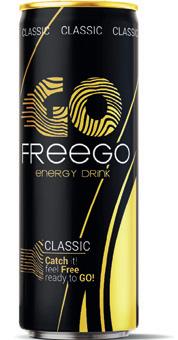
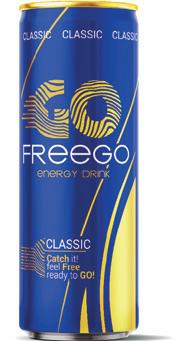

Best brands
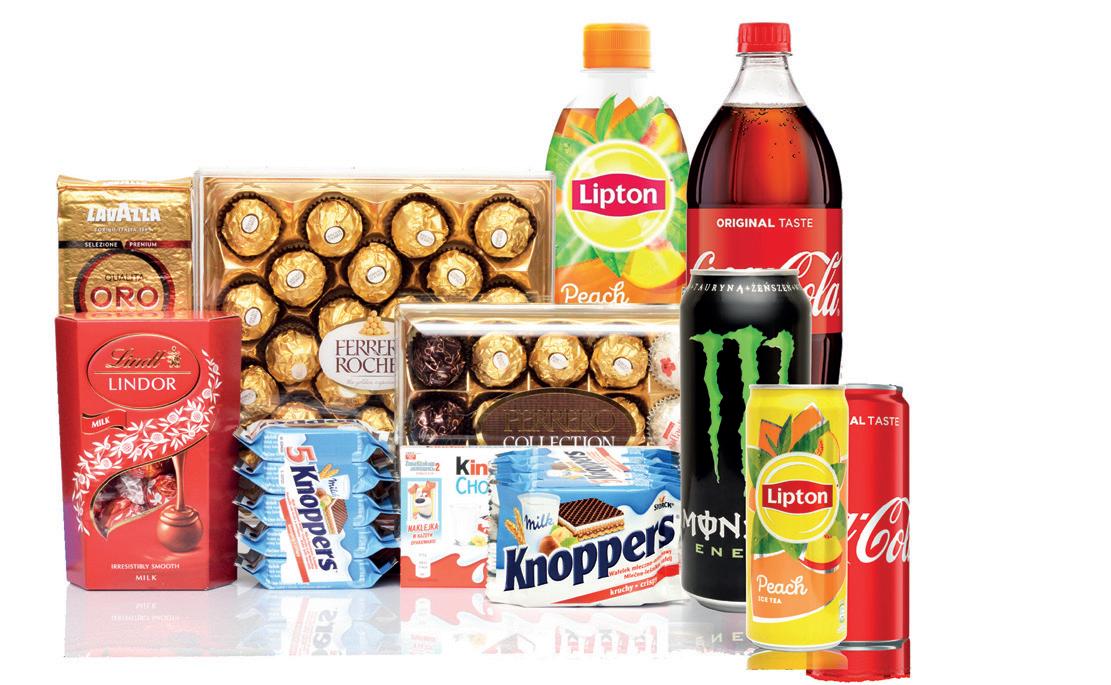
 FMCG
FMCG
Your natural, fresh choice!
Apples
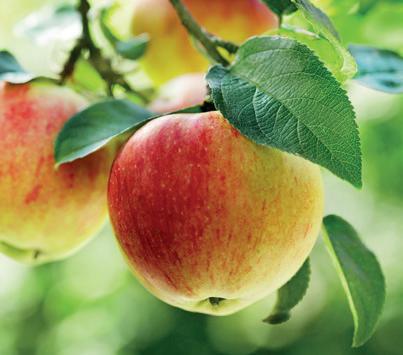
NFC
For over 30 years we are one of the leaders of Polish exporters. As a part of Ewa Bis Group, we have been supplying top quality Polish food to over 70 countries around the world.
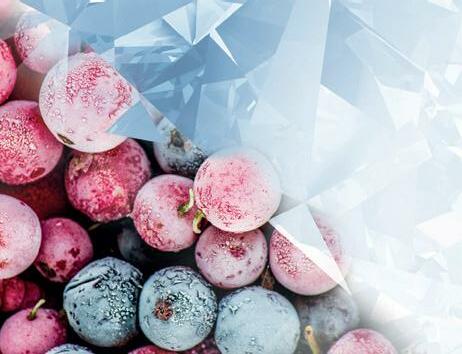
We sell our products across the EU, Africa, Asia and North America. We have been cooperating with large international manufacturers, distributors, retail chains, and smaller local stores and wholesalers. Our main purpose is to satisfy the needs, requirements and expectations of our customers concerning quality and food safety of offered products.
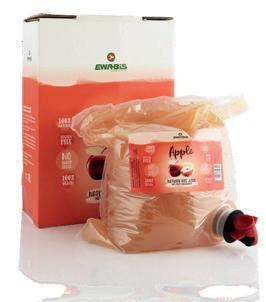
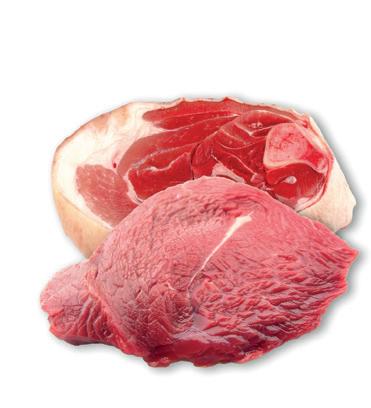
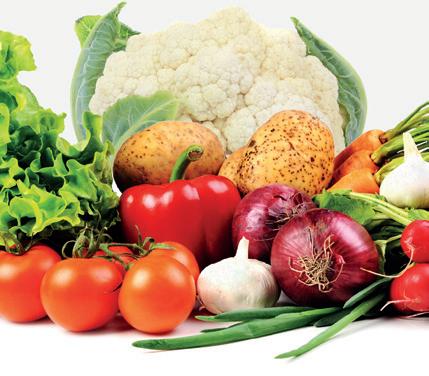
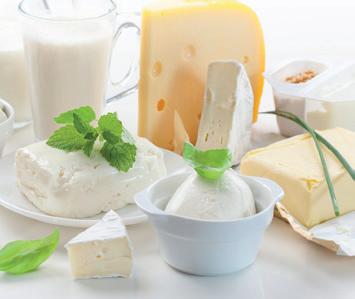
P.P.H Ewa-Bis Sp. z. o. o. ul. Serwituty 25, 02-233 Warsaw, Poland sales@ewabis.com.pl www.ewabis.com.pl
fruits & vegetables
Fresh
fruits & vegetables
Meat
juice, puree concentrates Frozen
Dairy
Tradition with a pinch of the modern, or Christmas the Polish way
Christmas is a special time of the year, and, depending on the region, many interesting traditions, and obviously Christmas dishes, can be encountered in Poland.
The symbolic first star heralds the moment to take our seats at the Christmas Eve table. On this table, twelve traditional dishes are served – in different versions – in all Polish homes. Hay beneath the tablecloth, the Christmas wafer, an extra plate, carols sang together – these are some of the rituals cultivated virtually across Poland. Depending on the region of our country, other customs are present as well; many of them are still cultivated, while others are slowly fading away.
There are also new recipes, or old ones spiced up with “modernness”, adapted to a modern consumer. But during those special days, one thing seems to matter to everyone: the time spent with the family.
For trade, this is usually one of the hottest periods of the year. Store shelves are bending under the manufacturers’ offer tailored to the customer’s needs. Usually, the Polish people go for their biggest holiday shopping about a week before Christmas, so trade has to be well-prepared for that.

12 dishes – across Poland
Christmas Eve and Christmas Day dishes differ a little between different regions, but traditional recipes are the common denominator – spiced up with a bit of modernness in some homes. On Christmas Eve, the practice is a meatless menu. Fasting soups, cold and hot fish, dumplings and pasties stuffed with cabbage and mushrooms, dried fruit compote, noodles with poppyseed, poppyseed cake, gingerbread, etc. The following two days of Christmas usually provide an opportunity to savour Polish meat specialties.
Roasted hams, pork loins, sausages, pâtés all guarantee a veritable feast for meat gourmets. Vegetarians will surely not be devoid of delicacies either – such as vegetable salad, herrings, or vegetable pasties.
Apples, poppyseed, and peas with cabbage, are the basic ingredients of a Christmas Eve dinner in the Kujawy region. Interestingly, prune soup, millet grain and traditional cabbage with mushrooms used to be prepared there.
In Kashubian homes, traditional foods include fish soup, fried mushrooms, and rice with blackberries. Christmas dishes in this region of Poland have been based on such ingredients as dried fruit, mushrooms, cabbage, potatoes, fish, beans, or peas.
In Warmia and Masuria, there had been no tradition of Christmas Eve fasting for a long time. Different meats were already eaten on Christmas Eve, including goose, sau-
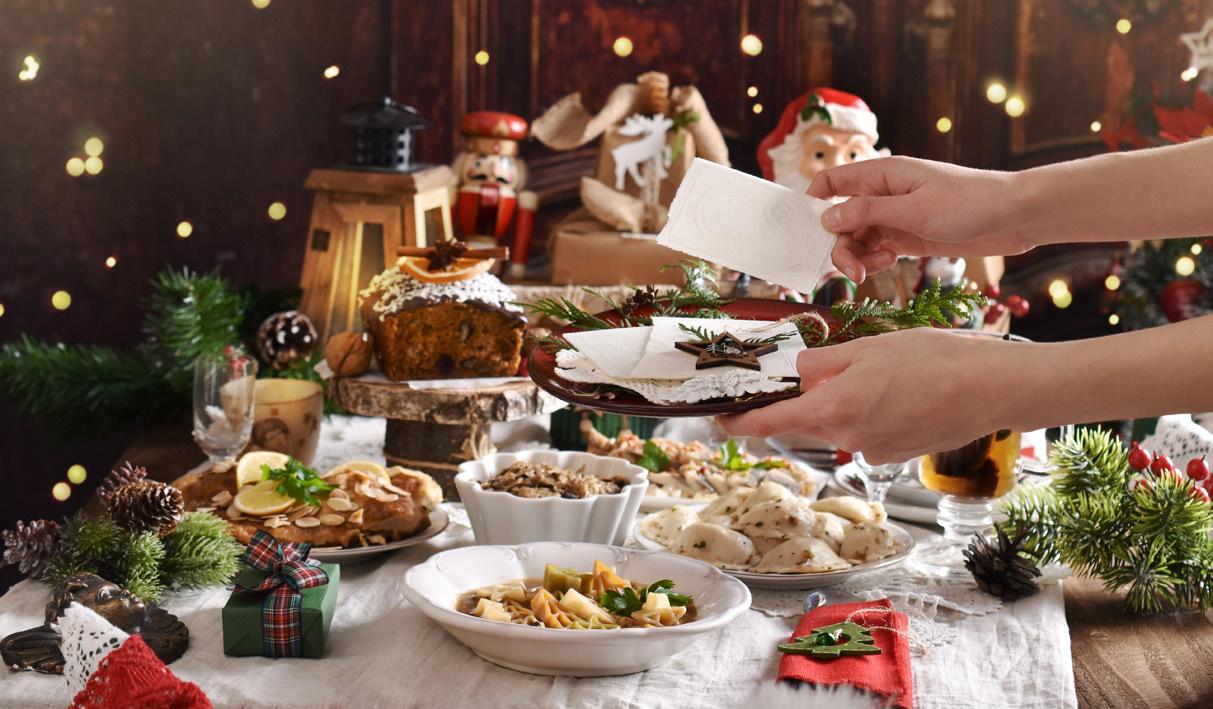
52 #foodsector
Monika Górka, Deputy Editor-in-Chief





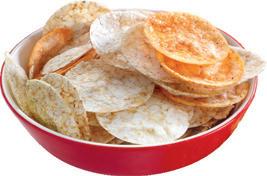

50 Less Fat % Extra Thin Non-Fried NEW PRODUCT! Non-fried brown rice chips, healthy snack for every occasion moonsy are full of taste, satisfying all customers needs Contact us via export department e-mail: Export@eurowafel.pl Phone: +48 33 870 35 71 EXT. 106 A snack for the whole family. No preservatives, no palm oil 50% LESS FAT NON-FRIED NO PRESERVATIVES GLUTEN FREE www.moonsy.pl
sages, roast meats. The kind of Christmas dishes was heavily affected by the region’s location and natural riches. People would eat groats prepared in many ways, as well as sundry dishes made of fish caught in the Masurian lakes.
In Central Poland, in the past as well as today these fasting dishes have been present on tables: cabbage with peas, cabbage with mushrooms fried in oil, herring, noodles with poppyseed, fruit soups, mushroom borsht, as well as pierogi (dumplings) with cabbage and mushrooms.
In Podlasie, the Christmas Eve table bore such dishes as fasting borsht with mushrooms, fried fish, different versions of herring, millet groats, buckwheat groats with mushroom sauce, raspberry stalk compote, or noodles with poppyseed.
In Silesia, the foremost Christmas Eve foods include fish head soup, peas with cabbage, dumplings with mushrooms, and dried mushrooms fried in oil. Of course, potato dishes cannot be absent too. Another one is panczkraut, also known as ciapkapusta: potatoes with sauerkraut, well mixed and spiced. Additionally, such sweets as gingerbread
hearts, Bytom pebbles, or Legnica baubles are popular in this region of Poland.
In southern Poland, strict fasting has always been in force on Christmas Eve. Formerly, what Highlanders would have on that day included potato-and-flour noodles, kłuta, or overcooked cabbage with potatoes, wholemeal flour cake with quark, as well as boiled fava beans or peas. Sometimes, bread with honey was eaten as well. A Highland Christmas Eve dinner consists of several fasting dishes. The best-known ones include mushroom soup, pickled beetroot borsht with beans, barley or oat flour soup, sauer-
kraut with peas. Noodles with poppyseed and honey, noodles with plums, or dumplings with cabbage are also a must on the tables.
Certainly, a Christmas Eve favourite of the Podhale highland region is bukty, potato noodles. Another popular item is moskole –a typical dish of the regional Podhale cuisine. These are tray-baked potato pancakes served with broken-up sheep cheese and molten butter. Many Podhale homes serve cabbage and kłóty, or cabbage with potatoes. Highland kołatanka, a dish made of boiled barley groats mixed with sliced swede and honey poured on it, is often present on Christmas Eve tables. The sweetness of the dishes is ensured by honey and prunes. The latter are also added to the fasting kwaśnica sauerkraut soup. An interesting custom from Podhale is to have the Christmas wafer with honey.
Christmas customs – interesting facts
All across Poland, there are a lot of Christmas customs. For instance, in many Pomeranian homes, following an interesting tradition, the hostess must not stand up from the table during the Christmas Eve dinner. The host has to handle everything.

The unique Christmas atmosphere becomes infectious long before the first star shines in the sky.
54 #foodsector
In Podlasie, the belief was that if you get up in the morning on Christmas Eve, you will have no health or fitness problems throughout the upcoming year. And depending on whether the first person to visit the house is a woman or a man, the cow would give birth to a heifer or to a bull.
In Podhale, the Christmas Eve table was often wrapped around with a chain, to keep the livestock in the homestead and to protect the family against death of any members. Interestingly, an important thing that day was… spoons. None of them could fall from the table, as this might portend death, just like when there were fewer spoons on the table than the number of feasters. In turn, if there were more of them, that could herald the birth of a child.
In Upper Silesia, presents are brought by Baby Jesus; in every house, one should remember to leave a window ajar so that Baby Jesus could get inside and leave the gifts. Preparation of Advent wreaths is very

important to the Silesians. The wreaths have four candles, lit on each Advent Sunday.
In the Lublin region, garlic and honey were put next to the wafer, which was to ensure good health for the whole family. Interestingly, the number of dishes on the Christmas table differed from the other parts of Poland: there were seven, nine, or thirteen of them.
The unique Christmas atmosphere becomes infectious long before the first star shines in the sky. In many regions, holiday preparations start much earlier.
Christmas is one of the most anticipated holidays during the year. Preparations are in full swing in every home. The last shopping and… we can start cooking or baking together. And although there is a list of traditional Christmas dishes, every family has its own favourite recipes, secret ingredients, or peculiar culinary customs that it practices and passes down to the next generations: some of them completely traditional, others spiced up with a bit of modernness. However you like it.

55 #foodsector advertisement










The energy crisis directly affects the functioning of the trade sector
Last year, the trade sector faced new challenges, many of which will also remain in 2023. The issues coming to the fore include treating trade as a priority sector in energy supply, as well as providing access to resources ensuring uninterrupted operation of small stores, wholesalers and distribution centres alike.

It is necessary to take actions intended to provide tens of thousands of Polish micro-, small and medium enterprises with access to energy and thermal resources, at prices making it possible to purchase these resources without a risk of bankruptcy or a threat of loss of profitability that is already often hovering around the level of 1% or lower today.
In response to the industry’s appeals, an energy price limit has been introduced; this is a very good measure but it does not solve all problems. It will give some relief to the trade but will not bring any major slowdown of the growth of prices, since the limit only covers small and medium enterprises. Let us keep in mind that, apart from stores, the trade sec-
tor is comprised by wholesalers, distribution centres – the entire logistic systems. Sometimes, these are large companies, enormous cold stores consuming immense amounts of electricity, and the cost of the goods is also contingent on the costs of power to be paid by these larger entities.
From the consumer’s viewpoint, there is
58 #marketinsight
also a concern that exclusion of large establishments from this solution will increase the disparity in prices offered to discount stores and small shops. If prices of goods grow and large chains benefit even more from their negotiation capabilities, manufacturers will wish to make up somewhere for their expenses, such as the energy-related ones: they will probably translate such expenses to further growth of prices for smaller stores.
The lack of freezing of corporate gas prices is a similar problem
Another grave hazard to trade companies in the year to come is no gas price freezing for enterprises. The parliamentary act guaranteeing maximum energy prices for SMEs solves a part of the problem – though not all of it: lack of such support to large companies will also translate to growth of prices through growth of expenses, such as operating costs of distribution centres and logistics – but the absence of a similar safeguard for gas prices will hit all entrepreneurs hard. In such a situation, one should expect a considerable increase of heating costs and more (also applicable, among others, to the bakery sector). In such situations, the plea by Adam Abramowicz, the spokesman of SMEs, for the gas price regulations to also cover the sector of small and medium enterprises, is fully justified and worthy of support. Without such support, we will watch a significant deterioration of
profitability of small and medium enterprises which will be burdened with a whole range of new expenses since the New Year, including the gas price growth mentioned above or increased wages. In the current situation, the increase of costs may significantly worsen the profitability of enterprises, leading to bankruptcies in extreme cases, as well as to growth of retail prices. The Polish Chamber of Commerce has appealed for months to treat trade as an energy-intensive sector and spoken of its strategic significance to the economy –which could have been distinctly felt during the pandemic.
The rate of shoplifting is on the rise
In the trade industry’s opinion, a considerable problem is the increase of the threshold for the offence of theft from PLN 500 to PLN 800, which is absolutely unacceptable. In fact, this is a nod towards thieves, met with a very negative public perception, not just in the trade environment – especially in view of the economic crisis affecting most Polish
people. The increase of this threshold strikes a blow to honest entrepreneurs. Even the previous amount of PLN 500 had been considered grossly excessive, and the change to PLN 800 means consent to and encouragement for theft. Each year, every small store loses several dozen thousand zlotys’ worth of goods due to shoplifting: an equivalent of several to nearly twenty pallets. The increase of the threshold puts new products at the list of goods stolen without the threat of trial and raises the crime threshold by 60%.
According to research by Crime&tech and Checkpoint Systems, the food industry is the most exposed to theft in Poland (accounting for 50.4% of all robberies). The percentage of losses for Polish retail trade companies amounts to as much as 1.5% of the turnover. It is also worth mentioning the share of offenses affecting the sector of DIY stores (5.6%) and fuel stations (2.6%). Retailers record an above-average level of losses, as well as more cases of robbery and shoplifting in the winter season, caused by attractively packaged Christmas products, shorter

59 #marketinsight
Another grave hazard to trade companies in the year to come is no gas price freezing for enterprises.
daylight hours, a possibility to hide the stolen goods under clothing, higher personnel rotation, and a greater number of customers. However, due to such factors as the continuing high level of inflation, translating into increasingly hard economic situation of the Polish people, experts predict that the number of thefts will be just as high in the following months of 2023.
According to the current regulations, most cases of shoplifting are minor offenses threatened by a penalty of a fine. We are fully aware that a register of theft perpetrators has been introduced, yet we disapprove of this change, as the register alone will not solve all problems. It is obvious these changes will cause the losses incurred by stores to grow several times, while thieves’ profits will increase.
Maintenance of the zero VAT on foods will be favourable to trade.
On the other hand, the maintained 0% VAT for food for the following six months is certainly a good thing. However, one should definitely not overestimate its effect on both the inflation level and the purchasing power of consumers. Pursuant to our assessments from early 2022, the effect of reduction of the VAT for food was nullified as early as March by the increased inflation. With such an enormous inflation, this is but one cost element, incapable of structural change of the economic situation.
A satisfactory compromise concerning the deposit return scheme project
From the viewpoint of trade, an important matter was the works on the draft deposit return scheme in Poland, entailing a difficult dialogue. The change we had expected was removal of single-use glass from the draft deposit return scheme, of which we have already been speaking for a long time – stores are incapable of storing single-use glass packaging; moreover, collection thereof in Poland has already reached a high level (around 70%), so introduction of this component into the deposit return scheme and forcing stores to conduct it would be neither rational nor necessary and would additionally hamper the functioning of trade establishments, especially the smaller ones.
A step in a good direction is the increase of the minimum area of stores to which the deposit return scheme will be mandatory, from 100 to 200 m2. We have called for setting this threshold at 500 m2. Therefore, we hope there still is room for discussion here, since our position results from our knowledge of practical functioning of the industry and its limitations, and we do not postulate this value at random.
We are glad the postulates of the industry have been taken into consideration, especially concerning the single-use glass packages, and we hope for further dialogue, so as to make
the system friendly to the environment, the trade, and the customers.
Regarding the deposit return scheme, another important thing is that it should take account of the peculiarity of the trade structure in our country. From the viewpoint of a local store, most important are the principles of package collection by operators of the system – in particular, the minimum collection frequency. This is particularly important for small town or village stores. Operators should be obliged to collect several times per week, so as not to make the local stores excessively burdened with storage of packages.

Implementation of the Omnibus Directive
Another change on the Polish market is the new mode of organization of price information, intended to prevent artificial increases. Since 1 January 2023, regulations concerning the implementation of the Omnibus Directive, aimed at increased protection of consumer rights in online trade, have come into force. Consequently, the current manner of price presentation has changed. It also affects price tags at trade establishments and traditional advertising folders, and it complicates the marketing communication.
60 #marketinsight
The maintained 0% VAT for food for the following six months is certainly a good thing.
Donations need to be exempt from tax
We point out an everyday problem to many Polish people in need, benefitting from permanent or temporary aid provided by charity organizations and entrepreneurs willing to help them. Polish VAT regulations require a donor transferring products to a public benefit organization to pay VAT on such donations. The only charity-related VAT exemption applies to easily perishable foods and certain IT equipment, as well as a narrow scope of coronavirus prevention products –such a catalogue of articles is but a small part of what is needed. Unfortunately, this makes utilization of unsold items cheaper than giving them to those in need. These regulations surely need to be changed so that Polish entrepreneurs could have an economically viable option to donate to people in need.


61 #marketinsight
Since 1 January 2023, regulations concerning the implementation of the Omnibus Directive, aimed at increased protection of consumer rights in online trade, have come into force.


Trade franchise just for the modern times
The functioning of traditional trade establishments is becoming increasingly difficult. Rescue may come in the form of franchise chains dynamically developing on the Polish market.
Under the current conditions of constant growth in the running costs of a store, an increasing number of retailers are making a difficult decision to wrap up their business. Although the number of retail grocery stores on the Polish market has been shrinking yearon-year for many years, everything indicates this process will now accelerate markedly. If this continues, the structure of the FMCG trade market in Poland, which stands out among other European markets dominated by so-called modern retail distribution channels (discount stores and supermarkets), will slowly become similar to markets of the neighbouring countries.
The twilight of individualism
Threats to traditional trade are usually perceived as those resulting from the rapid growth of energy prices: electricity, gas or coal. After all, a grocery store is energy-intensive. Cooling equipment and freezers, lighting turned on for more than a dozen hours a day, heating throughout the opening hours of the establishment in winter, and air conditioning operating for just as long in summer – all of this means enormous expenses. It seems impossible for many retailers to handle the costs. All of this is compounded by constantly growing employment costs, derived from the growing minimum wage, and the lingering legal chaos that seems insurmountable to many store owners. Neither the plans of the government nor those of the European Commission bring much hope in this regard. All these factors force small entrepreneurs to make difficult –for themselves and to local communities alike – decisions to shut down their trade establishments.
This process can be inhibited by franchise chains, very resiliently operating in Poland. Especially that their organizers are taking more and more actions aimed at supporting individual retail members of their chains. Such programmes are in place at chains related to the largest wholesale distributors, such as the Eurocash Group or the Specjał Capital Group, and organizers of other franchise chains, smaller but usually very numerous. Therefore, prior to deciding to shut down the store, it is worth taking a look at the opportunities created by individual franchisers. Such opportunities may bring hope to many trade establishments threatened by the consequences of the hard times.
Better trade conditions
Jan Domański, the spokesman of Eurocash Group, an organizer of franchise and partner chains associating more than 16,000 independent retail stores, stresses that in today’s difficult times, the support from the franchisers that local stores can count on should be regarded on three key levels.

The first one includes actions aimed at improving the functioning of stores associated in a chain – in their local environment. Above all, this means ensuring the price competitiveness of the store through the scale of purchase performed by the franchise chain. This also ties into the increasingly better adaptation of the trade offer to local needs, as well as to efficient utilization of loyalty programmes and IT tools, and, above all, to increasingly efficient negotiations with suppliers and producers. These are all part of a strategy aimed at ensuring attractive prices and modern marketing tools to support com-
petitiveness on the local market.
Krzysztof Tokarz, the President of the Specjał CG, notes that the interest in Specjał’s chains is not only maintained but outright growing. With the scale of support to franchisees, an increasing number of fully independent stores, seeing obvious benefits, want to join the structures of Specjał’s trade chains. This is about the broadness of the offer and the price of the products, just as it is about the logistical efficiency and possibility to benefit from a range of IT solutions supporting the functioning of a store. Low, competitive prices are possible with Specjał thanks to purchases of large batches of goods anticipating the inflation..
In search for lower costs
According to Jan Domański, the second level of support to retailers responds to the most serious threat to retail establishments, i.e., the rapidly growing level of store running costs. He believes that, admittedly, upon the latest decisions to freeze the level of electric power prices for small and medium enterprises, the hazard to stores in this aspect has subsided a bit. However, there are other cost items franchisees have to face. These are, above all, wage expenses – the increase of the minimum wage entails the necessity to raise salaries of employees. And yet wages in the trade sector have already ceased to be the lowest in the Polish economy several years ago, whereas the wage expectations, in view of the inflation, will be even greater next year. In such a situation, the Eurocash Group’s support to retail partners aims at reducing the costs of other elements of store functioning, so as to enable appropriate salary rises. This
64 #marketinsight
Witold Nartowski, Journalist
is both about better utilization of supply logistics and implementation of sale process digitalization that will reduce other store running costs. Simultaneously, this is related to appropriate training in this area to retailers – both in the form of direct support through the Eurocash Academy of Skills and through different online platforms.

Specjał also endeavours to support retailers as far as practicable, both in the area of advisory and training, e.g., in the form of the Entrepreneurship University organized by the Group, and through broadly understood financial and technical support. This applies, above all, to concerns about the growing energy costs, whereas the support to retail outlets loosely connected with Specjał is different than to franchisees. In the former case, the assistance is primarily of consulting nature. Retailers may count on the company’s knowledge concerning possibilities of different kinds of actions aimed at the reduction of store running costs, yet direct involvement in these actions is relatively limited. “The case is different with our franchisees. With them, we do not shy away even from financial and technical involvement connected, for instance, with the assembly of photovoltaic panels, thermal insulation of the store, introduction of energy-saving devices thereto, etc.,” says President Krzysztof Tokarz.
This is confirmed by Marian Zych, the CEO and Deputy President of the Board of the Livio chain owned by the Specjał Capital Group. Not only does the legal department of the chain follow the current options to acquire subsidies or external grants in support of investments aimed at reducing the energy intensity of stores but also helps retailers applying for money for such goals to fill in the relevant documents and applications. However, this is not all, as a franchisee can also count on direct financial support, or rather on a kind of a zero-interest credit. Specifically, the franchisee receives quarterly payments
from the chain, on account of providing services to producers, which had formerly been often referred to as “retro pay”. The chain has decided that payment in advance for such servicing is possible for the upcoming two or even three years. The amounts reach up to several hundred thousand zlotys, and the retailer will pay them back through submitting payments to the chain on account of servicing within the agreed period. Of course, in such a case, each franchisee enters into an individual agreement in this regard with the chain. “I think an offer built in such a way has a considerable impact on the current increase in the retailers’ interest in participation in the chain. We have planned the number of stores belonging to the chain to increase by almost 400 this year, and yet we already have about 780 submissions,” Marian Zych says.
Smaller franchisers strive to support their partners in these difficult times too. Małgorzata Pogorzelska, Purchase and Promotion Director at the Eden chain associating more than 1,000 retailers, tells us that a franchiser has signed framework agreements with the energy supplier, enabling acquisition of electricity at prices lower by more than a dozen percent than those prevailing on the market.
Legal and IT support
The third level of support for franchisees among those mentioned by Director Domański ties in with the previous two in a sense, as it includes actions aimed at the creation and utilization of platforms for exchange of information and knowledge, not only between the franchiser and its franchisees but also directly between the retailers themselves. Mutual communication concerning the ways to handle difficult situations is hard to overestimate. This, however, entails the creation of tools conducive to such kind of exchange of information. In such a variable legal environment, tools enabling reduction of monitoring costs of the amend-
ments in the regulations and of adaptation thereto are invaluable as well. “There can be a lot of such problems to be explained or solved, and accountants or lawyers of small companies are not always able to grasp them early enough and to prepare for them comprehensively. It would suffice to mention the VAT rate changes, the implementation of a new directive regulating the communication of promotional prices, or the deposit return scheme solutions which are being designed right now. In such situations, our partners can count on support from the Eurocash Group,” Jan Domański summarizes.
Krzysztof Tokarz, on the other hand, stresses that everything seems to indicate that the growing interest in participating in Specjał’s franchise chains also results from the possibility of using the increasingly modern e-Hurtownia shopping platform, or the offer of mobile applications for customers of stores associated in the chains, as well as the offer of IT solutions which make running a store easier. “These are, in my opinion, the most important causes of the will to join our franchise chains, other than the direct support and the level of our prices,” president Tokarz adds.
Of course, Żabka, the most numerous and most innovative franchise chain in Poland, looks different against this background. Here, the growth of energy costs is borne by the franchiser, or the Żabka Polska company; as early as a year ago, it announced a new energy policy, commenced the analysis of possibilities of acquisition of renewable energy at all locations, and started implementing new solutions in more of the chain’s stores. However, it should be kept in mind this is not a solution for owners of all traditional trade establishments, as the chain is the owner of almost all premises where its stores operate, and the object of the franchise is the system of store management under the Żabka sign. Unless the retailer makes a bargain with the chain concerning the resale of his store…
65 marketinsight
How the export activity develops nowadays? What challenges stay before producers in 2023?
First of all, I would like to express that we had a very successful year in 2022, despite many negative developments on a regional and global scale. We achieved this success not only in the local market but also in the global markets. Therefore, we can say that we left behind a successful year in terms of export activities.
As I have just stated, as a result of the negative developments experienced last year, there were some serious fluctuations in the markets. As it is well known, we felt the most obvious effects of these developments primarily in the supply chain. However, thanks to our highly skilled supply chain team, we did not have any problems with access to raw materials. Of course, this has allowed our current partners to increase their trust in us, and therefore, it has helped our sales team find new partners and increase the sales volume of the company. I would like to take this opportunity to thank the sales and purchasing teams for their great efforts for the growth of the company during this difficult time.
Although the effects of some negative developments experienced in 2022 have started to decrease, they are not completely out of our agenda. In fact, we will continue to feel the effects of some of them even more in 2023. As it is well known by everyone, an economic recession is prominently included in the forecasts of international financial institutions and economists for 2023. As Turka Group, this issue was among our priority agendas in the budget processes for 2023. We always take this reality into consideration in terms of the trajectory of our sales and the control of our expenses and we make our plans accordingly. In this context, necessary assessments in terms of measuring and managing our current risks are made under the leadership of the finance unit with the contributions of other relevant units, and necessary hedging transactions are carried out. In this context, it is important both operationally and financially for the manufacturers to measure their current risks well and to take the necessary positions in order to be affected by the fluctuations expected to be experienced in the markets to a minimum.
Maintaining growth
Interview with Olgar Suner, Deputy General Manager at Turka.

Lastly, I would like to touch on the changes in customer expectations. Customers are getting more demanding, for both faster delivery and low prices with value added products. As manufacturers, we need to be well-prepared for these as well and respond to customers’ expectations.
Your development plans are...
Our clients are comprised of predominantly three sectors: retail, foodservice and B2B. Our products are available in more than 60 countries and popular among the customers of biggest supermarket chains in Europe and MEA. We are planning to expand our production capabilities in other continents in the years to come apart from Poland and Spain facilities in order to benefit from logistics advantage.
Other than that, we focus on innovative products in 2023. For the coming fairs we want to introduce our new innovative products to the market.
Please tell us about your export offer. For what is it appreciated by consumers?
Our strategic locations both in Poland and Spain allow us to cater to over 60 countries and ensure fast delivery in a changing global market. We can offer competitive prices to our customers who ask for private label. With the support of our marketing team, our customers will be able to configure and design the scale, weight, flavor and package design as they wish. We are always proud of offering our clients fast and tailor-made products with the help of our highly qualified staff.
Beyond the logistical advantage, another advantage of our production in two different EU member countries is that it allows us to access different raw materials and energy sources, which allows us to hedge our risks. Our effort to meet the demands of our customers and establish a long-term business relationship with a customer-oriented, fast and flexible service approach ensures customer satisfaction and naturally success.
How important is “green” development for Turka company?
In order to follow international standards and compete globally, Turka Group companies regard implementation of ESG strategy as inevitable in order to develop and maintain a strong, trusted brand and reputation, both in absolute terms and relative to peers.
Environmental sensitivity is a criterion that we focus on highly both in production processes and in supplier selection. Strict implementation of this principle is among the top priorities of the company’s top management. It has been adopted as the basic policy of our company to continue our productions with clean energy sources as much as possible. In this context, we work on solar energy to meet all of our energy needs in one of our production facilities.
Thank you for the interview.
66 #interview
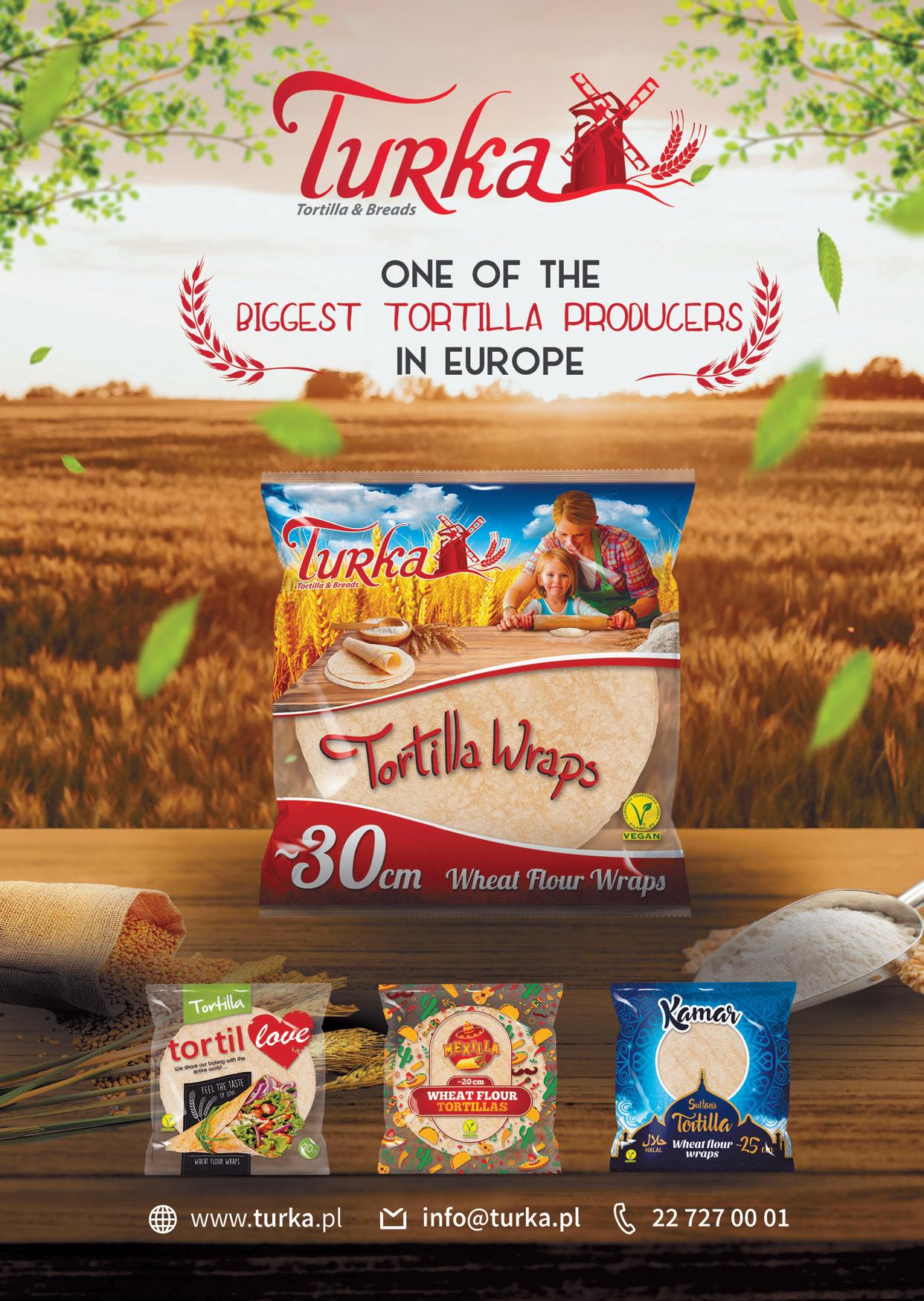
These are questions many marketing professionals try to answer for their superiors before they decide to participate in a fair.
The answer is simple. Yes, every trip to a trade fair is worth the effort. Why? Quite simply, through participation in fairs, we, above all, create the image of the company and the brand. A good choice of industry fairs for our exhibitors helps them carry out direct talks with current and prospective customers, as well as see the products of competitive companies. Whatever a contractor sees with his own eyes and takes in his hand will surely be much better received than if seen on a computer screen, in a folder, or in a catalogue.
At fairs, many marketing tools are also presented at one place. Moreover, fairs are accompanied by various lectures, conferences, or presentations, providing a picture of current trends in the given industry. It often happens that fairs are attended not just by companies but by cities or states, thus promoting the region from which the given product originates.
Fairs also ensure direct contact, which is indispensable and allows one to answer specific questions about a product which can be seen and often tasted, as well as to discuss potential terms of cooperation or supply on site. Studies performed in Australia at the Fair Association have proven that expenses from the company’s marketing budget, spent on participation in a fair, bring a twofold profit.
Concluded transactions discussed at the fair require no additional efforts from the seller, as they can be finished on site.
Our company, Maxpol, has already been involved in professional organization of international fairs for 33 years and we provide comprehensive services to exhibitors. There are few companies in Poland that would combine organization with stand building. To our exhibitors, we offer
Is it worth participating in fairs?
Many corporate decisionmakers wonder about this question before signing an agreement of participation in a fair. Will the event pay for itself, will we acquire new customers, will we reinforce our contacts with contractors, and how will we present the product promotions?
a full- service package: from space rental to stand building to all kinds of auxiliary services, such as hiring of hostesses or assistance in handling accommodation or air travel. We also offer full advertising activities in fair catalogues as well as in industry magazines in a given country. Fulfilment of the needs of our exhibitors, care for their comfort, as well as responsibility for the trade success of participants in the events we organize – these are the key objectives of our company. Nowadays, the world of fairs has no limits to us. We organize fairs in virtually all continents.
Our effort and the endeavours of the entire team in everyday work are noticeable to individuals, companies and organizations we cooperate with. We hold many diplomas and distinctions from our exhibitors and foreign partners. We have been a member of the Polish Chamber of Exhibition Industry since its establishment. We hold the title of the Leader of Fair Services and a recommendation from the Polish Chamber of Exhibition Industry. We are very pleased by the expressions of kindness and recognition, as well as by declarations of continued cooperation. We respect our exhibitors, fulfil their requirements concerning the appearance of the stand, and arrange for many issues connected with an exhibitor’s participation in a fair. We have a flexible approach to all matters ordered by the exhibitor.

The considerable potential and experience of our company allowed us to survive the two years of the pandemic, so hard for the entire exhibition industry, and now we continue our fair organization activities and develop them further. We hope for continued development of the exhibition industry, as well as for new places on the world map where we would be present together with our partners.
With this positive message, we cordially greet all readers of the Food From Poland magazine.
68 #tradefairs
Małgorzata Ryttel, President of the Board, Maxpol
Trade Fair Service Leader with 33 years of Experience


complex organisation of trade fairs around the world designing stands for individual exhibitors and national groups preparing and assembling stands

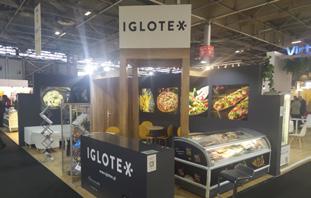



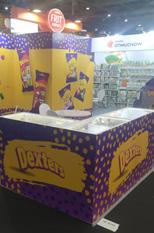


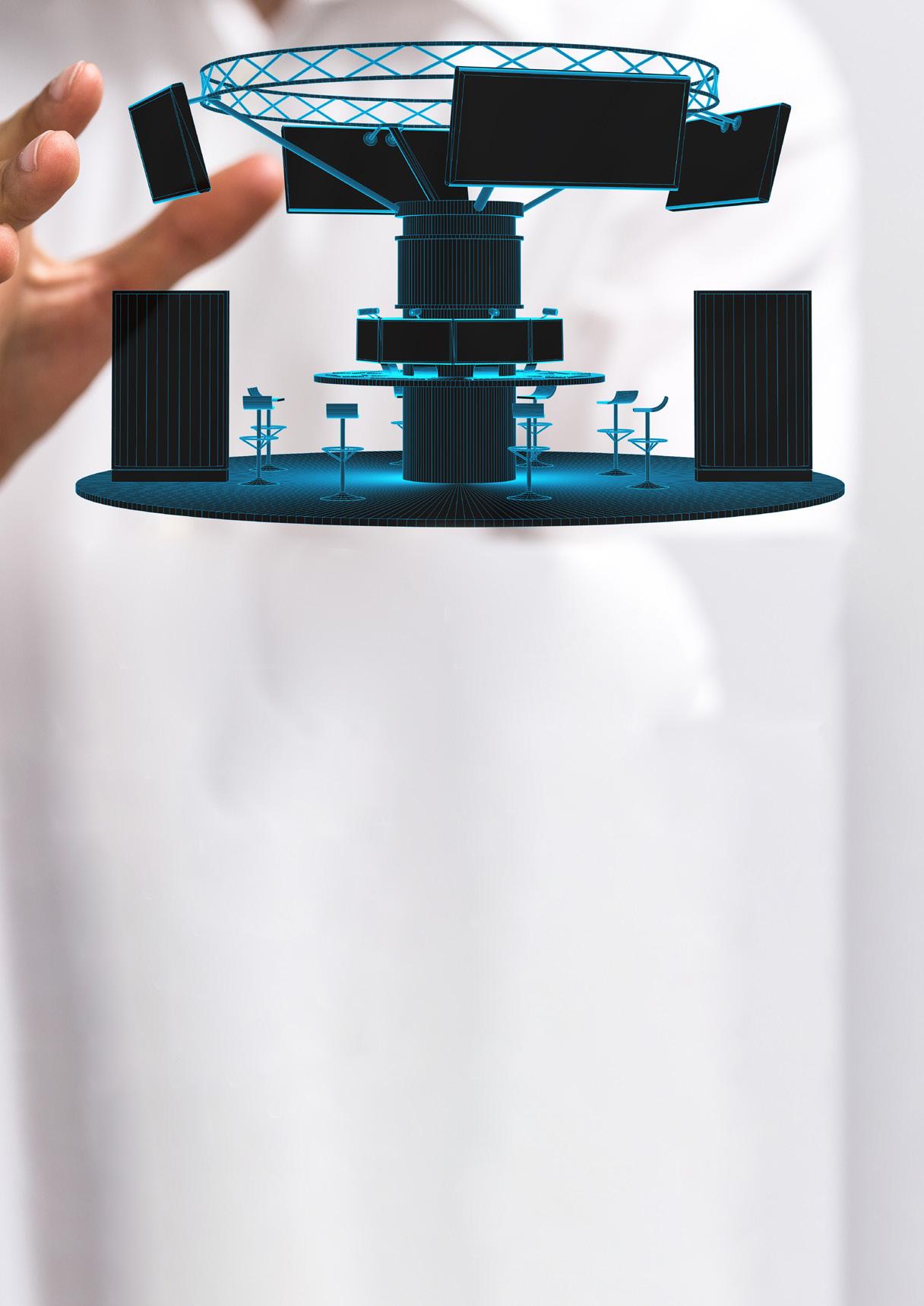
MAXPOL
PPH MAXPOL SP. Z O.O. Rolnicza 251, Dziekanów Leśny, 05-092 Łomianki (22) 506 41 11 (22) 506 42 22 maxpol@maxpol-targi.com.pl maxpol-targi.com.pl INTERNATIONAL
IFE Great Britain London 20-22.03 ISM JAPAN Japan Tokio 12–14.04 NATURAL & ORGANIC Germany Dusseldorf 19-21.03 PRODUCTS EUROPE Great Britain London 16-17.04 ISM Germany Cologne 23-25.04 SEAFOOD EXPO GLOBAL Spain Barcelona 25-27.04 FOOD AND DRINK EXPO Great Britain Birmingham 24-26.04 TUTTO FOOD Italy Mediolan 08-11.05 SIAL CANADA Canada Toronto 09-11.05 VITAFOODS EUROPE Switzerland Geneva 09-11.05 INTERFOOD AZERBAIJAN Azerbaijan Baku 17-19.05 SWEET & SNACKS EXPO USA Chicago 22-25.05 PLMA’S WORLD OF PRIVATE LABEL Netherlands Amsterdam 23-24.05 THAIFEX Thailand Bangkok 23-27.05 FOOD AND BEVERAGE WEST AFRICA Nigeria Lagos 13-15.06 SUMMER FANCY FOOD SHOW USA New York 25-27.06
TRADE FAIRS IN 2023
forwarding and customs clearances flights and accommodation bookings Złoty Paragon 2015 Złoty Paragon 2015
The Toruńskie Wódki Gatunkowe has been producing alcohol for almost 140 years! What is the recipe for success? What distinguishes the factory and your spirits?
Toruńskie Wódki Gatunkowe is primarily people, their long-term experience passed down through generations and great commitment to work. We are one team with the same goal – care for the high quality of our products. Staring from the selection of the list of suppliers, through the process of liquor production, to packaging design – every detail is important to us. We also draw all the best from nature – we have our own deep water intake, we buy the best raw materials from Polish producers and we create our own macerates, which gives our products a deep, original taste.
What trends dominate on the alcohol market in 2023 and how does the offer of Toruńskie Wódki Gatunkowe fit into them?
The latest trend that we observe on the alcohol market are regional and natural products. A visible direction is also the search for unusual flavor variants, which is why our alcohols include pure vodkas made of spelt and potato spirits or flavored vodkas with unusual combinations, such as raspberry with chilli. Currently, we are still looking for different solutions, like for exaple juniper with coffee. Our customers are more and more willing to choose their own brands, which we prepare together, even in smaller volumes.
Alcoholes of the finest quality
Interview with Grzegorz Grabowski Managing Director at Toruńskie Wódki Gatunkowe.

Quality is something you put first. Are customers are still faithful to quality despite rising prices? How do polish people view premium categories and what is the attitude of foreign consumers to high-end liquors?
In terms of pure vodkas, the premium category has its value, while in flavored alcohols it is still a journey and a search for novelties. Customers want to be surprised, but at the same time they expect safe products in the premium space. Toruńskie Wódki Gatunkowe can boast of such products - in the case of premium vodkas, it will be, for example, Wódka Jednorodna Spelt, awarded a gold medal in the Warsaw Spirit Competition, or Retman Vodka Crystal and Strong, which received a silver medal in the San Francisco World Spirit Competition. Both Polish and foreign consumers look for value in tasting alcohols, combine them in foodpairing and mixology, discovering new flavors and the culture of drinking vodka.
Please tell us about the production facilities and original recipes of your drinks.
The high quality of the spirit is due not only to carefully selected raw materials and experienced staff, but also to the 5-column rectification apparatus, unique in Europe, produced by the Italian company Mussi. Selected spirits (potato, spelled and other cereal spirits) are kept in dedicated tanks. All macerates are made on the basis of our original recipes with the use of fruit and spices. Together with our clients and on their behalf, we discover a new area in combining various spirits in pure vodkas.
70 #interview
Is there room for innovation in the production of traditional, craft spirits?
It is a forge of innovation! We recall forgotten spices, varieties and types of fruit, we combine them with each other. There are also different types of honey. We focus on the classics, offering flavors such as plum with clove, cherry, slivovitz, but also on modernity (raspberry with chilli, juniper combined with coffee).
Alcohols produced in Toruń were known in Europe, Asia and Africa already before World War I. What range do you currently have, in which countries are your drinks particularly popular?
We are challenged by the whole globe - mainly Europe and the United States, but in the spirit of “a drop hollows out a rock”, we also develop projects in the Asian direction. This is a long-term action, but we are already seeing a large increase in interest in Polish spirits.
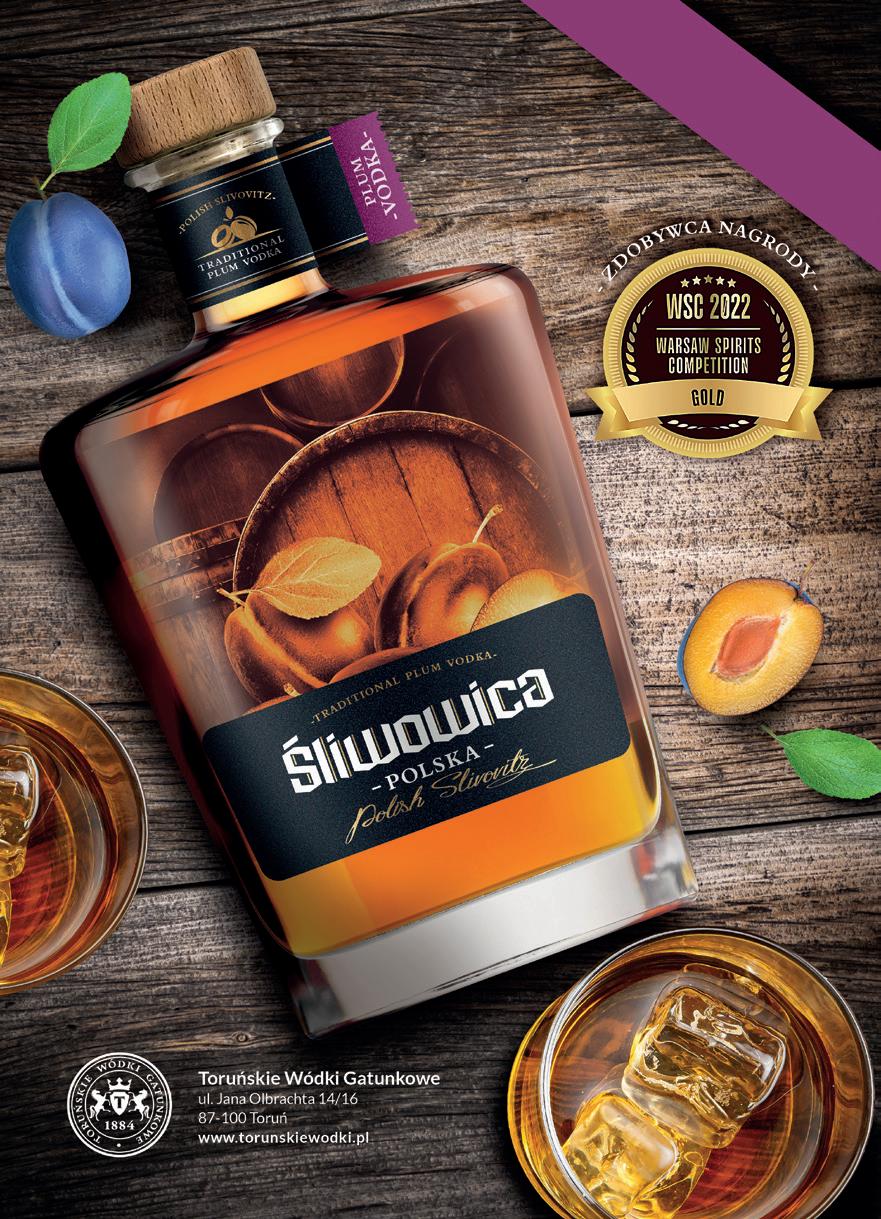
Please tell us more about your export offer.

We are open to cooperation with foreign business partners, to whom we can offer the sale of our products and our brands, as well as private brands (“private labels”) owned by a foreign distributor.
We provide comprehensive export services: from preparing product labels for a particular country, preparing the necessary phytosanitary documentation to the organization of transport and customs procedures. We deliver the selected goods literally to the provided address.
We help to implement clients’ projects by providing them with our spirits as a composite for production, i.e. spirits in tanks or sold in IBCs.
How to meet the challenges brought by 2023 - please comment from the manufacturer/exporter.
The year 2023 greeted us with a crazy increase in the prices of dry materials (bottles, labels, closures, collective packaging), a five-percent increase in excise duty on the domestic market. We have decided to implement projects closer to the client - we create micro and macro local brands with the participation of components and recipes from various parts of Poland and the world.
What are your plans for the coming months and years? Investments, news or maybe some changes in the portfolio?
For Toruńskie Wódki Gatunkowe, 2023 will be marked by new products and investments. Soon, a new line of vodkas from the Toruńska brand will be launched, which has undergone rebranding of the packaging - standard flavors will be available in a new bottle with a changed label. Our other flagship products will also be refreshedŚliwowica Polska and Hubertówka Leśna. There will certainly be new flavors under these brands. We are also preparing to expand and enrich the business offer addressed to companies and to develop the project of individual private labels with small volumes, e.g. by introducing personalized packaging.
Thank you for the interview.
71


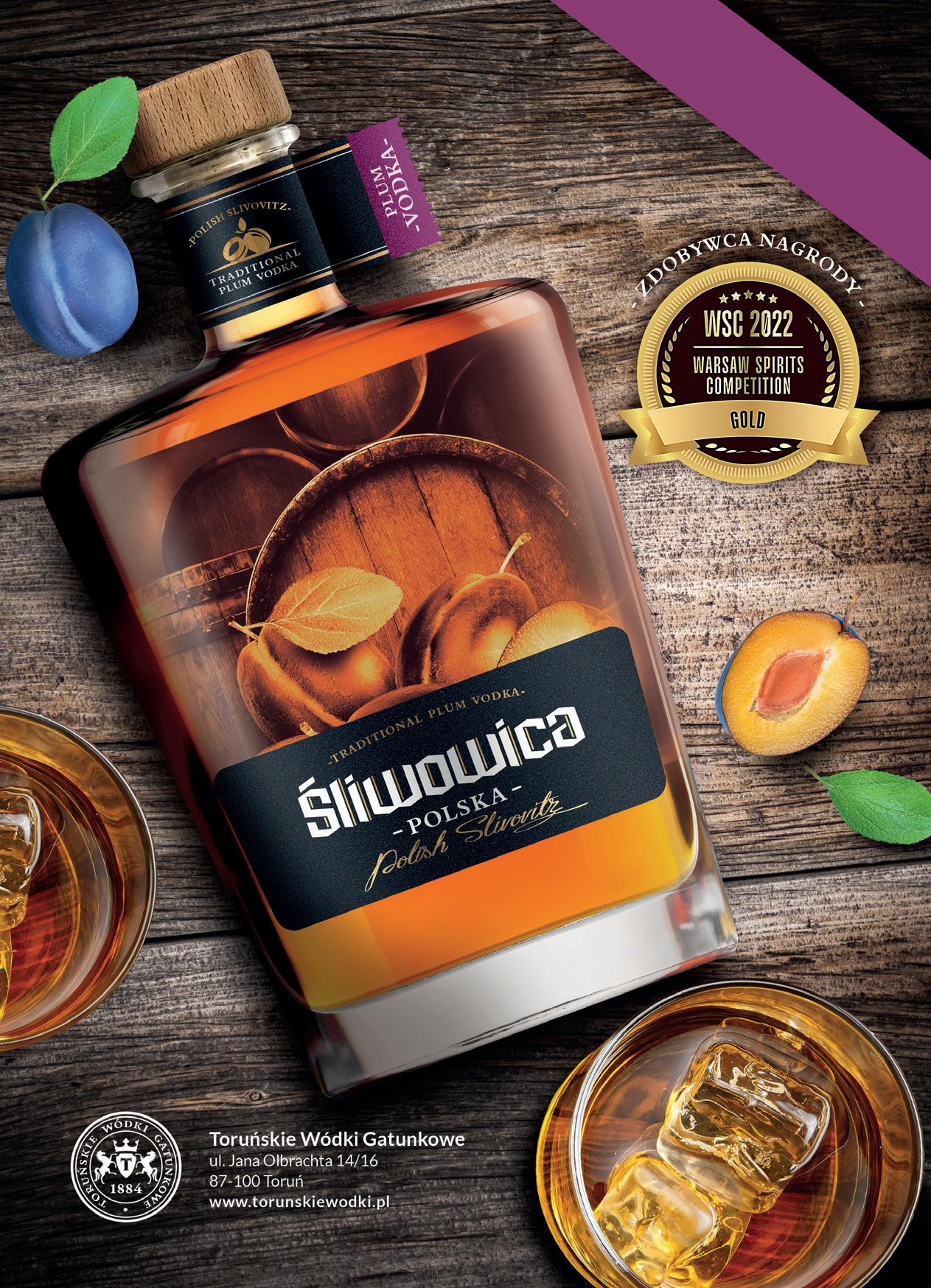

The past year has set many challenges to Modern Expo… How could you sum up the year of 2022, were there any successes in spite of difficulties?
In this context, I think we should go back to the roots. To something people sometimes call the spirit of the company. I would not like it to sound like a cliché but Modern Expo is a very nonstandard organization, for at least two reasons. First, each problem we encounter is relatively quickly transformed into a market opportunity. Secondly, we are helped in this regard by a unique organizational culture. In case of ME, this is not just about pictures and slogans. For many years, we have been putting great emphasis on this component, and it is paying off today. We follow specific, transparent principles and values. The past year must have been very difficult for everyone, or indeed traumatic. To us in particular, as we are a Polish-Ukrainian enterprise. In the human aspect, it is incomparable with the previous ones. From the business viewpoint, however, this is just another stage of our transformation. In one fell swoop, both the Russian market and the Ukrainian one were lost to us, so we had to try to acquire new areas quickly. And, of course, we made it. The case was similar with the COVID-19 pandemic, and there had been other important turning points before that. We have been present on the retail trade market for almost 30 years and we are really not easily surprised.
We create retail new
Interview with Bogdan Łukasik, CEO at Modern Expo.

What specifically is the secret to your success?
Success is a dangerous word. A lot of things depend on the viewpoint. Modern Expo is an organization with hundreds of millions of euros of revenue, hiring more than 2,500 employees, with a very good profitability. Is it success? Or it is just due to the fact we are a group that includes such entities as Mint, designing and implementing innovative SMART systems, or Squares, specialized in designing retail spaces and creation of new store concepts? Such a development of competences may be deemed an important achievement, just as the fact that we sell to several dozen countries and occupy the dominant position in many areas of shopfitting. To me, success has a slightly different meaning. It is manifested by the satisfaction of our customers and the fact we have been cooperating with many of them for years. Here, I will point out not only the largest retail chains, such as Żabka or Carrefour, but also manufacturers of the FMCG sector, for whom we have an immensely interesting proposal from the area of POS. I cannot omit Allegro, to whom we provide parcel terminals. This final case might be the best illustration to my definition of the success of Modern Expo. This project is partly a result of the pandemic and the enormous growth of e-commerce. To Modern Expo, this was a real test of flexibility and of the skill of quick acquisition of new competencies, not just in the context of design of a new product, completely different from the previous ones, but, above all, in the area of services accompanying the network building. Today, I can boldly say this contract opened up completely new opportunities that we are currently developing; an increasingly broader package of services for retail trade. We call it “providing peace and calm”, as we are indeed currently able to generate value for our customers of a completely different nature. And this is a real success.
What services do you offer to foreign markets? Do the offers differ between countries?
Of course, every country has its own retail customs and our flexibility is an invaluable asset in this case. Even such seemingly homogenous markets as the German and Austrian ones differ in terms of consumer habits, the level of technological advancement, or the general approach to retail space. But I think this is a good opportunity to pay attention to the general trends, powerfully entering worldwide and lastingly reorganizing the trade, regardless of the country or continent. For instance,
74 #interview
this is the case with development of convenience stores. Please note that such establishments had been just an addition to the market as late as several years ago. Today, they comprise a great consumer laboratory of enormous importance. These points are a place of all-around testing of customers and search for an optimal formula of the so-called third place – a fixed point of a day, apart from work and home. This is an extremely significant phenomenon, undergoing changes all the time. Thanks to many years’ cooperation with Żabka, Modern Expo has a lot of experience in this regard. We just understand this store format better than others. How do I prove it? Just last year, we have introduced Conveniq to the market. This is a new chapter in the segment of vending machines, or rather an automatized convenience format; a modular system based on its own application, including, among other things, a refrigeration device, a vending module, a coffee machine, a parcel terminal, and a hot snack vending module. Apart from the mentioned functions, the module also serves as a perfect advertising space with full measurement of consumer reach efficiency. From the estimated USD 134 billion in 2020, the global market of vending devices will grow to USD 146 billion by 2027. Micro markets will play a decisive role in this growth. More than 30,000 micro markets operate worldwide today, generating a turnover of more than USD 7 billion. Industry analysts estimate that this number would double over the next 5 years. There is no turning back from that. And this is what I consider our success as well – the ability to predict changes and to adapt the product offer, and recently also the service offer, to the new circumstances.
What are the plans of Modern Expo for 2023? Will new innovative solutions appear in the offer?
This question is very topical, as the Euroshop in Dusseldorf will start in just over a month. This is a feast for the retail trade sector and a great fair of new products and innovations. By the way, I invite you to our stand – hall 11/A04. I can promise that, every three years, we will surprise you, in terms of both the products and the entourage. In this edition, we will appear under the slogan “spring is coming”. In every aspect. Therefore, I do not want to reveal the details, but this question can and possibly should be treated more broadly. Innovation, or a different way to deliver values, better than the previous one, is not just about goods and services. Personally, I am a great fan of management, of different methods and tools, and I have never hesitated to apply them in the company. Today, Modern Expo is a real expert, e.g. in the area of project management, with full IT support. This is another unique competence valued so much by our customers. Remodelling projects are very complex processes, with lots of objectives, milestones and potential hazards. It is very easy to get lost in all of it and, consequently, to lose the appropriate pace and unexpectedly increase the costs of the investment. We are free of that. Why do I mention it? Another value ME adheres to is courage and full acceptance
of changes. Therefore, today we have reached quite an advanced stage of thinking about new solutions in the area of business models and creation of models of cooperation between a shopfitter which Modern Expo still remains, a trade chain, and a manufacturer, in particular from the FMCG sector. This is an unbelievable treasure trove of ideas which can radically change the appearance of the retail trade; a fantastic challenge and inspiration for constant development of our offer. What about 2023 itself? If we assume the months to come will bring uncertainty, confusion and economic downturn – and much suggests they will – this will be grist to the mill to those who have done their homework beforehand. They have a stable business model and durable competitive advantage. For such entities, this will be an unquestionable opportunity for substantial improvement of their market position. I see Modern Expo in this group. This may sound a bit insolent, but, to reference the first question, crises do us a favour. I do not want to say we like them, but in moments like these, we can make the difference and perform another transformation. Our history is the best proof.
What is the current vision of a future store according to Modern Expo?
On the one hand, reading tea leaves is not necessarily my strong suit. On the other hand, hundreds of experts worldwide have already answered such a question, so it will be enough to browse the Internet. I will not try to say anything original, but I will point out one aspect. When the COVID pandemic broke out in 2020, a week after the end of the previous edition of Euroshop, everybody claimed as one that consumer habits regarding disinfection will change for good. And? Nothing like that has happened. The change has been marginal. This only proves one has to be very cautious when predicting the future. Nevertheless, two aspects will play a substantial role, even though their development has been inhibited by the virus to an extent. The first one is intensification of shopping experiences. This is just a civilization change. As consumers, we wish to experience the shopping moment, to turn on emotions and look for customization. This gives one a sense of increased value of the entire process and results from simple vanity. The world, and the Western countries in particular, keep getting richer all the time, and this affects the will to receive new stimuli and to collect experiences. Abraham Maslow’s theory is still valid, and the time we spend shopping is becoming increasingly important. Here, I mean both traditional trade and e-commerce where everything happens much faster. The other issue is automatization, on both sides. Customers will adapt better to technological changes, while from the viewpoint of trade chains, this is an ordinary compulsion, the best road to business optimization. I will add with no false modesty that Modern Expo is very well prepared in this area as well.
Thank you for the interview.
75 #interview
I invite you to our stand at Euroshop 2023 in Dusseldorf – Hall 11/A04.
Asseco Business Solutions heavily promotes the idea of utilizing artificial intelligence in the FMCG sector. Is it just because this is the current market trend and it is simply not right to neglect the topic? Or is there more to it?
It is definitely the latter option. We can see enormous business potential in artificial intelligence. We believe there is no better way to competitiveness today than process support through AI mechanisms. This is why we give this subject a priority at Asseco Business Solutions. And, what we deem the key aspect – in our artificial intelligence projects, we focus on more than just the technology itself. What comes first to us is the customers’ business, needs and goals, as well as the way we can help them by using AI.
Revisiting the first part of the question, we obviously follow the market trends constantly and carefully. They are often inspiring to us, although we sometimes approach them with a degree of care. We pick the things which do make sense and can prove themselves in sales support, not only those currently in vogue.
You have said AI has a lot of potential. Most people are aware of this and have more or less limited knowledge in this area. Could you, an expert, picture and explain the idea of the utilization of AI in a few words?
Artificial Intelligence helps us describe the surrounding reality, diagnose problems, identify opportunities in a very efficient, accurate
Artificial Intelligence in the FMCG sector – is it worth investing in?
A natural consequence of the spread and development of Artificial Intelligence is its utilization in FMCG business processes as well. On the way to properly plan your actions in AI and why it is worth choosing a proven partner for cooperation – an interview with Marcin Grzegorczyk, AI Product Manager at Asseco Business Solutions.

and relevant way. This is usually based on very large data sets and in an objective manner, thanks to the elimination of many factors that have restricted us so far, such as constant lack of time, perturbations caused by subjective evaluation of a person, high costs, or lack of appropriate tools for analysis.
This is the greatest value of AI, regardless of the area of life or the industry in which it is utilized.
The knowledge obtained through Artificial Intelligence helps make better decisions, even difficult ones and under the pressure of time. AI improves their accuracy.
And when our decisions are better, their outcomes have a favourable effect on our life, health or work. Leaving the FMCG industry for a moment, I will illustrate an example. If we drive a car equipped with state-of-theart technological solutions, our safety and comfort of travel increase, the fuel consumption is lower and we are sure we will reach our destination without wandering around. However, we still have to drive the car on our own and make decisions all the time – when to overtake another car, where to take a turn, what speed to travel at. In this process, tech-
nology brings us knowledge (through analysis of many factors at the same time) about what would be most favourable at a given moment. The same function is fulfilled by artificial intelligence in the planning and implementation of a sales strategy.
How exactly does it take place? What may AI specifically improve in sales?
A natural consequence of the spread and development of Artificial Intelligence is the utilization thereof in FMCG business processes as well. Each day, every organization generates a large amount of data – its own and those concerning its competitors, coming from different sources, sales channels or systems. On their basis, the senior management and sales managers, as well as representative bodies, may make more or less accurate decisions. It is up to their relevance that the company manages to achieve the sales targets, implement the best strategies, optimize the costs, etc. AI may increase the probability of success.
I will try to illustrate it again. Let us imagine two salesmen from two different (competing!) companies have to meet their targets for a given month at the points of sale assigned to them.
76 #technology

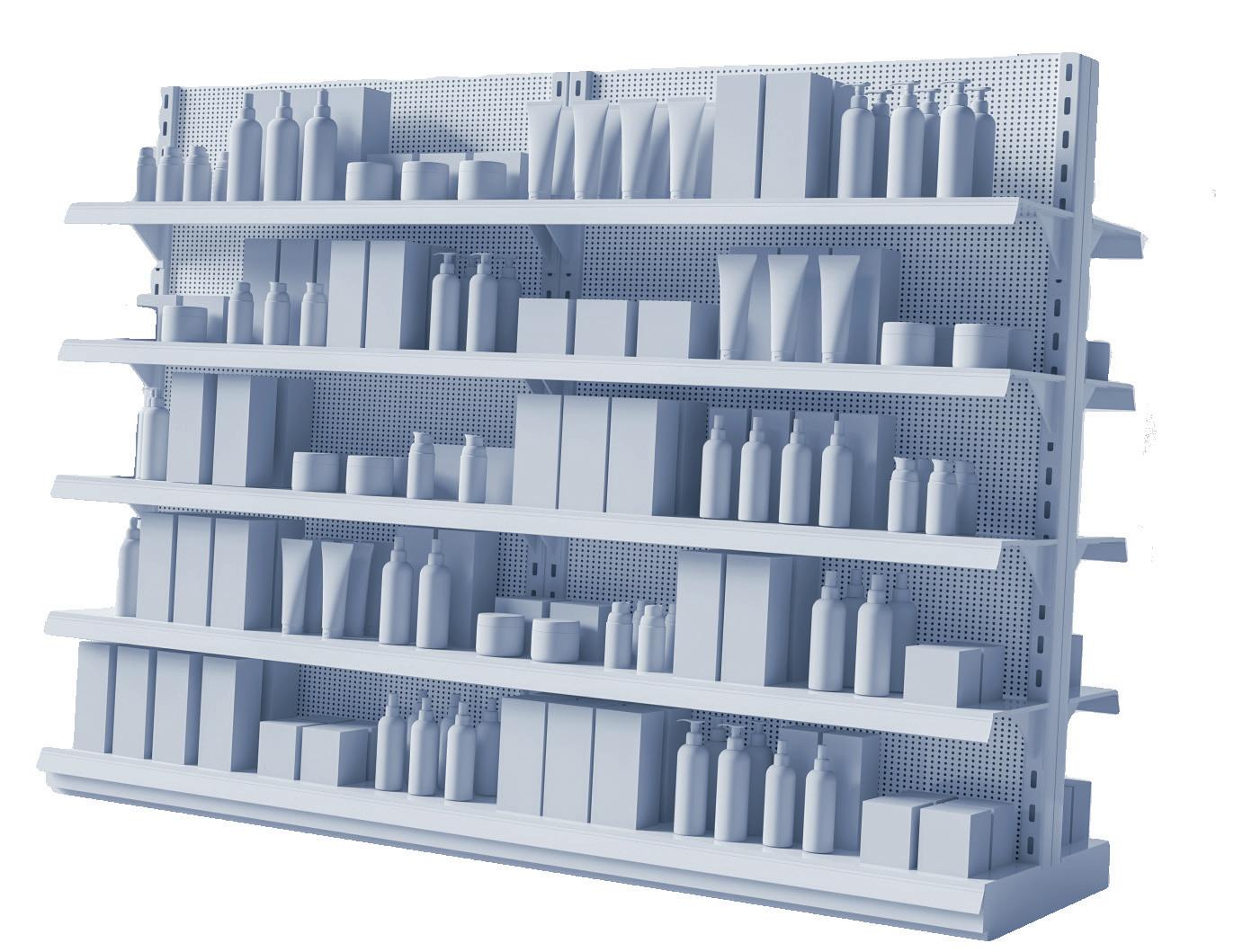


They offer similar products from the same category, use the SFA class solutions, have access to the distributors’ inventory data, optimize the route to the customer as far as possible, etc. Which one of them will win the race? Only one. The one “guided” to the stores by artificial intelligence. Why? Here is the explanation:
Sales target for a given month: 30% growth of sales in a specific category
The AI shows a list of visited stores, broken down by actual potential in the category of products offered by the salesman. Thanks to this, Representative 1 may direct their activities to customers with whom they would achieve the highest revenues and return on investment. This is important since their target is a 30% growth of sales in the given category.
The potential of retail customers is described using AI in accordance with the actual situation. To this end, AI uses data from many sources, updated on a regular basis (in view of frequent changes in the market).
Thanks to the above, Representative 1 obtains a list of stores in which a 30% growth of sales in the given category is most probable to achieve.
Reaching the point of sale entails high costs and consumes a lot of time. AI helps Representative 1 optimize their routes in such a way as to make both the time spent in the car and the mileage as short as possible.
Knowing the current potential of a given point, Representative 1 may also ensure the optimal utilization of store shelves, having the most valuable products placed on them (based on the demand and margin optimization).
If a risk of unavailability or a necessity to replace the commodity with another one occurs suddenly (during the month), Representative 1 will receive an alert and will be able to take corrective actions quickly.
Representative 1 has a higher target to achieve than in the previous period (working for the same amount of time), but their revenues and sales bonus are not threatened. With AI recommendations (proper selection of customers, products, sales promotion and tasks), they are able to fulfil the planned targets.
Sales target for a given month: 30% growth of sales in a specific category
The other field worker is not so lucky. In theory, they know the potential of the customers but, unfortunately, the data is outdated (the company only determines the potential once per year and some time has passed since the last analysis). Therefore, Representative 2 does not know which stores are their best customers for launching a specific trade activity, or where the probability of a 30% increase in revenues in a specific category is the highest. Therefore, they visit all retail points, devoting lots of time and energy, incurring high expenses and counting on a bit of luck.
Representative 2 works with a list of customers assigned to them and can only plan visits to all of them at an (intuitively) chosen frequency.






Representative 2 has no such possibilities – optimization mainly applies to routes and customers “nearby”. This entails lower productivity in reaching the customers.
In the second case, there is a hazard connected with the improper matching of the offer (products without potential).
Representative 2 is unable to pick up such situations, which entails a risk in a lack of sales.
Representative 2 works very intensely, spending a lot of time and money on visits to stores. However, they are unable to increase the revenues in the given category by the planned 30%. The level of their sales remains identical as in the previous settlement period. This is not bad but could be better. Ultimately, the goal is not achieved.
Representative 2 From a company NOT using the AI Representative 1 From an AI-using company
78 #technology
This sounds very interesting. Is it in a similar way that Asseco Business Solutions supports its customers, helping them meet their sales targets?

Currently, we have ready solutions and implement AI projects for the largest FMCG producers in Poland. As I have mentioned before, we focus on support for Route-to-Market processes, since, in our opinion, regular determination of the potential of stores, reaching the right points at the right time and with the right offer and promotion, as well as constant monitoring of their behaviour, is the optimal way to increase sales and to fulfil targets.
Such a position has also been presented by the Promotion Optimization Institute, an international organization well-known in the FCMG sector, in its latest report (POI Vendor Panorama), mentioning AI class tools as among the most important factors affecting the increase of sales efficiency. We are immensely proud that our Recommendation
System by Asseco has received the POI Bestin-Class award this year, finding itself in the top five (in its class) AI solutions for FMCG worldwide.


What would you advise producers?
When, how and to what extent should they begin their adventure with AI?
I believe the sooner the better. However, such a project must be well-considered, well-organized and supported. In planning AI actions, every FMCG organization needs to be aware that technology itself is not everything. Definitely, a key factor is the understanding of the business problems and processes that Artificial Intelligence is there to help improve. Then, it is necessary to assess their importance, analyse to which aspects they relate, and check whether they can be solved within the company, as well as to determine whether the given action makes sense. All that remains in the next step is to embed the AI properly in the selected process
and to configure it properly for cooperation.
This seems to be simple, yet FMCG companies have their business goals i.e., production and sale of the produced goods. This is what they should focus on, rather than fighting with technology. Therefore, in the beginning, it is worth choosing a trusted and proven partner with experience in such projects to cooperate with.
What is worth paying attention to then?
Preferably, this should be a company offering comprehensive services in sales support solutions (not just strictly technological or only analytical). One who is able to understand your business, advise the most favourable actions involving AI and explain their potential effect on sales. One who is not afraid to say no, i.e. to advise against projects bringing no major benefits or unprofitable to the organization. One that would adapt the AI strategy and tools to the changing customer needs.
Thank you for the interview.

Asseco Business Solutions S.A. AssecoBusinessSolutions
Scan for more information 79 #technology
RFID is the technological drive for trade in this decade

The fact RFID is a technology facing a very promising future is proven by the predicted values of the market for devices and solutions utilizing it, as well as by increasingly broader implementation, also outside the trade sector. According to the last analysis published on the Bloomberg agency website, the value of the global RFID market, starting from the level of USD 14.5 billion at the end of 2022, is to reach USD 35.6 billion by the end of the decade1, which is more than double.
Even today, solutions of this kind are used on a large scale in logistics and transport, for precise location and management of products in supply chains. Moreover, they are utilized in the control of people visiting tourist or sport venues where events with large numbers of participants are held, to help manage exhibits at museums or books at libraries, assist physicians and hospital personnel in the location of patients and inventory of surgical instruments, or provide invaluable aid to farmers in livestock identification. One could give many more similar examples. However, it is worth focusing on the area in which the participation of the RFID market development will be most prominent, namely, retail sales.
Advanced designs and RFID technology
It is utilization of a system based on RFID communication that makes it possible to materialize the visions of creating a fully autonomous trade establishments,
self-service store designs
already appearing for some time. The game offering future stores to customers is joined not just by new trade chains but by brands themselves as well. L’Oreal, one of the largest manufacturers of cosmetics and beauty products, has recently launched a demonstration pop-up store in Dusseldorf, Germany 2. The visiting customers simply choose the products of interest from the shelves, and those products are automatically scanned on the basis of its RFID markers. The only thing that customers do is to pay for the shopping using a cashless payment method.
Identification of items with this technology enables development of the most advanced self-service store designs – the Japanese Lawson chain may serve as an example, testing a system using shopper baskets that automatically scan the goods and even featuring a function of automatically packing the products inside3. Interestingly, besides considerably more efficient inventory management thanks to ongoing, real-time monitoring, the use of RFID also ensures better visibility and rapidly “refreshed” control over foodstuffs and their shelf lives, helping mitigate food waste issues at points of retail sale.
80 #foodsector
Identification of items with this technology enables development of the most advanced
Controlled delivery
Although fully autonomous stores are still a matter of the future, RFID proves immensely helpful today in the control of products, management of their “life cycle”, and prevention of losses. UPS announced switching to smart packages bearing RFID tags in as many as 100 warehouses managed by the company, to considerably accelerate their redistribution4. According to the representatives of the courier giant, implementation of this solution will help eliminate as much as 20 million manual package scans performed by employees every day, thanks to a system automatically recognizing them by markers. This technology is also successfully utilized by Inditex, the owner of the Zara brand. Substantial streamlining of logistic

and storage processes allowed the company to focus on online sales after the outbreak of the pandemic, as well as to limit losses caused by theft or damage in transport, previously reaching EUR 170 million annually5. Polish enterprises have also bet on RFID, including the LPP Group where implementation thereof with support of the Checkpoint Systems company has eliminated problems with management and loss of control over products in the supply chain, resulting in store availability of the company’s articles of clothing at the level of 99%6
“Apart from full control over the product from production to shelves, minimization of supply chain losses, or systems of automatic identification and scanning of goods, I would pay attention to one more essential aspect of the use of RFID, namely – anti-theft security systems at stores. This technology serves as a foundation for effective counteraction to unfair consumer practices, and I am convinced that, in the age of rampant inflation or amendments unfavourable to traders in the Criminal
1https://www.bloomberg.com/press-releases/2022-06-22/rfid-market-worth-35-6-billion-by-2030-exclusive-report-by-marketsandmarkets
2https://packagingeurope.com/news/first-grab-and-go-checkout-in-the-beauty-sector-thanks-to-rfid/9136.article
3https://www.impinj.com/library/blog/smart-robots-impinj-and-the-future-of-retail
4https://www.supplychaindive.com/news/ups-smart-package-initiative-facilities-2022-rfid/623017/
5https://us.fashionnetwork.com/news/inditex-controls-the-whereabouts-of-more-than-1-billion-garments,669270.html
6https://www.dlahandlu.pl/technologie-i-wyposazenie/co-dalo-wdrozenie-rfid-grupie-lpp,102128.html
7https://polskiprzemysl.com.pl/raporty/technologia-rfid-w-polskich-firmach/
Code, it has the chance to convince more and more trade chains to invest in anti-theft systems. Especially in the era of common return to shopping in the classic stationary store formula – which we have noticed e.g. during the last Black Week – that is not going to give way to e-sales for a long time,” convinces
Robert Głażewski, the Business Unit Director
at Checkpoint Systems
The benchmark of digitization
It turns out that use of the RFID technology is strictly related to the degree of innovativeness and digitization of Polish companies. This conclusion was reached by the SW Research agency. Its study also shows that 28% of medium and large companies from such sectors as production, logistics, transport, or retail trade have implemented solutions based on RFID communication today7. Asked whether they would recommend this technology to other companies, the respondents, with absolute unanimity (100%), said they would.
81 #foodsector
POLL: Polish people do not believe in a falling food prices scenario
Currently, 36.6% of adult Poles do not believe that food prices in stores will ever start dropping. On the other hand, 26.7% of consumers are convinced this will not happen this year. These are the two beliefs most frequently expressed in the society. A definite minority of the survey expect the everyday shopping to get less expensive within 4-6 or 7-9 months, accounting for 7.5% and 7.4% of the poll, respectively. 7.2% of the poll were unable to state their opinion in this regard. The experts commenting on the poll results claim that most consumers have a fairly rational approach to the problem of unwavering high prices. They also assure us that prices on store shelves will not drop for a long time, even if the dynamics of their growth slow down markedly.
A poll carried out for the Business Insider Polska on a sample of more than 1,000 Polish people has shown that currently, 36.6% of the survey do not believe that food prices in stores would ever start dropping. On the other hand, 26.7% of respondents believe this will not happen this year.
“The results of the survey clearly show that the Poles have lost their faith in a quick drop of prices. This is not about pessimism. It is just plain to see that consumers have adopted a rational approach to the problem of high prices. Of course, this is not tantamount to accepting it, but our countrymen are trying to face this problem with dignity, although it is getting increasingly difficult. Admittedly, inflation has dropped for the second month in a row, but shopping is not getting cheaper at all. Moreover, a slight drop in the price growth dynamics YoY is not a steady trend yet. I believe it will be a long time before the shelf prices finally drop. There is a chance that, in the 2nd or 3rd quarter of this year, their growth dynamics will slow down more efficiently, but it seems goods at stores will not get cheaper anymore. The high prices are here to stay for a longer period,” says Dr. Krzysztof Łuczak, a retail market expert and the main economist of the BLIX Group.
It is women more often than men who doubt that prices will ever start dropping. This is predominantly the opinion of people aged 36-55, with secondary education and preferring not to answer the question about their monthly income level. Looking at the entire country, it can be seen that Poles living in rural areas and in towns with populations up to 5,000 people are the main group who do not believe in the drop of prices at all.
“I find these results hardly surprising. Women do the shopping more often than men, so they experience the growth of prices, the diminishing offer of stores, and the dropping purchasing power of their incomes. The inflation process is felt most acutely by less educated people who more frequently have lower incomes. The times are also hard for inhabitants of poorer, smaller towns and villages. All of whom give the most pessimistic answers. Of course, wealthier consumers notice the market changes as well, but find them less painful,” says Dr. Maria Andrzej Faliński, the former long-time CEO of POHID
The belief that prices will not go down this year is expressed by men more often than by women. This is predominantly the opinion of people aged 18-22. Moreover, it is mainly expressed by Poles with higher education and monthly net incomes of PLN 3000-4999. Across the country, consumers who say so usually live in cities having a population of at least 500,000.
“The fact that this answer has been given most frequently by young people may be a little surprising. This means that this group of shoppers is currently the most skeptical one, although they can think of prices less seriously, as they have no families to provide for yet,” points out Dr. Łuczak.
A perspective of 4-6 months is the third most frequently chosen answer to the question of when food prices at stores will really
82 #foodsector
start dropping. It was given by 7.5% of the surveyed, slightly more women than men. This belief was mainly expressed by people aged 18-22, with secondary education and monthly net incomes of PLN 3000-4999. Above all, this is the opinion of inhabitants of cities with populations between 20,000 and 49,000 people.
“The third most often expressed belief has been indicated by quite a small group of Poles, rejecting the arguments critical of the official optimism. They show a lack of competence to understand economic information and do their shopping relatively rarely. This is a connection between naivety and weakness of political rather than economic beliefs. So far, there are no rational arguments in favour of any drop of prices at stores. At the most, there is a hypothetical expectation that they will eventually grow at a slower pace. This also includes a psychological element of wishful thinking,” Dr. Faliński comments.
In turn, Dr. Krzysztof Łuczak claims that a small part of the Poles believe in various expectations or promises by politicians that prices will indeed plunge within a couple of months. In the expert’s opinion, no such process will occur, yet one should also pay attention to the fact that this attitude is represented by just a little more than 7% of the survey, which is a low percentage.
“Simultaneously, the survey shows that most consumers do not take the official optimism of the National Bank of Poland and of the government seriously. It has clashed with the price reality, i.e., with the constantly rising prices. This brings about a loss of trust to the government, as well as a, more or less, pessimistic outlook,” the former CEO of POHID remarks.
According to the survey, 7.4% of the poll claim that food prices in stores will start dropping noticeably within 7-9 months. 7.2% have no opinion in this regard. 6.5% of the respondents claim such reality will come within 10-12 months, and 5.6% expect it within 2-3 months. In turn, 2.5% of consumers have already noticed a drop of prices in stores today.
“Every fortieth surveyed person claims they can already see a drop of prices in stores. Of course, this is not true, but it may be declared by consumers who are not fully capable of the precise assessment of the situation. After many studies and analyses, the market shows that prices in every monitored category are only growing. Most importantly, this trend has been constant for at least 6-8 months,” Dr. Krzysztof Łuczak sums up.

36.6% of the survey do not believe that food prices in stores would ever start dropping. This is predominantly the opinion of people aged 36-55.
7.4% of the poll claim that food prices in stores will start dropping noticeably within 7-9 months.
7.2% have no opinion in this regard.
83 #foodsector
The inflation process is felt most acutely by less educated people who more frequently have lower incomes.
Glovo predicts the trends for 2023
Vegetarian dishes, food shopping, and new categories.
Based on 2022 data, Glovo predicts that the key trends in the delivery sector over the upcoming 12 months will be vegetarian dishes, food shopping, as well as new categories on the Polish market, such as: flowers, books, stationery, beauty products, or products for pets.
• Poland, beside Spain and Italy, found itself among the countries with the highest number of vegetarian dish orders
• Although Middle Eastern cuisine is the most popular at Glovo, sushi and Polish cuisine are enjoying increasing attention.
• Apart from Romania and Spain, Poland found itself among the top 3 countries by number of food orders. Globally, the most frequently ordered products are bottled water, beer, and bananas.
• Next year will see the growing trend going beyond restaurants – this year, the number of flower orders has grown by more than 300%
• The 3 most interesting orders in 2022: a watch with a hidden miniature camera, 100 whipped cream chargers, as well as a 400 mm diamond wheel and a diamond hole saw.

Poland will get more and more vegetarian
As late as 2014, only 1% of the Poles declared their adherence to vegetarianism (according to CBOS). In 2019, this percentage was already close to 8%. Today, 44% of surveyed Poles aged 15–29 declared a reduction of the amount of consumed meat (report by the Heinrich Böll Foundation in Warsaw as well as the “Meat Atlas” of the Institute for Sustainable Development Foundation of 2022). Thus, the young generation is developing a clear vegetarian future. This is additionally confirmed by the Glovo data. Apart from Spain and Italy, Poland found itself among the countries with the highest number of vegetarian dish orders. Moreover, the entire category of such dishes has grown by 57% year-on-year.
The classic meat dish alternatives with popularity growing most quickly include the vegetarian or vegan version of ramen. In 2022, Glovo delivered the highest number of vegetarian dishes in Warsaw. In many international rankings, the capital of Poland occupies high
positions in terms of popularity of vegetarianism. At the same time, Białystok recorded the fastest growth, by more than 300%, in the number of vegetarian option orders. Therefore, in the future, we can expect other cities to try to catch up with Warsaw in this regard. Additionally, it is worth remarking that tradition and religion still have a serious effect on the popularity of vegetarianism in Poland – Friday, on which many people choose to fast for traditional reasons, is the day with the highest number of meatless dish orders.
Growth leaders among dishes: Middle Eastern cuisine, sushi, and Polish cuisine
In 2022, Middle Eastern cuisine recorded a substantial increase in popularity, achieving a growth in the number of orders by well above 100%. Although pizzas, burgers and kebabs are still the most often ordered foods in Poland, noteworthy are two segments, very quickly gaining on popularity: sushi and Polish cuisine. Sushi is becoming extremely popu-
84 #trends
lar in Szczecin; the inhabitants of this city have ordered 357% more of it year-on-year (20212022). Definitely, the most popular sushi type is nigiri with tuna, and Sunday is the day with the highest number of orders.
In the case of the Polish cuisine, the undisputed leader in the country is, of course, the traditional pork chop. It turns out that the popularity of Polish dishes differs between cities. Although Warsaw is true to tradition, Łódź most often orders chicken broth with noodles, and Cracow chooses pierogi with potatoes, cottage cheese and pepper. However, the title of the “greatest enthusiasts of Polish cuisine” was well-earned by people from Rybnik, recording a growth in orders of Polish dishes by more than 500%.
Food shopping deliveries are getting more popular
Poland, beside Romania and Spain, found itself in the top 3 countries by number of food orders. Globally, the 3 products most frequently ordered from supermarkets were bottled water, beer, and bananas. Analyses show that further growth in the popularity of food shopping with delivery on the same day should be expected – customers appreciate convenience, quickness and time saving.
In Poland, noteworthy is the growing popularity of Glovo partners offering alcohol products. In 2022, such brands as Duży Ben, Świat Alkoholi 24, Roberto & Franc, Wermut, Nowy Browar Gdański, Smaki Azerbejdżanu, or PiwoWar made their offer available on Glovo. In 2023, we can expect further growth in the popularity of Q-Commerce, or express home deliveries. In this area, Glovo cooperates with Biedronka as a part of the BIEK service, or delivery of food shopping within 20 minutes.

We order more and more nonfood products
In 2023, we can anticipate that more and more people will expect an option to order such products as books, flowers, or electronics. Globally, the number of orders placed via Glovo at stores outside the food category in 2022 grew by 120% in relation to 2021. The most popular categories by number of orders were books, pet products, beauty products, souvenirs, and flowers.


In the case of the Polish cuisine, the undisputed leader in the country is, of course, the traditional pork chop.
85 #trends
Social commerce – a trend that increasingly drives
Polish companies
Social media is not only a tool to spy on other people’s lives, or at least no longer. Now, it is also becoming a significant tool for online trade, almost a half of Polish people (46%) have made a purchase through social media over the last 6 months1.
Moreover, entrepreneurs notice this potential as well, since 2 out of 3 (65%) European online traders have used those platforms to distribute their products, including 65% of Polish companies. What is the potential of social commerce on the Polish market? It turns out that, according to PayPal Ecommerce Index 2022, it is quite large. In 2022, it was estimated that the social commerce sector in Poland would reach the value of USD 2.760 billion (approx. PLN 12.25 billion)2. According to PayPal Ecommerce Index 2022, trade via social media platforms is becoming a significant part of the European e-commerce landscape, since even 2 out of 5 Europeans (43%) have made a purchase via social media over the last six months3. These statistics also includes 46% of Poles, which is 3 pp more in comparison with the European average.
As the results of the study show, many traders have started achieving high results on social commerce. However, the broader role of social media – presentation of new goods and services to consumers –remains important. 1 out of 4 European consumers search social media to find something they could find interesting, and
they follow their favourite brands there4. Combined with advertisements, this leads them to make many new discoveries in these channels.
Interestingly, although more than 1 out of 10 European consumers have bought a product thanks to a social media influencer or followed influencers to see what they use or wear, posts of brands still have a stronger impact on their decision-making processes than individual influencers5
Top companies from the social media sector, noticing the progress in the development of social commerce and the results which can be obtained through this technology, do not hesitate to stimulate its development by adding new functions to their platforms.
Traders notice the potential of the market, as 65% of European traders currently distribute their goods and services via social media – including 65% of companies in Poland6. Many of them still use social media only to build the brand awareness and redirect the shopping activity to other channels, such as an external website. Nevertheless, a quarter of sales in Europe (24%) is already affected directly via social media. Trade companies in Ireland are the market lead-
er (30%), closely followed by traders from the Netherlands, Israel, and Poland, who declare approx. 29% of their sales come from this channel.
European consumers are definitely starting to master the social-media shopping channel - 1 out of 6 of them has made a purchase at least once per week (or more often)7. Combined with the size of shopping, this translates to average monthly expenditures, on social commerce on all markets, amounting to 141 euros, whereas most money is spent by the Israelis (186 euros) and the Dutch (174 euros), followed by the Belgians (160 euros) and the Greeks (158 euros). This trend is present in Poland as well – every tenth Pole (14%) has made a purchase through a social platform at least once per week, spending an average of 112 euros per month this way (approx. PLN 524).
Therefore, local traders should start looking for ideas to incorporate social media into distribution of their goods or services, be it as a method of building awareness around their brand or a direct sales channel. The data shows this channel will be increasingly difficult to ignore in 2023.

2Poland
Q1 2022 Update 3-7PayPal eCommerce Index 2022; 86 #trends
1PayPal eCommerce Index 2022; research methodology: a 15-minute survey of 15,221 consumers from Europe and Israel, aged 18-75, & a 10-minute survey of 4,604 corporate decision-makers from Europe and Israel. All data in the press release come from this report, unless stated otherwise.
Social Commerce Market Intelligence and Future Growth Dynamics Databook - 50+ KPIs on Social Commerce Trends by End-Use Sectors, Operational KPIs, Retail Product Dynamics, and Consumer Demographics -
Polish trade affected by war
The economic and geopolitical situation at the beginnig of 2023 is not optimistic.

The global economy is slowing down. While many countries had still not managed to recover from the adverse effects of the pandemic, the outbreak of the war in Ukraine last February caused a rapid growth of raw material and energy prices on global markets. Inflation – driven by the most severe energy crisis since the 1970s – reached a record-breaking level, to which banks responded by increasing their interest rates. The Polish economy has been hit hard by the aftermath of the crisis, especially that close economic relationships used to tie it with both sides of the military conflict, e.g. in the supply of raw materials (such as sunflower
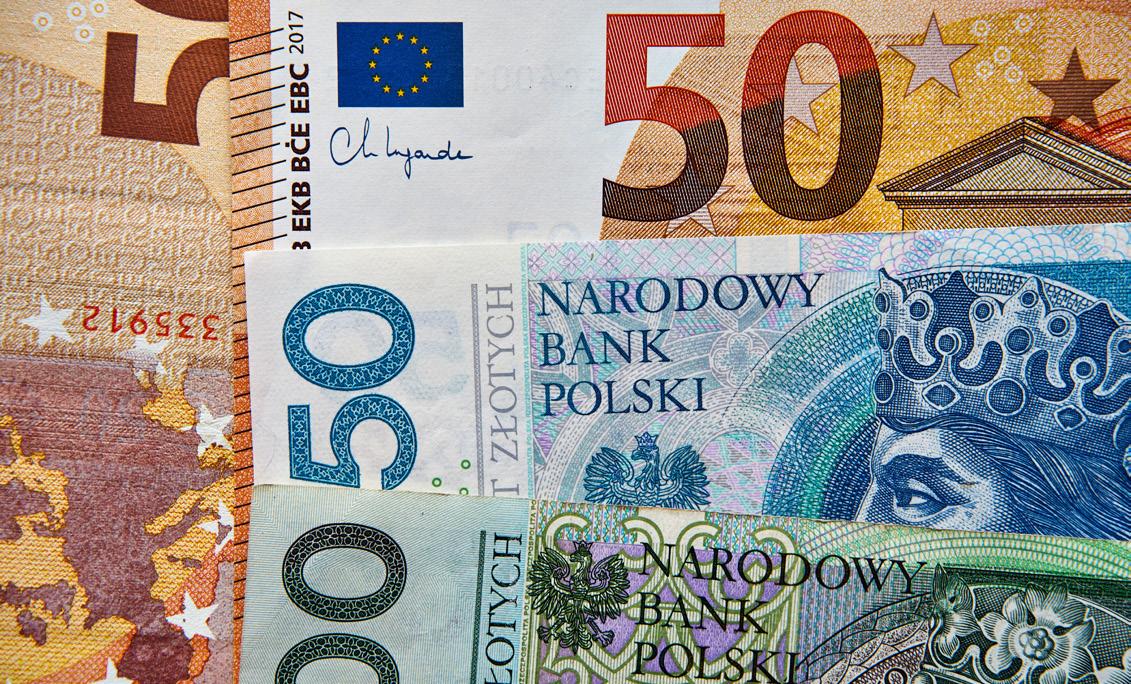
oil, maize, soybean oil, rapeseed) or energy products, such as gas, petroleum and coal. The geopolitical situation affects the dynamic growth of production costs, including of energy, purchase of raw materials, packaging, or chemicals necessary in the production process, which translates into substantial increases in prices of commodities purchased from the manufacturers. The condition of Polish trade is affected, on the one hand, by the rapid growth of costs, e.g. of supply of goods to stores, maintenance of premises, labour, etc., and on the other hand – by flagging consumer demand. The inflation has made the prices skyrocket to unprecedented levels. Some products even went up by as much as 80–100%. High inflation, growing credit instalments, increased rent and payments for utilities, etc. –a negative dynamics of the salaries growth rate – bring a decrease in disposable incomes of households, due to which
consumers are forced to restrict their expenses on food and necessary products, e.g. by giving up on certain goods, choosing cheaper alternatives, or purchasing products covered by promotions. An unfavourable side effect of inflation is the so-called poverty theft, i.e. shoplifting of essential foodstuffs, such as bread, butter or pasta. This proves an extremely difficult living situation of the Polish people, many of whom experience extreme poverty. International trade chains, through the scale of business, successfully protect Polish families against excessive growth of product prices on store shelves. Unfortunately, in the face of inflation, the economic and energy crisis, the unstable situation beyond our eastern border, and increased fiscal pressure, large-surface trade is afraid of deterioration of conditions for business in 2023. The industry is particularly concerned with issues related to energy and food security.
87 #foodsector
Renata Juszkiewicz President of POHiD
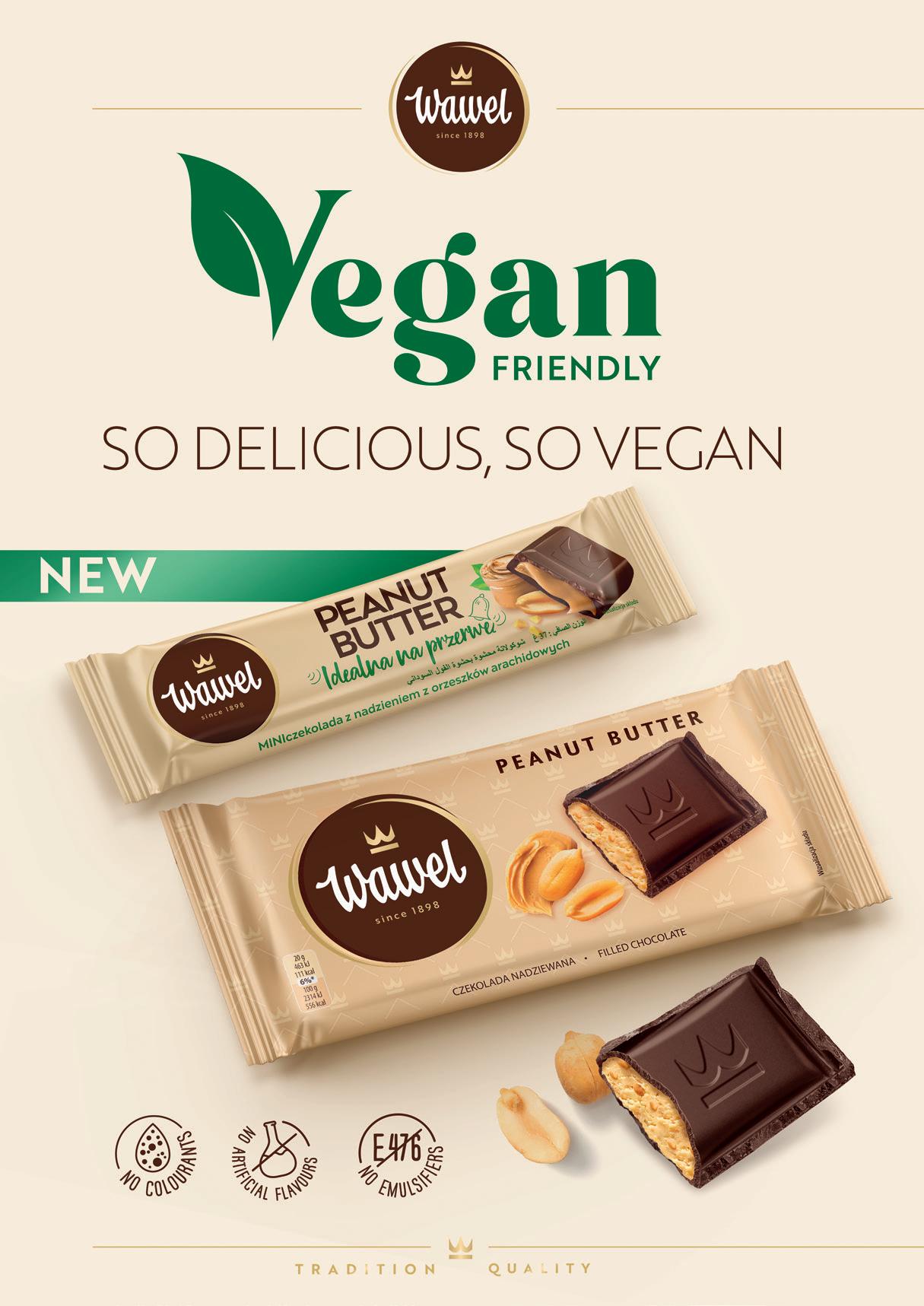

technology
confectionery fmcg
Asseco Business Solutions S.A. Bogutti Sp. z o.o.
Konrada Wallenroda 4c St. 20-607 Lublin, Poland +48 81 535 30 00 info@assecobs.pl
Over 20 years experience in FMCG, deployments in dozens of countries worldwide, several hundred FMCG customers B2B... this is Asseco Business Solutions!
We are a software provider, focused internationally on supporting the sales process of FMCG companies.
We offer a set of comprehensive solutions for sales excellence in the industry. Retail tech is our superpower!
We use in our apps smart IT technology e.g.: Artificial Intelligence AI, Recommendation System, Augmented Reality AR, Image Recognition based on computer vision, Digital audit of merchandising.
Our Omnichannel Platform for FMCG empowers consumer goods manufacturers across multiple countries and sales channels. It enables them to increase sales, optimise cost-to-serve and digitalise their business.
48 Gromadzka Street 05-504 Henryków-Urocze, Poland Export Department: export@bogutti.com +48 603 956 466, +48 601 704 404, +48 783 956 466 Internal Sales Dep.: zamowienia@bogutti.com www.bogutti.com
Bogutti is a family company from Poland which specialises in manufacturing high-quality cookies and fudges. The company is thriving and expanding into new markets on many continents.

Bogutti owns brands La Gustosa, Weeksy, Tweett, Choco Gutti, ChocoFit, Cookies in American Style, Next, Free and Bogutti Fudges.
It’s also the significant supplier for retail chains, both in Poland and abroad. The products are valued for their quality, impeccable flavours and also for being kosher and halal.
More information at bogutti.com
Brand Distribution Group
18 Niepodleglosci Avenue
02-653 Warsaw, Poland +48 500 100 130 contact@bdgroup.eu www.bdgroup.eu
Brand Distribution Group is an international distribution group, which has been actively operating in the FMCG market for 30 years. It specializes in sourcing and distributing high-quality food and non-food brands. It cooperates with international and local retail chains and manufacturers all over the world. It operates based on its own stocks, modern technology and sales offices located in Poland, Spain, Great Britain, Germany, and Singapore. It employs nearly 200 people and communicates in 16 languages. It creates a modern organization providing its partners with a comprehensive product distribution service, security of transactions and continuity of logistics processes all over the world.
90 #Polishcompanies
meat snacks
EUROWAFEL
23 Władysława Grabskiego Street
32-640 Zator, Poland
Export Department:
+48 33 870 35 71 ext. 106 export@eurowafel.pl www.eurowafel.pl
Eurowafel is the producer of different sort of wafers. Since its establishment in 1984, it has developed over the years by investing in modern machines and innovative technologies.

On the one hand, we base our production on traditional recipes but on the other, we use innovative solutions to develop new productsas a response to constantly changing market expectations.
Eurowafel serves its Clients with high quality products by ensuring product safety according to IFS Certificate.
We use the best flour and only simple and verified ingredients. Combining tradition with the latest researches on health food, we implement new, light and healthly products that can be served in many ways.
conventional and organic products
25 Serwituty Street
02-233 Warsaw, Poland
+48 22 343 98 70 sales@ewabis.com.pl www.ewabis.com.pl
3 Jesienna Street
10-370 Olsztyn, Poland +48 695 893 311 www.indykpol.pl
Ewa Bis, one of the leaders of Polish food exports for over 30 years.
We are also a part of the Ewa Bis Group, associating 14 companies around the world. We cooperates with partners from over 60 countries from five continents. We have been cooperating with large international manufacturers, distributors, retail chains, wholesalers and B2B partners.
Our offer consists of a wide range of conventional and organic products. In our portfolio you can find the most globally recognized FMCG brands such as: Procter and Gamble, Henkel, Unilever, Mondelez, Nestle; Dairy products; Fresh fruit and vegetables; Frozen food; Fresh and frozen meat;Beverages, NFC juices, juice concentrates and puree.
Indykpol is a leader in the Polish turkey market and in Europe it ranks among the Top 5 largest companies.
For many years we supply the biggest domestic & European food chains like Auchan, Aldi, Kaufland, Carrefour, Tesco, Lidl, Iceland, Morrisons, ATB, Lulu, Al Maya, Viva Supermarket,
In our company we have implemented all major quality certificates as: IFS, BRC, QS. Additionally we have HALAL CERTIFICATION and we are ESMA approved.
In our product portfolio you can find: Meat parts, hot dog sausages (chilled/frozen), hams (cooked & smoked), fresh meat, pates, private label products per request.
Sp.
Sp. z o.o. Sp. k. PPH EWA BIS
z o.o. Indykpol S.A.
91 #Polishcompanies
meat services
dairy
National Poultry Council
3/5 Czackiego Street
00-043 Warsaw, Poland
+48 22 828 23 89
krd-ig@krd-ig.pl
www.krd-ig.com.pl
(KRD-IG) is the largest poultry organisation in Poland. It associates over 100 members from such fields as: farming, breeding, hatching, commercial production of poultry and eggs, processing and trade of poultry meat, its preparations and eggs, poultry feed production, related production, scientific and educational activities associated with the poultry sector. Members of KRDIG have a nearly 70% share of the national market and a nearly 90% share of the export. KRD aims at developing and modernizing the Polish poultry industry, at protecting the interests of poultry farmers and producers and poultry meat processors, their integration, representing the national poultry industry before national and non-governmental organizati ons.
PPH Maxpol Sp. z o.o.
251 Rolnicza Street
Dziekanów Leśny
05-092 Łomianki, Poland
maxpol@maxpol-targi.com.pl www.maxpol-targi.com.pl

Dairy Cooperative MLEKPOL in Grajewo
13 Elewatorska Street
19-203 Grajewo, Poland

Export Department:
+48 86 273 04 44
+48 86 273 04 80
export@mlekpol.com.pl
www.mlekpol.com.pl
Maxpol is a company with 30 years of experience in the exhibition industry. Throughout this period, several thousand exhibitors took part in the trade fairs organized by Maxpol. The company organizes fairs in Europe, Asia, North America, South America, Africa and even Australia. Maxpol designs and builds standard and custom stands, provides transport of display units, comprehensive logistic services for fair participants and technical support during the fair. The company holds the title Ambassador of Polish Food Export.
Dairy Cooperative MLEKPOL in Grajewo is one of the biggest milk and dairy producers in Poland. It has been a leader on domestic dairy market for years and it is one of twenty largest dairy processors in Europe. In 2021 Mlekpol reached 2 billion liters per year in milk purchase. This equals to over 5.5 milion liters of milk per day supplied by around 8500 farmers - members of the Cooperative. Its main product categories are UHT products, cheese, butter, milk and whey powders. Mlekpol’s products are made in 13 modern production plants. They are known by, among others, European, African and Asian countries. Mlekpol’s export sales are growing systematically each year.
92 #Polishcompanies
retail technology
tea coffee
seasonings
Modern Expo S.A.
3 Ludwik Spiess St. 20-270 Lublin, Poland +48 81 744 50 50 biurohandlowe@modern-expo.pl

KIÓW +380 332 78 95 00 kyiv@modern-expo.com
Modern expo is a platform bringing together leading professionals into powerful teams of R&D, IT, retail design, engineering, etc., working in synergy to create the perfect retail of the future.
We consist of 9 high-tech production units specializing in different types of equipment. Our manufacture is one of the most powerful in the world, we provide mass replication in roll-outs and ensure meeting each of our products with European safety and quality standards (EN and FEM).
Formed in 1997 as a result of the incorporation of Ukrainian MODERN and the Polish partner company DUET. We opened the first branch office of the company in Vinnytsia (Ukraine).
MOKATE Group
265A Katowicka Street
43-450 Ustroń, Poland +48 32 434 97 00 export@mokate.com.pl www.mokate.com
Prymat Group
14 Chlebowa Street 44-337 Jastrzebie-Zdrój, Poland +48 12 252 88 21 export@prymat.pl www.prymatgroup.pl
Att. Natalia Wojas (Export Director)
The MOKATE Group is a family business established in 1900 and is comprised of several companies operating in Poland, Czech Republic, United Kingdom, Slovakia, Hungary, South Africa and Dubai which export their products to nearly all the countries in the world.
The company has three production plants, in Ustroń (Poland), Żory (Poland) and Votice (Czech Republic). The turnover of Mokate is now over one Billion zloty per annum, with 60% of sales now originating in export markets. The company employs 1700 people all over the world.
The leading brands in the MOKATE portfolio are: Mokate, Marilla, NY Coffee, Loyd, Minutka, Alpino and Grandma`s Tea.
Prymat Group is the leading spice and seasoning producer in Poland with several factories and over 1000 employees. The company produces processed, wet and dry vegetables and mustards for supermarket chains, HoReCa and B2B. It works in accordance with the highest quality standards: IFS, HACCP and Halal.
R&D and Quality Department develop products that meet the needs and requirements of consumers. All are compliant with standards and competitive in terms of flavour combinations and quality. Appropriate physical and chemical analyses, including microbiological and organoleptic tests of both raw ingredients and finished products are carried out in our testing laboratory.
93 #Polishcompanies
dairy meat alcoholic beverages
Toruńskie Wódki Gatunkowe
14/16 Jana Olbrachta Street
87-100 Toruń, Poland

+48 56 623 29 66
biuro@torunskiewodki.pl www.torunskiewodki.pl
Toruńskie Wódki Gatunkowe is a company with over 135 years of history. Today we continue the work of the founders of the Toruń plant and a few hundred years of tradition of producing Polish vodka. In our factory we use water from our own abbysal intakes, selected distillate and macerates made on the basis of original recipes. The high quality of the spirit for which we are famous is due to the unique in European scale of 5-column rectification apparatus and the experienced staff. The range of brands and products is constantly developing. We are open to cooperation with foreign business partners, to whom we can offer the sale of our products (pure vodkas, flavoured vodkas), as well as private brands (“private labels”) owned by a foreign distributor.
Sertop Sp. z o.o. Sokołów S.A.
58
The company SERTOP is one of the leading manufacturers of processed cheese on the Polish market. The company has more than sixty-year tradition of producing high quality products based on proven recipes while maintaining strict quality control. It uses only natural ingredients without any preservatives and colorings. SERTOP offer includes more than 20 flavors of processed cheese in a variety of formats, such as: round boxes, cubes, bars and sausages. SERTOP sells its products to the Polish market and the markets of the European Union and the United States, Canada, countries of the Middle East, South Korea. The company is certified BRC Global Standard Certificate and IFS (International Food Standard).

22B
SOKOLOW S.A. is one of the largest meat producers in Central and Eastern Europe and one of the industry leaders in Poland. The SOKOLÓW brand is one of the most valuable Polish brands, appreciated by consumers, which is confirmed by numerous awards and distinctions. The Group consists of 8 production plants as well as 4 subsidiaries. We produce the highest quality meat, processed meat products as well as plant based products. We offer certified halal production of beef meat and processed beef products. Production is carried out in accordance with the requirements of recognized international standards IFS and BRC. All plants are ISO14001 certified. We export our products to around 40 countries.

Przemysłowa Street 43-100 Tychy, Poland +48 32 217 08 38 +48 32 326 46 41 export@sertop.com.pl www.sertop.com.pl
Bukowinska Street 02-703 Warsaw, Poland +48 22 521 33 00 fax +48 22 521 33 33 export@sokolow.pl www.sokolow.pl
94 #Polishcompanies
logistics
baking confectionery
P.P.H.U. TRANSAD Sebastian Romaniak
Karolew 18
05-652 Pniewy, Poland
+48 48 668 68 68
mobile: +48 668 881 182
kuba@transad.pl transport@transad.pl
www.transad.pl
The TRANSAD company was established in 2006, and since then it has been taking care to meet the requirements of customers. Thanks to the experience the company gained over the years in the TSL industry and is focusing on high quality and professionalism. For many years it has been working on effects that are visible now. The company is able to adapt to almost every customer by offering the highest quality of services and an individual approach. It makes sure that the fleet is always modern and meets the highest standards. It is constantly supplemented with various types of vehicles. TRANSAD offers each client refrigerated transport at the highest level, adjusting the type to individual requirements.
Turka Invest Sp. z o.o.
10 Krakowska Avenue
05-555 Tarczyn, Poland +48 22 727 00 01 info@turka.pl www.turka.pl
„TURKA Tortilla & Breads is a place where the flour turns into love” – TURKA is recognized by this original slogan. TURKA, as one of the biggest producers of tortillas in Europe, offers its products not only in its continent but also in the USA, Africa and the Near East markets. Among its customers are the biggest supermarket chains and HORECA sector. For many years the company produced high quality products keeping precise quality control which is approved by numerous certifications like ISO 22000, IFS and Vegan. TURKA constantly improves the technical modern level of factories and its skilled staff is working on introducing new types of products to anticipate customers’ expectations.

Vobro Sp. z o.o. Sp.K.
78 Podgorna Street
87-300 Brodnica, Poland +48 56 493 28 51 export@vobro.pl www.vobro.pl
VOBRO was established in 1986. The company employs over 400 people, most of them are long-term employees who present vast experience and have been associated with the production of sweets form many years.
The VOBRO company is known preliminary for its production of chocolate sweets - including chocolate pralines. FRUTTI DI MARE (seafood-shaped pralines), as well as CHERRY PASSION and LOVE & CHERRY (cherry pralines in chocolate) brands are products known to chocolate praline consumers in markets around the world. A large part of the company`s products are chocolate candies and chocolate bars – including the very popular TRUFLA and JAMAJKA brands. For several years, the company has also been investing in other types of sweets: jellies, including new brand JELLY DOT and different formats of bars. The VOBRO brand is a leader in many markets in term of the occasional products offer, i.e. products bought by consumers as calendar occassions (Valentine`s Day, Mother`s Day, Christmas, etc.).

95 #Polishcompanies
confectionery trade press
meat
Fischer Trading Group Sp. z o.o.
2/218 Bagno Street
00-112 Warsaw, Poland
+48 22 847 93 67 redakcja@ftgroup.pl www.hurtidetal.pl www.foodfrompoland.pl
Wawel SA

14 Władysława Warneńczyka Street
30-520 Cracow, Poland
+48 12 252 72 79 +48 12 252 71 02 (fax) export@wawel.com.pl www.wawel.com.pl
Zakłady Mięsne Silesia S.A.
Opolska 22
40-084 Katowice, Poland
Export Director: +48 784 639 222 owczarek.hubert@duda.pl biuro@silesia.eu www.silesia.eu
FIscher Trading Group Sp. z o.o. is a trade press publisher located in Poland. It publishes HURT & DETAL Magazine (Wholesale & Retail) and Food from Poland Magazine. HURT & DETAL is aimed at Polish retailers, shop owners, FMCG professionals and industry leaders. It covers Polish FMCG sector with a circulation of 70 000 copies per month. Food from Poland Magazine is available during the biggest trade fairs around the world. It emphasises the high quality of finest Polish products and promote Polish food producers.
Fischer Trading Group is also an organisator of numerous, cyclical industry events in Poland.
Wawel SA is one of the most renowned Polish confectionery producers. It offers a wide portfolio of chocolate tablets, chocolate bars and pralines, candies, caramels and fruity jellies. Wawel owes its success to over a century of experience along with continuous development and a modern production process. Permanent care for high quality and global standards resulted in an exceptional growth and development. Today Wawel’s products are available in about 60 countries worldwide and the number of loyal consumers is constantly growing.
Since 2017, our company has been part of the undisputed Polish leader in the meat industry, the Cedrob Group. Our area of activity perfectly fits the policy of the entire group: Controlled Supply Chain at its penultimate link, processing.
Inspired by Taste. Drawing on this motto, we work to rid our customers and business partners of any doubt when selecting cold cuts produced at our facilities. Our rich assortment appeals to various tastes: from aficionados of classic smoked meat to connoisseurs of traditional Polish sausages, pâtés, or galantines. Our portfolio includes ready-made poultry Cedrob product line „Gotowe z półki”.
s ince 1898
96 #Polishcompanies
Cookies in American Style


• 3 delicious flavours: chocolate, hazelnuts, raisins
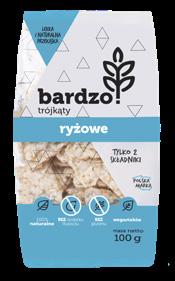
• Double chocolate: milk & dark in chocolate cookies
• High-quality ingredients
• 135 g
www.BOGUTTI.com
Milk Fudges


• Traditional fudges from Poland
• Delicious flavour
• High-quality ingredients
• 100 g, 200 g, 400 g, 1 kg

www.BOGUTTI.com
VITAMIZU KIDS
Discover our special line Mizu Kids from Vitamizu- drinks for kids filled with magic!

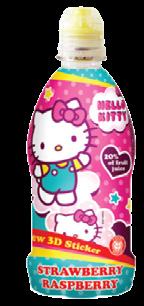
All products are with favorite characters from fairy tales for the youngest: Minions, Hello Kitty, L.O.L. Surprise! and others. Each drink has a unique flavor and packaging that allows you to attach a 3d sticker!


www.BDGROUP.eu
Moonsy Brown Rice Chips

Moonsy is a novelty in snacks. Extra thin, non-fried full flavour crisps with no added preservatives. Moonsy are full of taste, satisfying all customers needs, healthier crisps for every occasion. Simple ingredients, no palm oil. Reach for Moonsy and experience the full flavour green onion, paprika and salt.


www.EUROWAFEL.pl
Finely chopped salmon Pet Republic
Pet Republic is a place where we nourish animals by providing them with healthy products based on original recipes. Grain-free and sugar-free food, containing up to 90% meat and products of animal origin in pieces of stuffing dipped in a delicate sauce. It does not contain artificial preservative or dyes. Enriched with minerals and vitamins that keep pets’ good health and great appearance.
www.BDGROUP.eu
Triangles „bardzo”
Corn, Rice and Potatoes Traingles are conventional products in Eurowafel portfolio. So taste, so healthy - only simple ingredients. Popped triangles, gluten free, natural light snack for vegan with excellent taste. In line with current trends and consumer needs, Triangles don’t contain sugar, fat and preservatives.

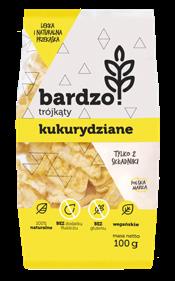
www.EUROWAFEL.pl

97 #discoverPolishproducts
FMCG Products – Big Brands

Ewa Bis operates globally in the FMCG bussines. In our portfolio you can find the most respected global brands such as: Procter & Gamble, Henkel, Unilever, Adidas, Mars, Mondelēz International, Nestlé, Ferrero, Red Bull, Monster, Coca Cola and many others. We try to reach out to our customers every day, offering them brands, which are recognized around the world, regardless of the place in which they are located.
We cooperate with large retail chains, distributors, as well as intermediaries. Very much of our attention is focused on reliable service, which is why we provide labelling, repackaging, mixing pallets, cargo manual and trucks.
www.EWABIS.com.pl
PAPRIKA GRAB & GO SNACK 120G
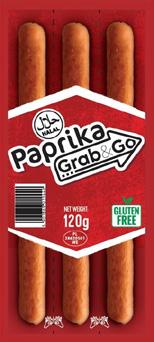
PAPRIKA GRAB & GO snack is an innovative & very tasty meat sausage, recently developed by Indykpol S.A. The Paprika tasty snack is a combination of three dry sausages packed separately that could be torn off and eaten one by one in a different time & different place.: at work, school, in the car, on a trip, it can be also added to the salad. The sausages are perfect sauce of protein and are convenient to everyone who is in hurry, has little hanger or making the party for his friends. The sausages are produced of 90% turkey meat, is devoid of preservatives and gluten free.
www.INDYKPOL.pl
Mozzarella cheese block

Mozzarella is a cheese with a mild and delicate flavour. It is per fect for baking and, which is distinctive for it, after melting it becomes flexible and very stretchy, which makes it the most popular choice for ma king pizza. In combination with tomato sauce and basil leaves, it creates the classic taste of a timeless margherita, but it also builds a delicious composition with other ingredients. Mozzarella can be used in many dishes, such as casseroles, lasagne and pasta. Mozzarella from Mlekpol provides a unique Italian taste, because the product is made of the highest quality Polish milk from cows grazed in the cleanest regions of Poland. It is also an excellent source of calcium, valuable vitamins and minerals.
www.MLEKPOL.com.pl
POULTRY FRANKFUTERS WITH CHILI 350G
POULTRY FRANKFUTERS WITH CHILI 350G. This product was invented by Indykpol to fulfil all needs of demanding customers. After having a classic taste, we decided to prepare the chili taste for hot-snack lovers. This delicious poultry franks with chili taste is a perfect for breakfast or lunch or can be eaten as a cold snack. The sausages are pasteurised & vacuumed packed what enriched the advantage of the product, because we may guarantee even 120 days of shelf life without any loss of taste. The wieners are available now in three flavors: classic, with cheese and with chili or paprika. The product is 100% gluten free.

www.INDYKPOL.pl
Whey protein concentrate (WPC) powder 80
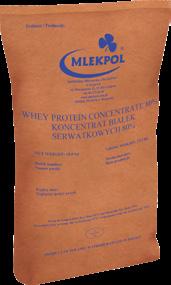
Whey protein concentrate 80 is a product obtained by the separation of the whey protein from the pasteurized liquid whey in the ultrafiltration process so that the finished product contains at least 80% protein. It can be used as a food additive and is a source of nutritional protein for supplementation. WPC 80 is widely applied in diet foods and in sport nutrition products. It can also be a substitute for eggs in many products. WPC 80 is used in the production of bread, baked goods, soups, creams, sauce premixes and in many types of meat. What is more, it is unflavoured and can be given any flavour or aroma.
www.MLEKPOL.com.pl
98 #discoverPolishproducts
The CONVENIQ
The CONVENIQ ecosystem by Modern Expo is a micromarket that consists of a fridge with a smart module and a coffe point. It allows purchasing through a convenient and simple app. How does it work?
1. Scan the QR code on the doors through the app
2. Open CONVENIQ’s door
3. Take the product and scan its barcode
4. Close the door
5. Make a payment through the app.
It can be installed in various places, such as: convenience stores, offices, urban public spaces, cinemas, and many more.

www.MODERN-EXPO.eu
Pet Care POSM
This equipment for pet care by Modern Expo is a system that consists of a four modules customized to various types of products and needs. Materials used: metal, plastic, wood, glass, aluminium composite panel. Technologies: laser cutting, milling, molding, welding, bending, galvanization , painting, injection-molding, pressing. Main terms of cooperation: All products property rights are owned by the client; New product development time: 1-4 weeks; Free of charge sample (*in case of ordering a minimum quantity 100 pcs)

www.MODERN-EXPO.eu
Kucharek universal seasoning

Kucharek is a perfectly-balanced mixture of dried vegetables and spices which guarantees the best culinary effect: in soups, one-pot dishes, meat, fish, vegetable dishes or casseroles. Kucharek will also help enhance the flavour of sauces, dips, creams and all kinds of dressings. In line with current trends and consumer needs, Kucharek universal seasoning does not contain any preservatives or artificial flavourings.
www.PRYMATGROUP.pl
Prymat tubes with ready spice mixes

Ready spice mixes in tubes answer current trends. They enable us to accept any culinary challenge, whether we prepare dishes on the basis of trusted recipes or attempt culinary experiments. Thanks to the closed and comfortable tube, you can enjoy perfectly tasting dishes for even longer.
www.PRYMATGROUP.pl
99 #discoverPolishproducts
Retman Strong Vodka, 50%, 700 ml

The brand was inspired by the history of the Vistula River and the river transport in Torun. The commercial float was guided by a retman who showed the ships a safe route, to reach their destination. Thanks to the unique recipe based on high-quality grain spirit, it will be appreciated not only by fans of strong drinks Retman Strong Vodka is masterful combination of power and unique taste
www.TORUNSKIEWODKI.pl
Processed cheese Tost – 130 g slices

www.SERTOP.pl
1233 Grape Vodka, 40%, 700 ml
The year 1233 is an important point in the historical chronology of Torun, when the city received its municipal rights. The combination of our city’s history and more than 130 years of tradition of our distillery led to the creation of two unique spirits based on the original recipe.1233 Grape Vodka is a grape vodka and the secret of its taste and aroma lies in the high-quality grape distillate.

www.TORUNSKIEWODKI.pl
TORTILLOVE
Tortilla is the brand we have created years ago to lead the sector with a special recipe and contains. Additionally, We are the first producer of 30cm with 80gr, 32cm and 35 cm tortillas in Europe. The highest quality, food security, hygiene standards are applied at our production sites.

www.TURKA.pl
Processed
cheese with cream – 90 g bars
www.SERTOP.pl

TURKA TORTILLA WRAP

We offer fresh and frozen tortillas, which makes it an excellent base for the preparation of sandwiches (wraps), Quesadillas and other dishes. Range of our products includes different kinds of flavours and dimensions. The market consists mostly of wheat and wholewheat products. Other than these products we offer our customers tomato, spinach, garlic, multigrain, corn, beetroot, vanilla and turmeric flavours.
www.TURKA.pl
commercial information
commercial information 100 #discoverPolishproducts
Your Delicacy
Light as a cloud vanilla souffle that is covered by delicate Wawel chocolate. The natural aroma of vanilla makes Your Delicacy one of a kind.

www.WAWEL.com.pl
Marzipan Passion

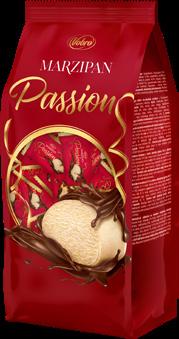

Marzipan Passion pralines are fancy sweets with a rich soul. Delicious dark chocolate envelops the marzipan filling, creating a hard-to-resist unique symphony of flavours. Every single praline is in hermetic flowpack wrapper Product is available in following formats: 180g gift format, 1kg bag and different bulk formats.
www.VOBRO.pl
NFC Juices, Juice Concentrates, Puree, Extracts and Flavors
We offer for our customers convenient forms of cooperation, many solutions of choosing packaging for all products: Industrial Use (B2B), HoReCa, Retail (B2C), also as Private Label. They are 100% natural, pasteurised right after being pressed. NFC juices are perfect for fruit juice beverages. We offer top shelf quality juices and concentrates that meet all demanding standards in compliance with the requirements of AIJN Code..

www.EWABIS.com.pl
Fresh & Fruity Exotic 1 kg

Limited summer edition of well-known and popular jellies. The taste of Fresh & Fruity Exotic will take you on a tropical journey. Four intense flavours will tempt every lover of the exotic fruit: mandarine and papaya with a pomegranate filling, lychee and mango with passion fruit filling. The product does not contain artificial colours or flavours.
www.WAWEL.com.pl
Gryzzzli
Gryzzzli, our bear-shaped chocolates are just one of a kind. These teddy bears full of sweetness have a magical power to attract ! Have a bite and enjoy the milky filling with grains of puffed rice. The unique sweetness of the chocolate bear will make you want to have it always with you. Every single praline is in hermetic flowpack wrapper Product is available in following formats: 200g bag, 1kg bag and different bulk formats.


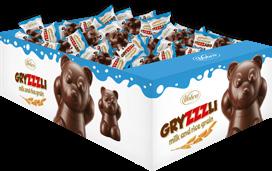
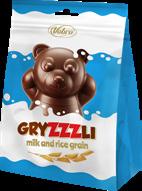
www.VOBRO.pl
Polish poultry meat

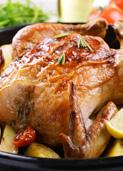

Polish poultry meat can successfully compete with the offer of world leaders by: competitive pricing – which you can expect from Polish producers and which becomes the key factor, when the product is of impeccable quality in relation to the price; exceptional quality and taste, resulting from full control of the production process “from farm to fork”; wide selection of poultry products: chickens, turkeys, geese, ducks and other types of poultry, offered as fresh meat: carcasses and different cuts (available also as frozen meat) and offal and preparations.
www.KRD-IG.com.pl
101 #discoverPolishproducts
BEEF BACON
SOKOLOW is proud to present to the consumers high quality beef bacon produced from selected meats.
Deep flavour, soft and juicy taste distinguish our bacon from wide range of other bacons available on the market. The products is ideal for frying and grilling.


www.SOKOLOW.pl
Cordon Bleu
Ease of preparation, convenience and time are the most important determinants of the popularity of convenience food. One of the most-chosen products from our ready-meals offer is Cordob Bleu - a delicate cutlet with ham and cheese. The meat used for its production comes from Polish chicken farms, controlled at every stage - “from farm to fork”. Thanks to the full control of the raw material, we can offer the highest quality product that can be quickly and easily prepared for a family dinner. It is enough to heat it in a pan or in the oven.

www.SILESIA.eu
BEEF BURGER
The secret of a delicious burger is a high-quality meat. SOKOLOW is glad to introduce redolent burger produced from soft, juicy and hand selected beef. Our burgers have ideal shape diameterand thickness. Burgers are individually deep frozen, so they keep flavour and nutritional value for long time without additives. Burgers are packed one by one in a special foil to guarantee the highest standards of hygene and minimize meat contact with humans during the production.

www.SOKOLOW.pl
Kabanos maestro
Perfectly dried, crispy and handy kabanos sausages are a great snack between meals. Maestro kabanos sausages mean not only excellent quality guaranteed by a high meat content, but also a certainty of taste guaranteed by experience and tradition. As an ambient product that does not require refrigeration - kabanos sausages are perfect as a handy snack, easy to take to school, work or on a trip. They are a perfect complement to the cold cuts board or a snack buffet. They are great for sharing - after all, we share what’s best.
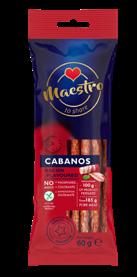

www.SILESIA.eu
TRANSPORT SHIPPING LOGISTICS
The TRANSAD company was established in 2006 and offers highest quality of transportation services, such as: refrigerated transportation, adjusting the type of semi-trailers to his individual requirements and FMCG goods shipping.

The fleet is always modern and meets the highest standards. It is constantly supplemented with various types of vehicles & semi-trailers so as to always be fully flexible and self-sufficient in the implementation of the tasks entrusted to the company.
www.TRANSAD.pl
102 #discoverPolishproducts
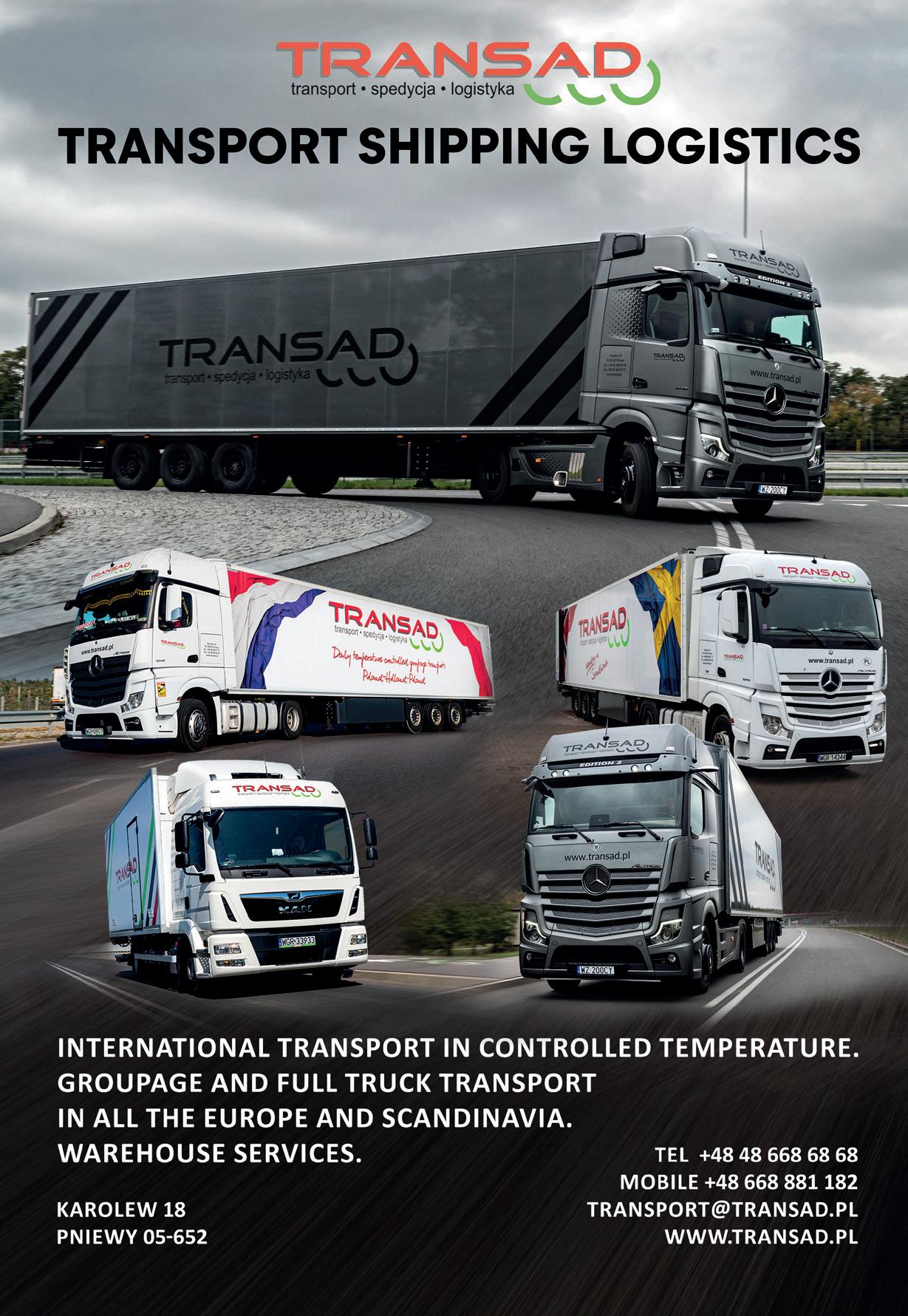
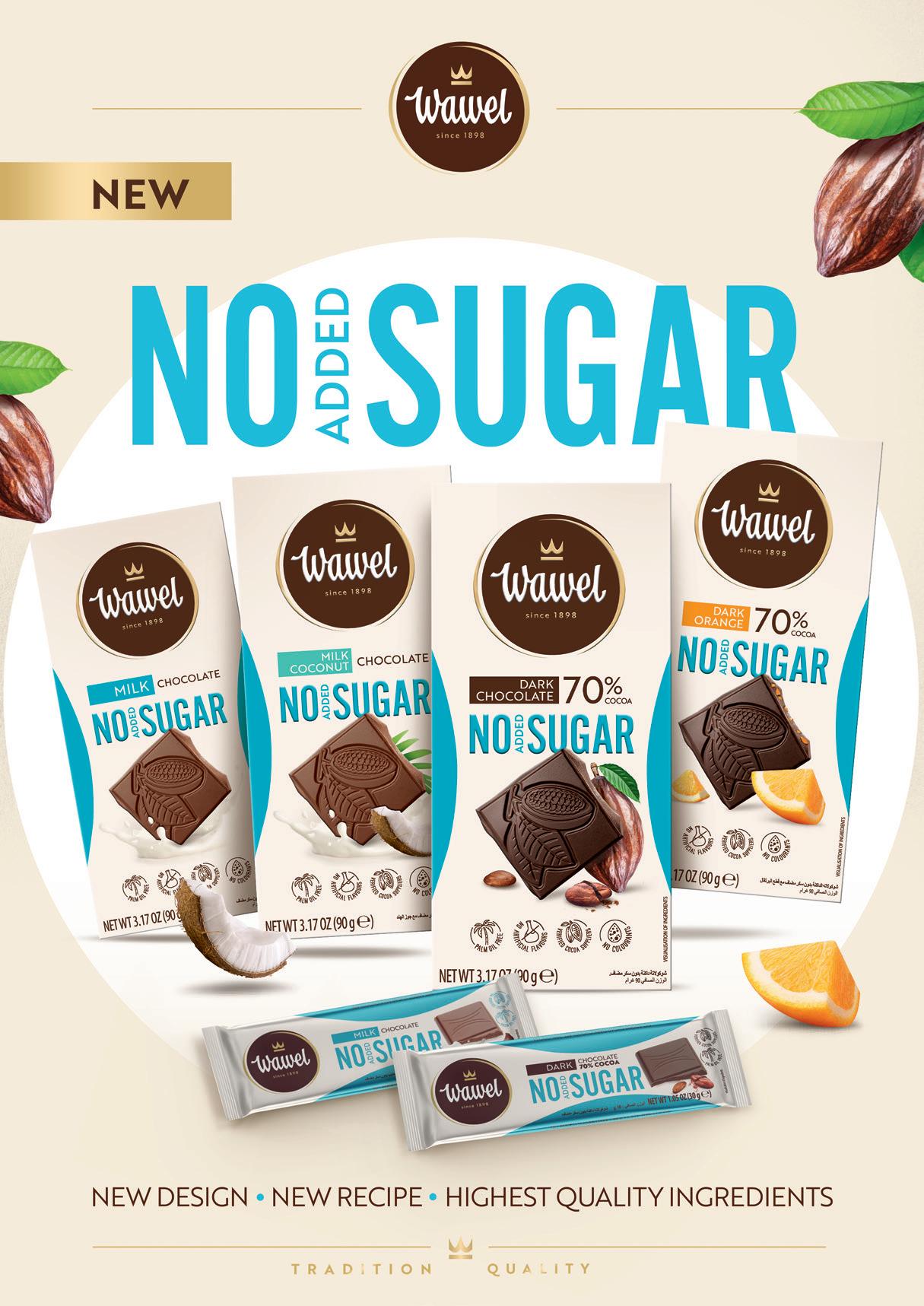


























































 Marcin Wroński Deputy Director-General of the National Support Centre for Agriculture
Marcin Wroński Deputy Director-General of the National Support Centre for Agriculture






































 Tetiana Gurnevych, International Sales Director
Tetiana Gurnevych, International Sales Director






























 Dariusz Sapiński President of the Board Mlekovita Group
Dariusz Sapiński President of the Board Mlekovita Group
 Jakub Nowak President of the Board JNT Group
Jakub Nowak President of the Board JNT Group















 Herbapol-Lublin
Herbapol-Lublin













 FMCG
FMCG













































































































































